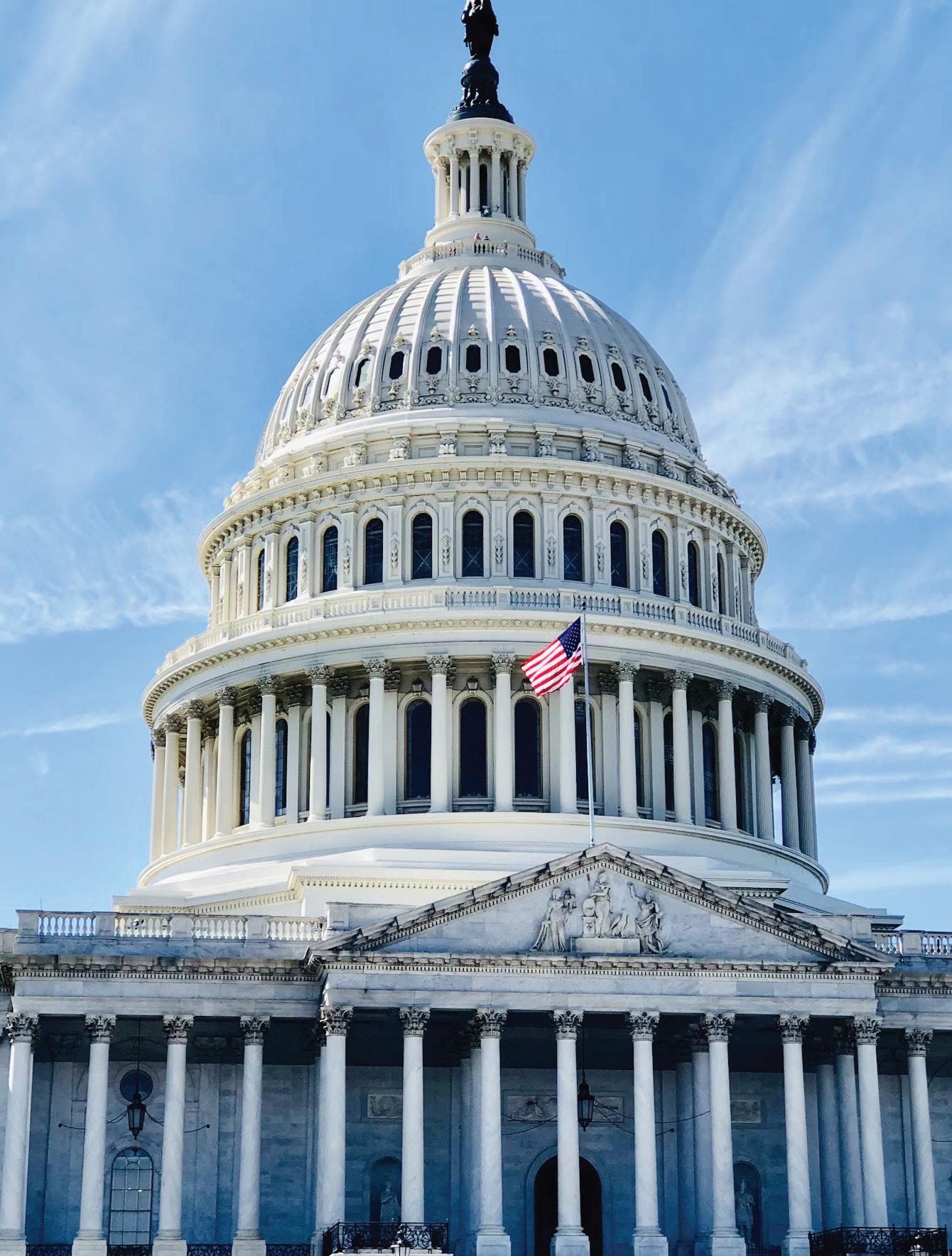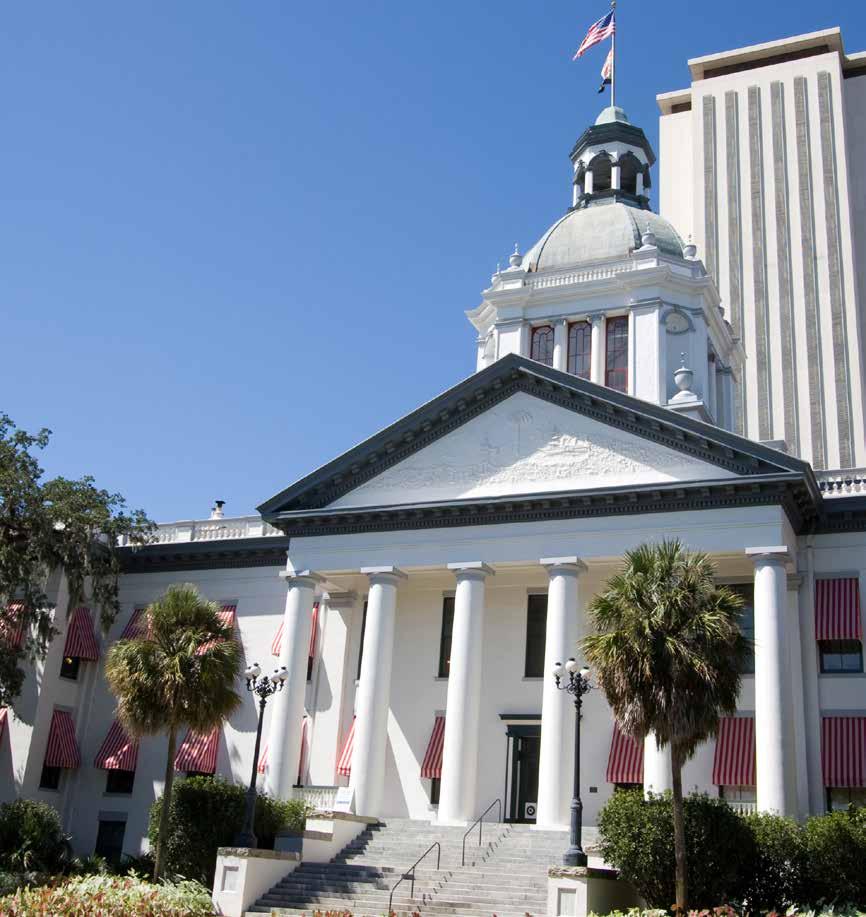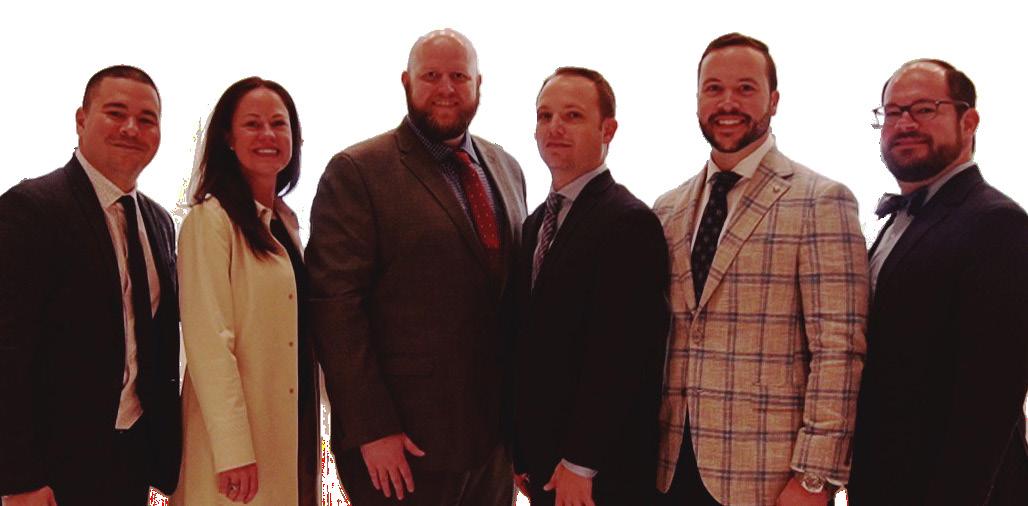LauraLoomer: LauraInHerOwnWords Loomer: InHerOwnWords





Florida's premier lobbying firm is now on Capitol Hill.
The combined influence of The Southern Group and TSG Advocates opens doors throughout the halls of power. Over the past 25 years, we've cultivated a winning team of expert business and political strategists, building dynamic relationships and expanding our proven influence at every level of government: local, state, and federal. When results matter most, clients trust TSG Advocates to deliver its renowned access.


As you embark on this edition of INFLUENCE Magazine, one of the first things you might notice is the photo on this page. It’s not an image of Michelle, Ella and I on our latest Disney cruise or holiday excursion.
Instead, the photo you are looking at is a behind-the-scenes shot of Chelsea Workman photographing Susie Wiles in her White House office.
In addition to being President Donald Trump’s Chief-of-Staff, she’s also a Florida Woman.
She was one of the brains behind Rick Scott’s political ascension and is credited with shaping Florida’s Republican renaissance.
Getting into her office now that she is what Trump describes as “the most powerful woman in the world” is no easy feat.
And that’s what this special edition of INFLUENCE Magazine is about.

It’s a deep dive into Florida’s takeover of Washington D.C. The Trump administration is packed with Florida politicos and other bigwigs from South Florida to the Panhandle.
So the edition is an introduction to those of you in D.C. to myself and my esteemed colleagues at Extensive Enterprises, which publishes this magazine, Florida Politics and Southeast Politics.
This photo exemplifies what sets us apart — earning trust. This photo doesn’t show paparazzi hounding the President’s right-hand-woman, it shows a talented photographer working under the Extensive Enterprises banner with Wiles by invitation.
That doesn’t happen by accident.
Power players in Florida politics trust us to understand there are many sides to a story, and to get those sides. And they trust us enough to invite us into exclusive briefings, top-level meetings and even the White House itself.
So let’s just call this edition our expansion to D.C., in which we bring readers more coverage of the White House, our Florida Congressional delegation and the governmental affairs and special relationship that now exists between our nation’s capital and the Sunshine State.
It begins with stellar work from reporters Jacob Ogles and Jesse Scheckner, who compiled what I believe to be
the most comprehensive database of Florida Men and Women working in D.C.
We have also included interviews with lobbyists who have taken the Trump train from Florida to D.C.
And not to be outdone by ourselves, we’ve also included a feature with provocateur Laura Loomer, an inclusion that may come as a shock to some, but a hard interview to land that again demonstrates the trust we cultivate.
There are also profiles from the other side of the aisle, with U.S. Rep. Jared Moskowitz, and from those who have seen politics in recent months at both the state and federal level, such as new U.S. Rep. Jimmy Patronis.
While it will be hard to follow this stellar edition, we are also already looking forward to assembling the next one, which readers will rejoice to hear will include our INFLUENCE 150 in the new year.
Until then, thank you for reading, and especially for trusting.
Peter Schorsch Publisher Peter@FloridaPolitics.com
PUBLISHER Peter Schorsch
DIRECTOR OF Phil Ammann OPERATIONS
EDITOR-AT-LARGE
Ryan Nicol Janelle Irwin Taylor
CREATIVE DIRECTOR Christy Jennings
CONTRIBUTORS
Rosanne Dunkelberger Brendan Farrington
A.G. Gancarski Ryan Nicol Jacob Ogles Jesse Scheckner Drew Wilson Alex Workman
STAFF PHOTOGRAPHERS
Allison Davis Colin Hackley Abby Hart Alex Workman Chelsea Workman
DIGITAL SERVICES Daniel Dean MANAGER
SUBSCRIPTIONS
Subscribe at InfluenceMagazineFlorida.com

INFLUENCE Magazine is published quarterly by Florida Politics, LLC, a subsidiary of Extensive Enterprises Media, LLC. 204 37th Avenue North, St. Petersburg, Florida 33704. INFLUENCE Magazine and Extensive Enterprises Media are not responsible for unsolicited manuscripts, photography or artwork. Editorial contributions are welcomed and encouraged, but will not be returned. INFLUENCE Magazine reserves the right to publish any letters to the editor. Copyright November 2025, Extensive Enterprises, LLC. All rights reserved. Reproduction in whole or in part without written permission is prohibited.


Ken Granger: former
Deputy Chief of StaffandPolicyDirectorintheGovernor’s Office, formerDMS Chief of Staff, Deputy Secretary,andCIO.
JoeMongiovi:formerenterprisesolutions group director, extensive public and privatesectorexperienceasanenterprise and datacenterarchitect


The daily work of government creates immense value in the market. We capture it for you.
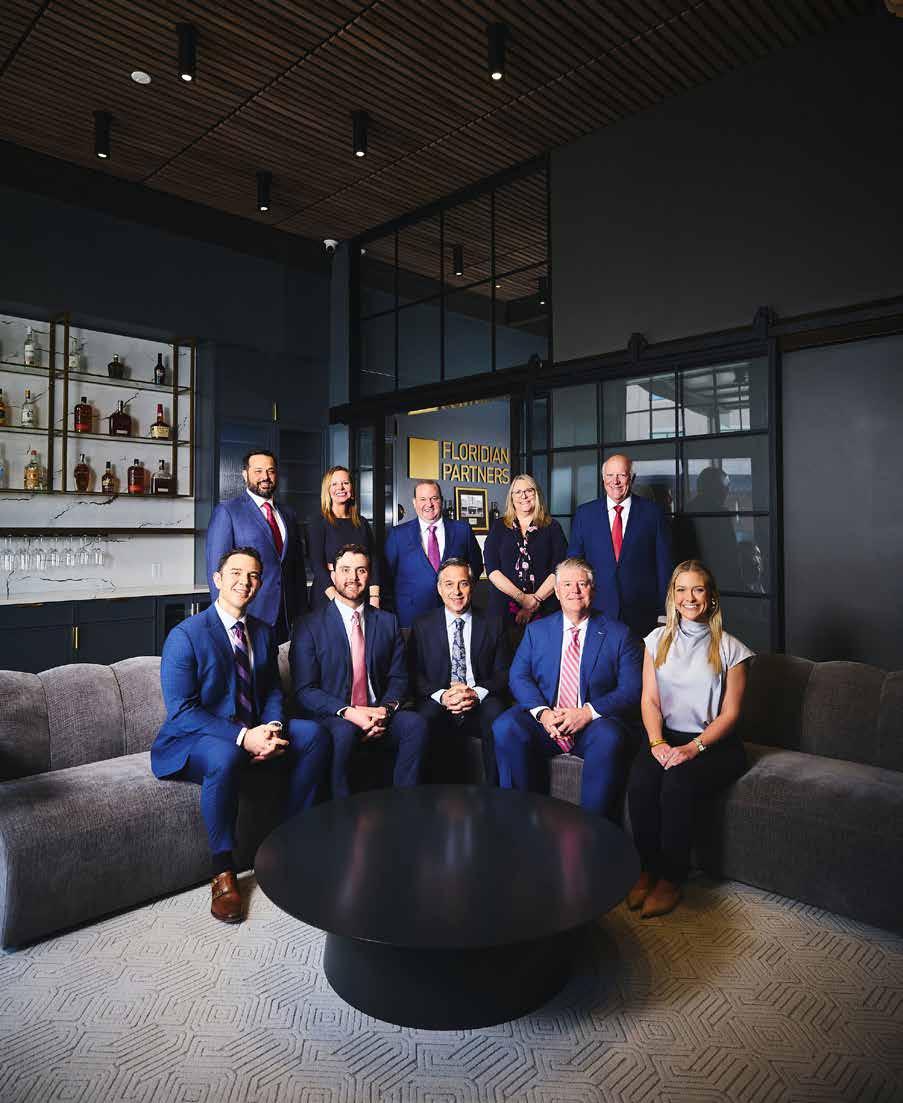
Celebrating 25 Years & Gearing up for Legislative Session


Floridian Partners celebrates 25 years as a trusted name in Florida government affairs, and 2025 marks a new chapter in its storied history. With a newly renovated Tallahassee office and fresh faces on board, the firm continues to invest in the success of its premier client base.
“Our clients’ needs are constantly growing, and so are we.” – Managing Partner Charlie Dudley
As the 2025 legislative session approaches, Floridian Partners welcomes Director of Legislative and External Affairs Hunter Flack, a Florida Senate veteran, and Government Affairs Coordinator Ella Bevis, an alum of the James Madison Institute. The firm also proudly announces a strategic partnership with adviser Michael Cantens, principal at Miami-based Flagler Strategies.
The firm’s foundation remains strong under Managing Partner Charlie Dudley and Senior Partner Jorge Chamizo. Guiding its future are Partners George Feijoo, Melissa Ramba, and Toby Philpot, leading practices pillared on financial services, business regulation, and healthcare, respectively. Kelly O’Neal is the team’s backbone as Director of Operations, while Gary Guzzo, the team’s Dean, is its heart – providing trusted counsel to clients and policymakers alike.
“For years, Floridian Partners has been an extension of our team. Our membership relies on their collective strength and broad expertise to advance policy priorities.” – Brewster Bevis, CEO at Associated Industries of Florida
With a mix of seasoned professionals and fresh talent, the firm is well-equipped to navigate the challenges and opportunities of the upcoming session.
Known as The Ritz Theatre in the 1930s, the Floridian Partners building underwent a transformation in 2024. In collaboration with Architects Lewis & Whitlock, the renovation added modern functionality while preserving the building’s historic charm. This duality is evident throughout the office, most strikingly in the cantilevered balcony that nods to the theatre’s original canopy.
“Floridian Partners has consistently delivered wins for us from day one. Their strategy and service are second to none, and this beautiful space raises the bar even higher.” – Javier Correoso, Head of Public Policy & Communications, US South at Uber
This blend of legacy and innovation mirrors the firm’s approach to advocacy—and retaining the Ritz name adds the touch of fun and glamour its clients have come to expect.


“We look forward to sharing the new space with our friends and colleagues in the process.” – Senior Partner Jorge Chamizo
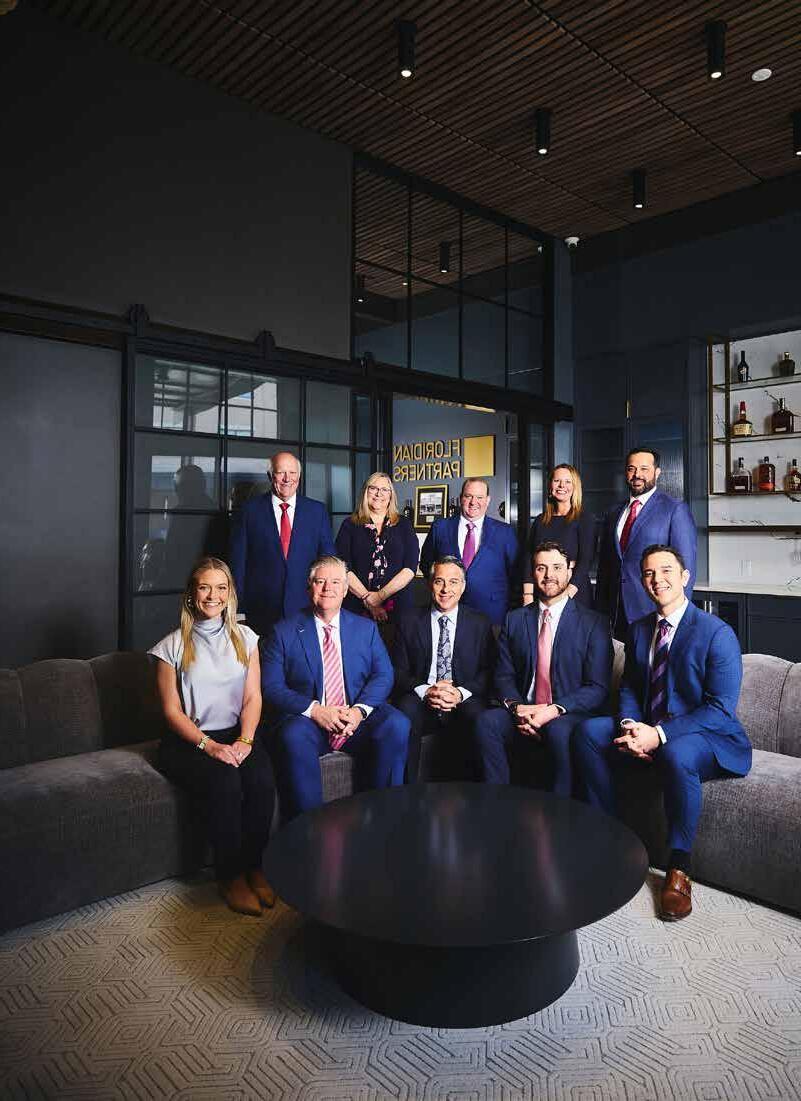

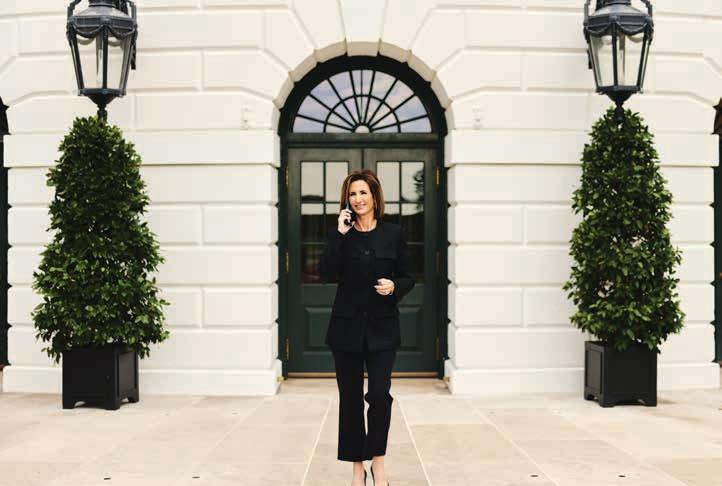
Meredith O’Rourke isn’t a household name, but President Trump’s national political finance director is a fundraising powerhouse with entrée into the Oval Office.
When it comes to lobbying, li’l ole Tallahassee has an outsized presence in Washington. Nationwide, Florida firms are at the topranks for revenue and poised to serve as models for the future of advocacy.
After President Trump decamped from New York for warmer climes, the Sunshine State has become the nexus of his second administration. Florida Men — and Women — now serve throughout all levels of government in D.C. and around the world. Those seeking influence provide a bonanza for Florida lobbyists who have long-standing relationships with those in power.
After a hearty endorsement from the President, Joe Gruters was elected as chair of the Republican National Committee without opposition. While still serving as a state Senator, Gruters is now laser-focused on the historically difficult task of maintaining the GOP’s majority in the 2026 Midterm Elections.
She’s been deplatformed by social media, kicked out of special events and banned from ride sharing services for her controversial political takes, but activist/provocateur Laura Loomer has the ear of Donald Trump and that’s why her name is still in the news.

Specializing in multi-state advocacy campaigns that win.
90 Ballard Partners’ Ascent Climbing steadily for 27 years, this Tallahassee firm first conquered the Florida lobbying scene and is now the top-grossing lobbying shop in the nation, with a footprint spanning the globe.


Using humor and an open mind, Democratic Rep. Jared Moskowitz navigates a “dysfunctional” Congress with aplomb.



Front cover: Cover captured at the Florida House on Capitol Hill, Florida’s Embassy in Washington, D.C., which has been welcoming Floridians in the nation’s capital city as America’s only State Embassy since 1973. Daniel Diaz-Balart (TSG Advocates), Melissa Cuipers Blake (Brownstein), Omar Franco (Becker), Craig Carbone (Continental Strategy), Elizabeth “Blair” Hancock(Gray Robinson), Dan McFaul (Ballard Partners). Photo: The Workmans




RONALD L. BOOK Founder & CEO

KELLY MALLETTE Senior Director of
For over 50 years, Becker has played a prominent role in Florida politics and is proud to have evolved to be one of Florida’s top lobbying firms in Washington. We look back at our rich history and salute our friend and former colleague, Marco Rubio, as the 72nd U.S. Secretary of State.
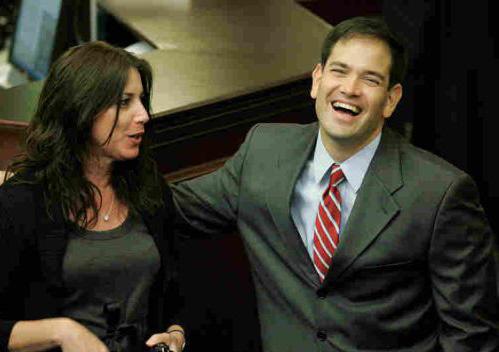


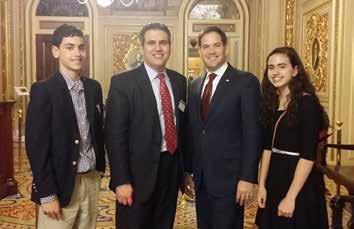
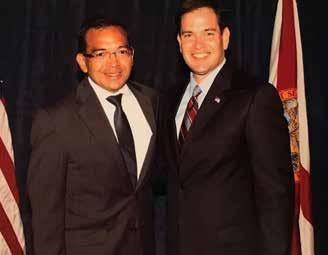
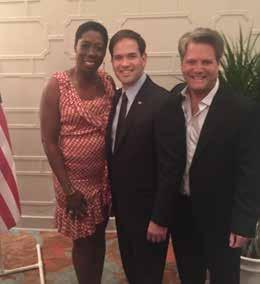
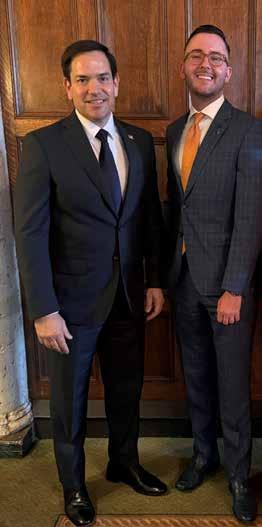


How the Sunshine State tackled abuses in the drug treatment industry — and what Congress needs to do to finish the job
By Rosanne Dunkelberger
With the scourge of drug addiction, there is surely an especially hot seat in hell for those who would tout a powerful narcotic as nonaddictive. That’s doubly true for others who prey on addicts and their families by offering services designed to milk money from insurance companies and actually encourage a cycle of recovery and relapse.
In his new book, “Fighting the Florida Shuffle: The Inside Story of Corruption in the Drug Treatment Industry and How One Community Found the Solution,” author Dave Aronberg takes a deep dive into opioid drug problems and a flawed drug treatment system — while proposing specific actions to alter well-intentioned federal laws being abused by bad actors.
When it comes to drug abuse and treatment, the Palm Beach County native knows of which he speaks. One of his first assignments at the turn of the century as an assistant Attorney General under Florida Attorney General Bob Butterworth was to investigate Purdue Pharma, which by then had been marketing the dangerous, addictive “new” pain-relieving drug, OxyContin, for about five years.
OxyContin is a reformulation of oxycodone, a drug that has been used to treat pain for years.
“What Purdue Pharma did was (take) oxycodone and put a time release coating over it, allowing you to have a smooth delivery of 12 hours of pain reliever. Wow, great, right?” he said. “Except the coating didn’t work that well, so you got a bigger pop at the beginning. And if you chewed through the coating or if you dissolved it in water, you got this massive hit right away.
“That’s a game changer for those who want to get high. But also, when it was sold like it was Advil, it led to the addiction of millions of Americans who are going to their doctors looking for pain relief and



“Florida went from the weakest laws in the country to the strongest laws in the country. We went from having a slap on the wrist for patient brokering to making it into a felony.” — Dave Aronberg
the doctors were giving them this pill that should only be used as a last resort or if you’re in hospice care. And so that’s how the opioid epidemic started,” he added.
“It was man-made; it was not inevitable. It was created by corporate malfeasance and professional greed and regulatory failure, and political apathy. And now here we are, left to pick up the pieces.”
After a stint in the Florida Senate, Aronberg would campaign for Attorney General on the state’s drug crisis, but was eliminated in the Primary. Republican Pam Bondi, who ultimately was elected as Florida’s Attorney General in that race, reached across the aisle to tap him as the state’s “drug czar.”
“It was not easy for her to do that, but she did, and we shut down pill mills … and we got the PDMP (Prescription Drug Monitoring Program) passed,” he said. “We were
able to make some real progress when we worked together in a bipartisan way. Unfortunately, when you eliminated the supply of these drugs, the demand didn’t go away. So people … went from oxycodone to heroin. And then everything spiked with fentanyl.”
Starting in 2013, Aronberg would go on to serve three terms as the State Attorney for Palm Beach County, where drug problems were again top of mind, as his home county became a hotbed of criminality relating to substance use disorder, what Aronberg termed the Florida Shuffle.
As State Attorney, Aronberg created a Sober Home Task Force to address the crisis, which had great success and is now a model for the rest of the state and around the nation.
“Florida went from the weakest laws in the country to the strongest laws in the country. We went from having a slap on
the wrist for patient brokering to making it into a felony (and) making a one-way plane ticket into a felony,” he said. “It’s amazing how a pair of steel bracelets will influence someone’s behavior.”
The book, coauthored with Dr. David Campbell, includes anecdotal stories of young adults and their families lured by promises of sunshine, serenity and sobriety, only to discover themselves trapped by a system of treatment centers and sober houses that prioritized money over recovery. Many of those sober houses featured kickbacks for placements and unnecessary and overpriced testing — at worst, they were home to criminal abuse resulting in overdose or death.
Campbell did most of the interviews, many of them featuring parents of young adult, addicted children with heartbreaking stories, often with unhappy endings. The
orthopedic surgeon had a special kinship with his subjects. His younger brother died of an overdose when he was 54 after years of drug and alcohol addiction, and the story is told in the book. A commercial fisherman, Jerry was prescribed OxyContin and Percocet for years for chronic pain from injuries sustained in his dangerous profession. His brain was obviously affected by the drugs he had taken for so long, but his first overdose — when he was able to find fentanyl patches prescribed for his terminally ill mother — was his last.
The book includes a “how-to” section for helping families find an ethical treatment center.
Aronberg’s contribution to the book was a victory lap, congratulating Florida as one of the first states to curb the flow of narcotic prescription drugs and to pass laws that shut down the bad actors in the recovery industry. Florida’s regulatory laws have been used by other states as a model.
Problems still exist in the system, but they won’t be solved at the state or local level — or even with money — because well-intended federal laws favored by Democrats are throwing up roadblocks to
ultimate success, Aronberg argues.
“It’s the ACA, the ADA, HIPAA, which keeps parents from knowing where their kids are going when their kids are now all of a sudden sent down to Florida with a one-
“I’ve seen so many families wrecked and yet there are people out there who think … drug addiction is a moral failing.”
way plane ticket. If you’re over 18, your parents don’t get to know.”
He answered Democrats’ fears that changing laws might lead to the Affordable Care Act and others being completely












overturned, saying, “don’t let perfect be the enemy of good.”
Aronberg shows great sympathy for those who are addicted as victims of brain disease.
“I’ve seen so many families wrecked and yet there are people out there who think … drug addiction is a moral failing, (that) people make the choice to get high and they deserve what they get,” he said. “That is so myopic and also so heartless because most of the people in the throes of addiction today got there because they were given a prescription by a doctor (and) were told that the prescription was safe and nonaddictive — when neither was true.”
These days, Aronberg has his own legal practice (Mike Tyson is a client), is a strategic consultant for Capital City Consulting, and migrates between MSNBC and other channels and podcasts weighing in on the legal issues du jour.
“I love doing it,” he said of his commentary gigs. “It fills my political void of not being in office. I get to talk about issues without having to take bad votes. So I love the whole media business.”
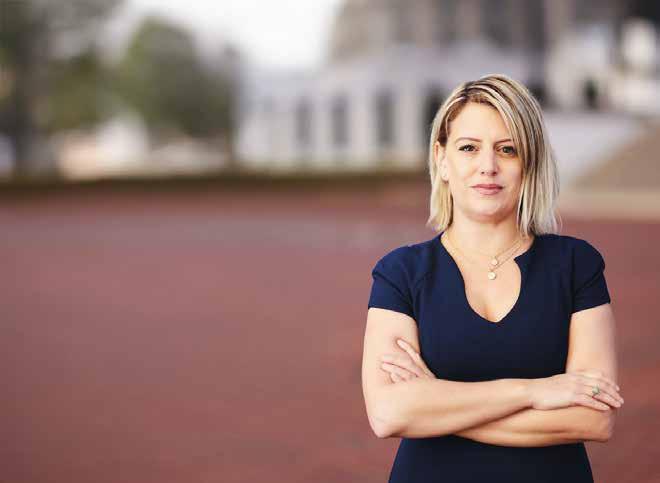

DC’S IMPACT.
YOUR ADVANTAGE.

Nick Iarossi has a track record of influence in Florida at leading firm, Capital City Consulting and now he’s also on the ground in Washington, DC at powerhouse firm, BGR Group. A proven team that knows how to navigate complex policy landscapes, foster meaningful partnerships and bridge state and federal priorities.


By Daniel Diaz-Balart
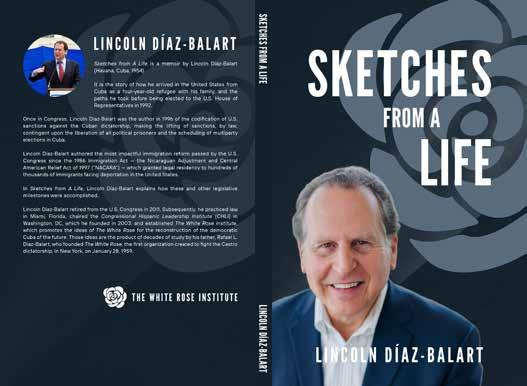
Díaz-Balart (1954-2025) led a unique life. Readers of his newly published memoir, “Sketches from A Life,” will probably find it difficult to place him and his politics (he was a Member of the U.S. House of Representatives from 1993 to 2011) within the confines of a clearly defined, predetermined ideological box. Part of this is, without question, attributable to his upbringing and family history, and the exceedingly unique circumstances of his life.
When he was just 4 years old, an event took place that would shape the rest of his life.
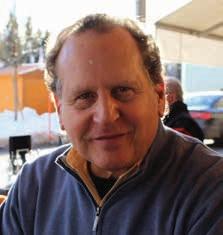
year. Rafael and his family were received warmly by French officials. His future was bright and extremely promising. Cuba was experiencing significant problems at the time, there can be no doubt. But peaceful, political solutions were within reach, and Rafael – the master negotiator and committed democrat – was certain to play a key role in charting Cuba’s future.
And then, in an instant, it was all gone.
On the morning of Jan. 1, 1959, my grandparents received word that the unthinkable had occurred. Fulgencio Batista had abandoned Cuba, effectively handing the country over to the ruthless dictator-to-be, Fidel Castro. In an instant, my grandfather became a man without a country for him and his family to call home. Castro’s thugs murdered friends and members of our family, and burned our family home in Havana.
Rafael knew what a future under Castro meant for the Cuban people. They used to be, after all, close friends, and even family by marriage. Rafael knew that his former brother-in-law was a violent psychopath like no one else who had ever governed Cuba, and that Castro would never relinquish power. Rafael understood, right away, that his beloved homeland was lost, and doomed to destruction.
Adding to the gravity of the situation, Rafael was virtually alone in this understanding. At that moment, and for the months and years to follow, practically the entire world applauded Castro’s ascension. One can only imagine the solitude and the sorrow.
But then Rafael did what so many he-
roic Cubans have done throughout the 66 years of brutal tyranny that has plagued Cuba: He began to fight. In January 1959, he moved his family to New York City, convinced that the fight against Castro needed to come from the world’s most important city. There, on Jan. 28, 1959, he founded the first-ever anti-Castro organization: The White Rose.
In the years that followed, rebuilding a life in exile led my grandfather to move his family around so often that Lincoln would attend five different schools during his seventh and eighth grade years alone. Lincoln met my mom in high school at the American School of Madrid, attended the small liberal arts university, New College, in Sarasota (he was the only Cuban American student and was elected Student Body President), and studied law at Case Western Reserve in Cleveland. A college semester studying at Cambridge University profoundly impacted him. Finally, he moved to Miami in 1979 to begin his professional and political career.
Despite his unorthodox upbringing, Lincoln developed something along the way: a profound love for the United States of America.
My father, Lincoln (and, years later, his brother Mario) inherited the torch of service and dedication to democratic principles from their father. Together, the two brothers have carried that torch, fighting to strengthen and protect the United States while also keeping alive Cuba’s right to be free. For eight years, they represented adjacent districts in Congress, and col-
lectively have served more than 40 years in the U.S. House of Representatives.
The events of Jan. 1, 1959, are among countless impactful moments that shaped Lincoln Díaz-Balart. He had a front-row-seat to momentous events and characters in history (in 1965, for example, at 10 years old, he met The Beatles in a hotel lobby in Madrid). The result was a truly unique individual and public servant, one to whom traditional political labels have never applied.
Throughout Lincoln’s 18 years in Congress, if you just read about his work in English-language-press, you would have been convinced that he was a “far-right” hard-liner and zealot. Then again, we’re talking about the author of NACARA (1997), the most sweeping immigration legislation passed by the U.S. Congress, to this day, since 1986. In 1998, together with his colleagues Carrie Meek and Alcee Hastings, Lincoln co-sponsored legislation that gave similar protections to our
Haitian neighbors.
His admiration for Ronald Reagan led him to become a Republican in 1985, and he was without question a loyal member of the GOP. But his unique sensibilities also led him – as a freshman Congressman, no less – to refuse to sign his friend Newt Gingrich’s historic Contract with America in 1994 because of a provision that discriminated against legal immigrants in the U.S. (Lincoln had the provision overturned through legislation in 1997).
He was unshakable in his commitment to human rights, and steadfast in his opposition to tyrannies throughout the world, especially those in our hemisphere. Sanctions against the Cuban dictatorship are enshrined in U.S. law, and can be lifted only after all political prisoners are released and a transition to democracy has taken place, because of his tireless work. While in Congress he was, without question, Fidel Castro’s most formidable foreign policy foe.
He was also a stalwart supporter of the American worker, one of the few House Republicans to vote against GATT (General Agreement on Tariffs and Trade) and NAFTA (North American Free Trade Agreement).
One of his proudest and most lasting contributions was founding the Congressional Hispanic Leadership Institute (CHLI) in 2003 together with his brother Mario and his dear friend, former Congresswoman Ileana Ros-Lehtinen. The nonprofit continues to thrive as one of the few remaining truly bipartisan organizations in Washington and has presented hundreds of young U.S. Hispanics with often life-changing fellowships.
Jesus said, “For where your treasure is, there your heart will be also.” Lincoln’s treasure, and his heart, was in service of others.
The sum of all these unique parts, and many more (as you’ll find in this book), was Lincoln Díaz-Balart. I thank God every day for the honor of having been his son.

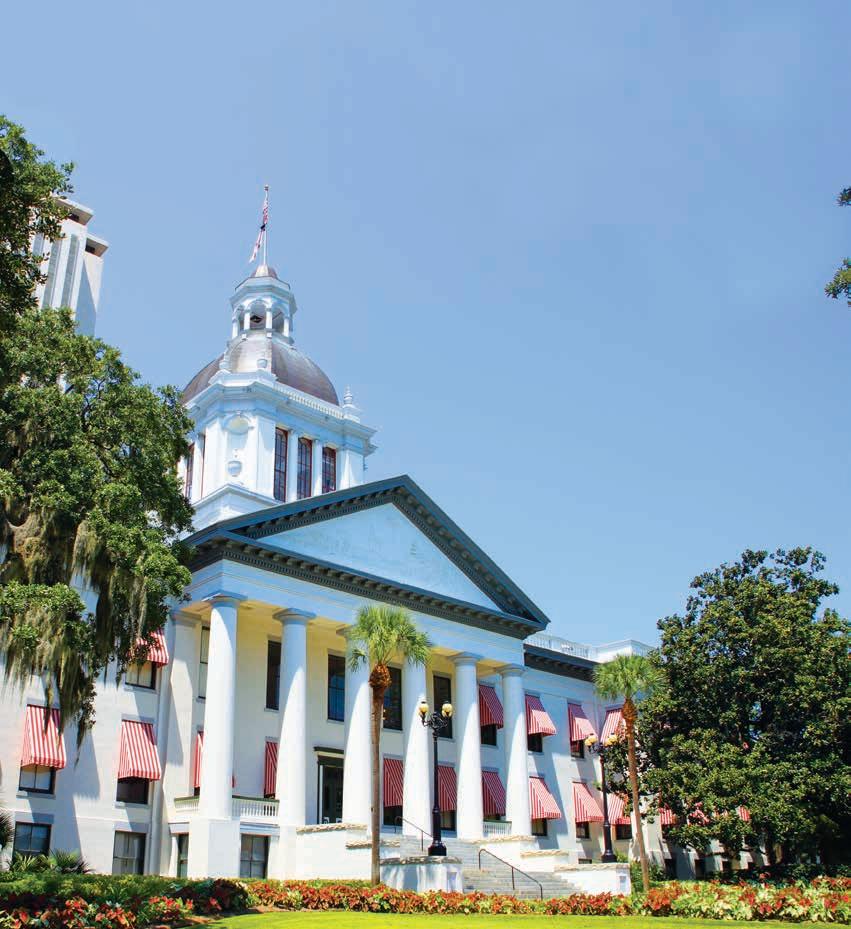

Breaking the Hollywood fiction narrative: Films that have gotten the D.C. process right
Here are 5 must-see films...
By Drew Wilson
Washington is one of Hollywood’s favorite settings, but most portrayals fall flat. Every now and then, though, a film gets close to the real thing — the pressure, the people and The Process. These movies capture the forces that actually drive decisions, the way information travels, and the subtle power plays that rarely make it into the script notes.


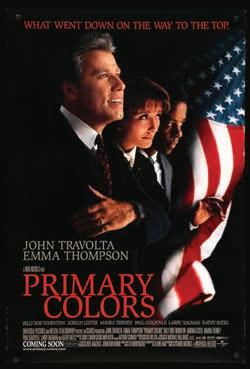




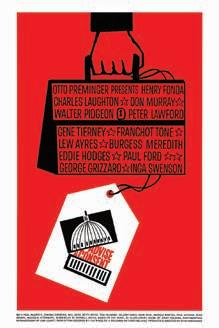
Based on a thinly veiled Clinton world but never chained to the biography, “Primary Colors” nails the anthropology of a modern presidential campaign. It gets the moral compromises right — not the cartoonish ones, but the sideways, incremental trade-offs. The film understands how consultants talk when the press isn’t around, how loyalty forms and fractures, and how a candidate’s personal gravitational pull warps the ethical field around them. It’s messy, funny, occasionally bleak, and deeply honest about the type of people who run for President and the ones who follow them into the fire. D.C. feels real here because the ambition feels real.
“Wag the Dog” remains the gold standard for political spin — a farce that feels like reportage because the characters speak fluent crisis management. The film gets the rhythms right: the improvisational strategizing, the tactical leaks, the media ecosystem reacting faster than anyone can steer it. Its genius is showing how power operates through narrative. While the premise is outrageous on its face, the machinery behind it is shot with documentary-level clarity. You don’t watch “Wag the Dog” and think, “This could never happen.” You watch it and think, “Someone in D.C. tried this and just didn’t have Dustin Hoffman.”
“The Contender” understands the confirmation process at the cellular level. It’s a political thriller built on recognizable human behavior: staffers gaming vote counts in real time, committee members burnishing their narratives for C-SPAN and the White House weighing principle against practicality. Where most movies treat the VP slot as a narrative prop, “The Contender” gets into the weeds. It’s one of the rare political films where the mix of leaks, lobbying and personal destruction don’t feel overly heightened, but just right.
“Advise & Consent” is old-school Washington, but the bones of the place haven’t changed. This one captures the Senate as an institution, including its devotion to procedure that often matters more than the underlying stakes. Its take on confirmation fights is still recognizable: Senators managing their own ambitions under the guise of constitutional duty, committees acting as both fact-finders and political theater, the White House projecting confidence while sweating vote counts. It’s a portrait of D.C. when the furniture looked different but the motivations didn’t, and it remains one of the cleanest depictions of how fragile the whole enterprise can feel.
“Thank You for Smoking” may be a satire, but it’s one of the sharpest films ever made about lobbying because it understands the job’s true currency: persuasion tailored to the audience, not the principle.
The movie nails the ecosystem of influence — the coalition dinners, the journalist alliances, the creative policy framing exercises. It captures the amoral flexibility required to survive the job without turning characters into villains. Most lobbyists will tell you they recognize more truth in Aaron Eckhart’s nicotine-warrior monologues than in any earnest Hollywood portrayal of advocacy. D.C is a city of narrative combat, and “Thank You for Smoking” gets the fight choreography right.

“Dave” is an undeniably charming movie … and absolutely deranged as a portrayal of Washington. The idea that a cheerful temp with a good heart could seamlessly impersonate the President, reinvent the West Wing, balance the budget and charm Congress into behaving is Grade-A political fanfiction. It treats governing like a school play and the presidency like a vibes-based community service gig. In the real D.C., you can’t change a comma in a press release without triggering nine factions and a turf war. Dave’s vision of Washington is sweet and earnest, but completely unrecognizable to anyone who’s ever watched a single committee meeting.










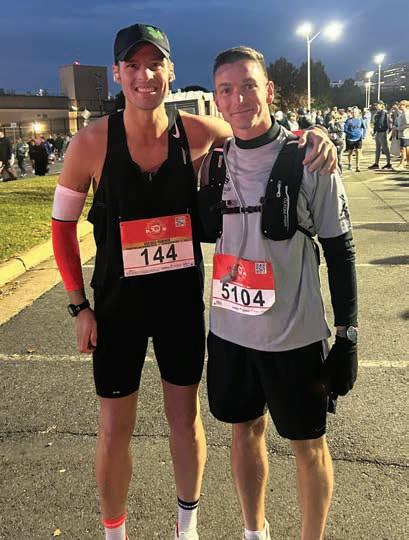
In Florida politics, endurance isn’t just a virtue — it’s survival. Few understand that better than Christian Minor, Tallahassee co-Chair at Converge Public Strategies, and Peter Cuderman, former Legislative Affairs Director to Gov. Ron DeSantis and now a master’s student at Harvard.
The two first crossed paths in the Governor’s Office. Minor had come to Cuderman to voice a concern about a legislative issue, a typical Tallahassee exchange that turned into an unexpected friendship. They stayed in touch after Cuderman left state government and Florida, trading messages about policy, life and running.
Fast-forward to this Fall, and those conversations led them both to Washington, D.C., for the 50th Anniversary Marine Corps Marathon — a 26.2-mile test of grit that mirrored their years in Florida’s political trenches.
For anyone who has survived a 60-day Legislative Session, the parallels are obvious: the long hours, with the exception of caffeine-fueled nights, the parallels are obvious: The long hours and the steady pacing required to outlast the chaos.
“Both demand the same things,” Minor said. “Discipline, mental toughness, and knowing when to push and when to hold back. Only the strong cross the finish line — in Session or in a marathon.”
And running for the two friends has become a catharsis.
“Running became my way of staying grounded. It gives you perspective. It’s time to think — and sometimes, not think at all,” said Cuderman, who now gets in his morning jogs along the Charles River.
Though they trained separately, the two kept in touch about their progress, right up until race day in late October. They came together again in Arlington as part of Team Whiskey Valor, raising tens of thousands of dollars for veterans’ mental health and substance use disorder programs.
Both were first-time marathoners. Both finished.
Minor took the prize, between the two, with an impressive finish time of just over 3 hours and 1 minute. Cuderman finished about an hour behind, still smiling as he crossed the finish line.
So how do two guys who have never run a marathon before conquer one of the biggest endurance feats there is? Well, obviously through extensive training. But also by having the most effective gear.
From anti-chafing balm to carb gels, there are a lot of items the novice runner might not consider ahead of a big run.
With the right gear, the duo has found that running is among the best ways to explore new cities.
“Whether I’m in D.C., New York or Key West, a morning 10-miler tells you everything about a place — the rhythm, the people, the neighborhoods,” Minor said.
So whether you’re in Tallahassee, Miami or up in D.C., lace up and go with Minor and Cuderman’s go-to gear recommendations.

Fleet Feet
Tallahassee equips runners of all distances with everything they need to chase their next finish line



PROSTRETCH
OOFOS




By Brendan Farrington
Butterworth’s has been touted as the hot spot for MAGA elite by news organizations ranging from Axios to the Washington Post – so much so that the Post reviewer admitted choosing two Republican friends to join him on his first visit.
One of its investors is a former Breitbart editor, and the likes of Steve Bannon have hosted parties there, which has caught the attention of Donald Trump-loving Republicans. I wanted to see what all the fuss was about. But in the event politics were overwhelming, I didn’t want to be a journalist who spent decades in mainstream media alone in a den of people who vilify the press.
So, I too invited a Republican friend for my first visit. Though to be honest, she’s more foodie than MAGA, and regardless of politics, I trust her palate and enjoy her company and sense of humor. I knew she didn’t care about who among the who’s who have dined there. When she texted me with excitement after reading the menu online, I had a good feeling about dinner that evening.
Earlier in the afternoon, I walked by the Capitol Hill restaurant just as lunch was wrapping up. Three men in power suits were standing in front talking on their cell phones, all appearing to be on important calls (or at least projecting that appearance).
So, I was a little surprised that evening when I walked in and had no sense of politics whatsoever. It was a warm, cozy room that looked like it was furnished from a Victorian era thrift shop, both in its mismatched chairs and the framed art. That’s not an insult; it was a cool look with a good vibe that felt like walking into a late 19th-century living room.
We were seated in a small nook against the front window overlooking Pennsylvania Avenue. While not a private room, it had a more private feel than tables in the middle of the room. Now it was time for the real test: Is Butterworth’s worth the hype?
It was. Like the room itself, the menu was far from bland. I didn’t have the luxury of multiple visits to try everything on the menu, so choosing wasn’t easy. I consider myself an adventurous eater and I enjoy cooking. When I dine out, I gravitate



This is Bart Hutchins. His job is to work with interesting people to make interesting food and attract more interesting people. Hutchins did a stint in Florida politics back in the 2010s. A few years later, he walked into a restaurant called Eatery A in Iowa and offered to work for free. It was his way out of politics before he moved to D.C. in 2017.
He wants to challenge himself to create the things that are deemed impossible. He recognizes that flavors are often based on the area in which they originate. Soil and nutrients vary from region to region, so Hutchins wants to source the best ingredients from the places near him. Butterworth’s uses produce from local farmers in Virginia and Pennsylvania and the menu changes every day.

Bone Marrow. Escargot. Sourdough. You can get a steak anywhere. But how can you make a protein the star of a plate using of something that most people throw in a stock pot or often the trash? Enter the bone marrow. It’s rich with umami flavor that melts in your mouth. Paired with the saltiness of the escargot and some thick toasted slices of tangy sourdough, it’s a must order.
Badger Flame Beets. Your typical red beet can have a pungent earthy flavor (that some love and some hate), but what if you could have the vegetal flavors without the strong aftertaste of the ground?
Irwin Goodwin figured out how to make that happen with the Badger Flame Beet. A nod to the University of Wisconsin (go Badgers), the mild sweetness of the beets paired with the bright tartness of citrus is a surprising delight when you bite into this dish. Whether you like beets or not, it’s worth a try.
Lamb Tartare. Fois Gras. Onion Rings. We continue the journey with the Butterworth’s spin on lamb tartare. A hearty mix of lamb, herbs and aromatics creates the base for a tower of crispy onion rings. The dish is topped with a perfectly seasoned and seared fois gras that melts when you cut into it. The juxtaposition of textures makes the photos look good enough to eat, but it’s an explosion of flavor that you’ll savor in every bite.


toward food I’d be foolish to try to cook at home, either because of the ingredients or preparation.
I was tempted by the lamb heart Bolognese or the pork cheeks with pureed potatoes and horseradish –definitely not dishes I’ve prepared for myself. I ultimately decided on
the bone marrow with escargot and sourdough bread. My friend ordered the duck breast.
For starters, I had the raw oysters and my friend chose the Welsh rarebit – a cheese and beer sauce over toasted bread, and a bargain at $5. The oysters came with a slightly chunky, salsa-like topping
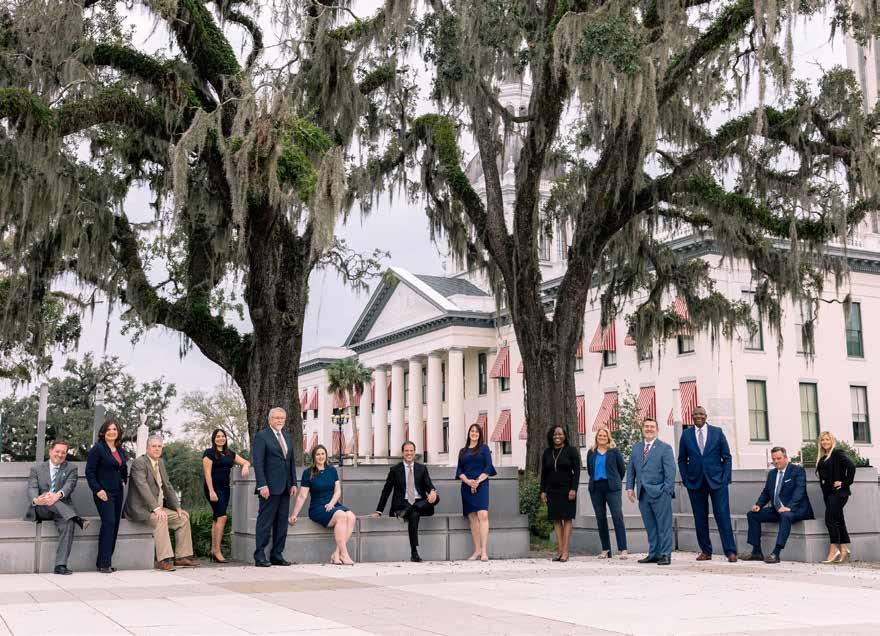
WE HIT TARGETS WITH STRATEGY AND PRECISION.
With high-level relationships, decades of cross-industry expertise, and the backing of Gunster, one of Florida’s leading law firms, we tackle government affairs challenges with clarity and confidence. Arrow Group is a subsidiary of Gunster, uniquely positioned to leverage legal insight and strategic advocacy for our clients.
We are Arrow Group. And we’re ready to take aim for you.

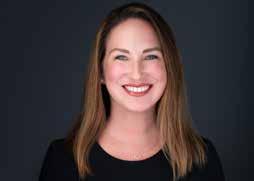
SCOTT WEBB, ESQ. SHAREHOLDER

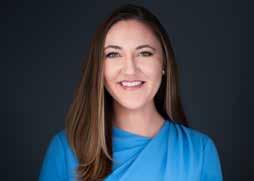

Using the best ingredients is also why Butterworth’s cocktail program is unmatched. The goal was to create the best martini in Washington D.C., and they set out to make that a reality. Perfectly chilled glasses using liquid nitrogen, paired with the finest ingredients available make the expansive cocktail menu feel as refined as it is. The menu is a beautiful mix of perfected classics and new concoctions to help elevate the small, but intentionally crafted menu.
on the side. While not a traditional cocktail sauce, it had a nice tang that complimented the briny, sweet bivalves.
We both raved about our entrees. The bone marrow was presented in two halves of a split beef bone and topped with the snails. It came with a tiny spoon perfect for scooping the marrow onto the bread. It was rich and delightfully fatty. The escargot and bread added some chewiness to the dish, but I would have been happy just eating straight from the bone with the spoon.
My friend shared a bit of her duck. Amazing. It’s one of my go-to dishes when dining in finer restaurants, and Butterworth’s didn’t disappoint. The skin was perfectly crisp, and the duck melted in my mouth. It’s what I plan to order when I eventually go back.
Butterworth’s also did a fine job
with cocktails. My first was a French 75. While usually served in a flute, it arrived in a wine glass and seemed like a more generous pour. Crisp, refreshing and clearly made with decent gin and champagne. My other choice was the Filthy Monkey, Butterworth’s take on a dirty martini made with Monkey 47 gin. Craft cocktails are priced in the $18-$20 range.
Servers and the host were polite and respectful. The crowd was largely 30-something professionals. And there wasn’t a red hat in sight.
Washington is a place where the powerful fly in for the week for meetings, usually driving up hotel prices and making it more difficult to get reservations at the popular restaurants. Then they all go home for the weekend, and the city becomes more normal, at least for D.C.
Even during the federal government shutdown, I found it more difficult to get a weeknight reservation, but I had a choice of times for my Friday night visit.
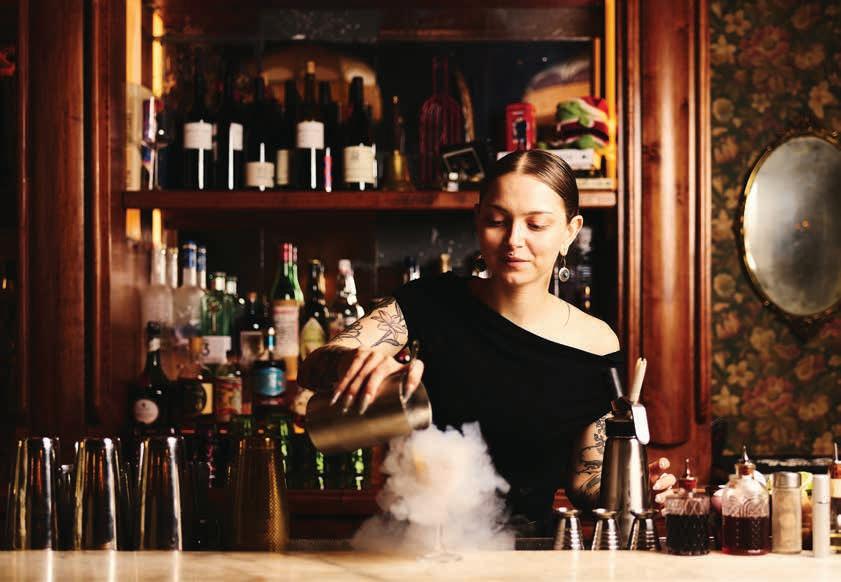
Does Butterworth’s have a different feel than when politics are bustling in the city, or on a night when it’s hosting an event celebrating the British ambassador, as it did last June?
Maybe, but I’m willing to find out. Next time, I’ll invite a Democratic friend and see.







Many of the offices on Capitol Hill get staffed with long-time Hill-dwellers. But Katie Weissert cut her political and policy teeth in Florida, working years for the Florida Department of Financial Services before signing onto Rick Scott’s 2018 Senate campaign.
“In 2018, I joined him as the Policy Director and had a really great experience. It was the first time I’d been working for then-Gov. Scott, and really just admired his leadership and what he was trying to do up here in Washington. So I followed him up,” she said.
Weissert in May was promoted to serve as now-Sen. Scott’s Legislative Director after six years as his Senior Policy Advisor. That means turning her focus beyond taxation and appropriations, working issues on a more global scale while delving into such complicated arenas as foreign policy and defense spending — basically, “all the things the Senator cares about,” she said.
That includes the daunting task of “bringing fiscal sanity” to Washington, tackling government spending not as a strong executive in Tallahassee, but as one of 100 members of a legislative body.
But that’s a familiar mission to Weissert. From working for former Chief Financial Officer Jeff Atwater for many years in Tallahassee, and from two years at Florida TaxWatch before that, she knows all about fiscal conservatism.
The Broward County native and Florida State graduate felt a calling to public service before that.
These days, she’s become entrenched in Washington, D.C. life. She just welcomed her second daughter with husband Robert Weissert, executive director of the Florida House D.C. But while her children may be coming up in the district, with one parent working for Florida’s senior Senator and the other running the state’s de facto Capitol embassy, the children are getting raised as honorary Floridians themselves.
Weissert isn’t alone as someone raised in the Sunshine State and now serving its constituency in Washington, D.C.
“We’re one of very few offices up here that I’ve seen that really keep their staff from their home state that they’re
representing,” she said. “We just always know the Florida flavor. We know we’re closer to the needs of our state. We’ve lived that. We’re very much in touch and in tune with what’s going on, where
some other times, that might not be the case. It’s nice to have Floridian blood go through our veins when we’re thinking about any issue.”
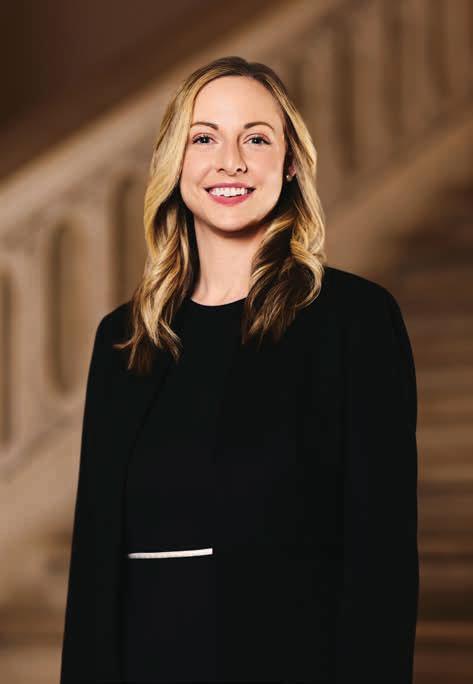
Kailyn McBride’s first foray into media wasn’t in the policy arena, but rather on the sports field. As a sports journalist, she covered the NFL for CBS Sports for more than a year, work that could only partially prepare her for the rough-andtumble of Capitol Hill.
But that’s exactly what drew her out of the press box and into the policy scrum.
“I wanted something that really just woke me up in the morning, and, you know, was my last thought when going to bed. And it wasn’t football, it wasn’t sports,” McBride recalled. “But it was more so policy and what we’re doing for our communities and how we can help make the world a better place. I didn’t see that in sports. There was passion, but not as much passion that are within the halls of Congress.”
McBride just came onto U.S. Rep. Sheila Cherfilus-McCormick’s staff as communications director. Before joining the Miramar Democrat’s roster, McBride served as Press Secretary for Rep. Melanie Stansbury, a New Mexico Democrat, and as a digital director for Rep. Bonnie Watson Coleman, a Democrat from her native New Jersey.
This job marks the first time McBride leads a team on the Hill. She’s in charge of developing the entire media strategy for Cherfilus-McCormick, including not just media engagement, but overall branding and connections between the Congresswoman and a growing network of media voices and social influencers.
“I’ve had learning curves, but nothing that I haven’t seen before,” McBride said. “It’s just a lot of moving parts. But I think I’m doing a great job in terms of my handle on everything. Every day is a new day. It’s been a great opportunity.”
Jumping onto Cherfilus-McCormick’s team also required studying some areas of policy especially important to South Florida, including the legal fight to maintain temporary protected status for Haitians and other refugees.
“The member is currently the only Haitian Democrat in Congress, so she does have a leading and prominent voice when it comes to immigration and TPS,” McBride said. “People really do look to her for her expertise and her insight, and

she’s very knowledgeable in this area. It’s just inspiring to see how hard she fights for everyone to be heard.”
Throughout her career, McBride has already seen significant evolutions in the way members of Congress communicate with the public. The job involves connecting members often with figures from the sports world she once left behind, such as former track star Allyson Felix, now a social media influencer and
advocate for Black maternal health. She also has connected her member with Tatiana Ali, the actress of Fresh Prince of Bel Air fame, and Carla Hall, a Top Chef contestant and The Chew co-host, all of whom host solid followings online.
“Now I’m seeing that working with influencers and collaborating with people who aren’t necessarily in the policy world, but have a voice, that is important,” McBride said, “now more than ever.”

Mercury Public Affairs has promoted Danielle Alvarez to Partner after she returned to the firm earlier this year as a Managing Director.
Alvarez rejoined Mercury after serving as a Senior Advisor in President Donald Trump’s 2024 presidential campaign.
“Danielle is one of the most dynamic and respected media and public affairs strategists in the country,” Mercury CEO Kieran Mahoney said. “We were proud to welcome her back and are even prouder to announce her pro-

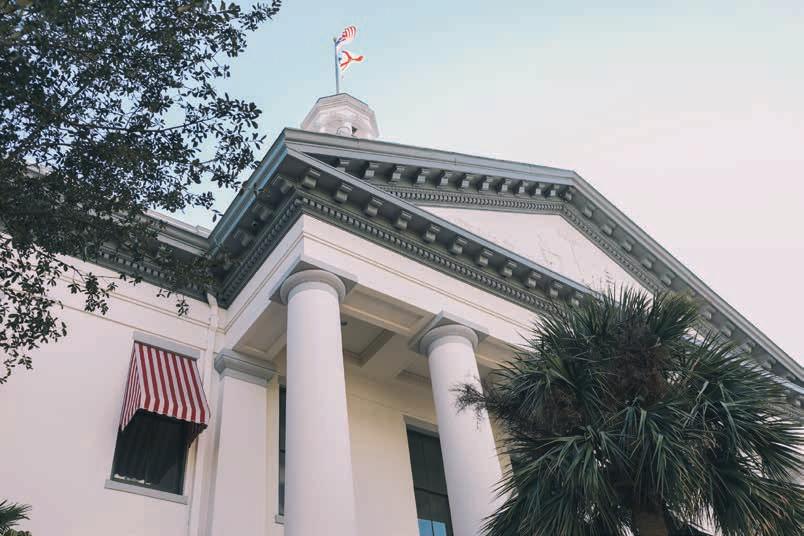
motion to Partner today. Her unmatched experience at the highest levels of politics, paired with her deep understanding of public affairs and communications, makes her an invaluable asset to our clients and our firm.”
In addition to her previous work with Mercury and on Trump’s 2024 campaign, Alvarez has held several senior leadership positions in GOP politics, including as Communications Director for the Republican National Committee in the 2022 Midterms. She also led communications for the Southern Gulf region on Trump’s 2020 campaign, develop-
Shumaker Advisors has added Mike Fedorchak, a Washington, D.C.based consultant, as Vice President of Federal Affairs.
Fedorchak brings with him more than two decades of leadership experience in government relations, public policy, business and grassroots advocacy.
“With Mike’s arrival, we are building on a foundation of strong client service and impactful advocacy,” Shumaker Advisors Senior Vice President of Federal Affairs Ryan Walker said. “His distinguished career of government affairs, business, and campaign experience strengthens our ability to navigate Washington’s complex policy landscape and deliver real results for our clients.”
Fedorchak will work with lawmakers on Capitol Hill, regulatory agen-
ing communications strategy in Florida, North Carolina and Georgia.
Previously at Mercury, Alvarez served as Senior Vice President of Public Relations, where she developed and executed strategies for clients in a variety of industries, including health care, real estate and political campaigns, and for some startups and multinational corporations.
Alvarez also previously served in former Gov. Rick Scott’s administration.
“I rejoined Mercury at a time of tremendous growth and opportunity and am really looking forward to joining the leadership of the firm as we move to the next
cies and coalition partners to advance client priorities in Congress and the presidential administration.
Prior to joining Shumaker Advisors, Fedeorchak worked as a public affairs consultant in Washington, D.C., advising clients on a wide range of issues, including federal engagement, issue advocacy and policy development.
Fedorchak is married to Republican U.S. Rep. Julie Fedorchak of North Dakota, the state’s first woman elected to the House. He was a senior adviser to her campaign, leading fundraising strategy, communications and debate preparation.
Fedorchak previously served as State Director for Americans for Prosperity in North Dakota, leading grassroots campaigns and securing significant policy victories, including the passage of a bill (HB 1425) reinvesting $1.6 billion into the state’s economy. The bill passed in 2021 and pushed to invest a greater portion of the state’s Legacy Fund in qualified investment firms with a presence in North Dakota.
chapter,” Alvarez said. “We are uniquely positioned to deliver results for clients across politics, business, and in all areas of advocacy. We have an exceptional team to build on a solid record of success.”
Mercury is a high-stakes, bipartisan public strategy firm providing federal and state government relations, international affairs, digital influence, public opinion research, media strategy and grassroots mobilization in all 50 states. Mercury has 14 offices nationwide and is part of the Omnicom Public Relations Group, the nation’s largest global network of communications and consulting agencies.
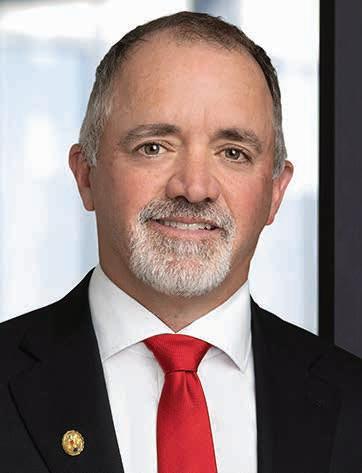
nomic challenges facing entrepreneurs, which can be used to shape practical, business-focused policy strategies.
Before that, Fedorchak served 19 years with pharmaceutical giant Pfizer, where he earned national recognition for sales leadership and successfully launched some of the company’s most prominent pharmaceutical products.
Fedorchak also has a background as a small-business owner, bringing perspective to his federal work. His scope of professional experience lends critical insight into regulatory hurdles and eco-
Fedorchak is also a U.S. Navy veteran, having served as an Electronic Technician on the USS Wabash in Desert Storm.
“Shumaker Advisors has built a strong reputation in Washington for delivering meaningful results, and I’m proud to be part of a firm that shares my commitment to principled advocacy, strategic problem-solving, and advancing policies that make a real difference for clients and communities alike,” Fedorchak said.
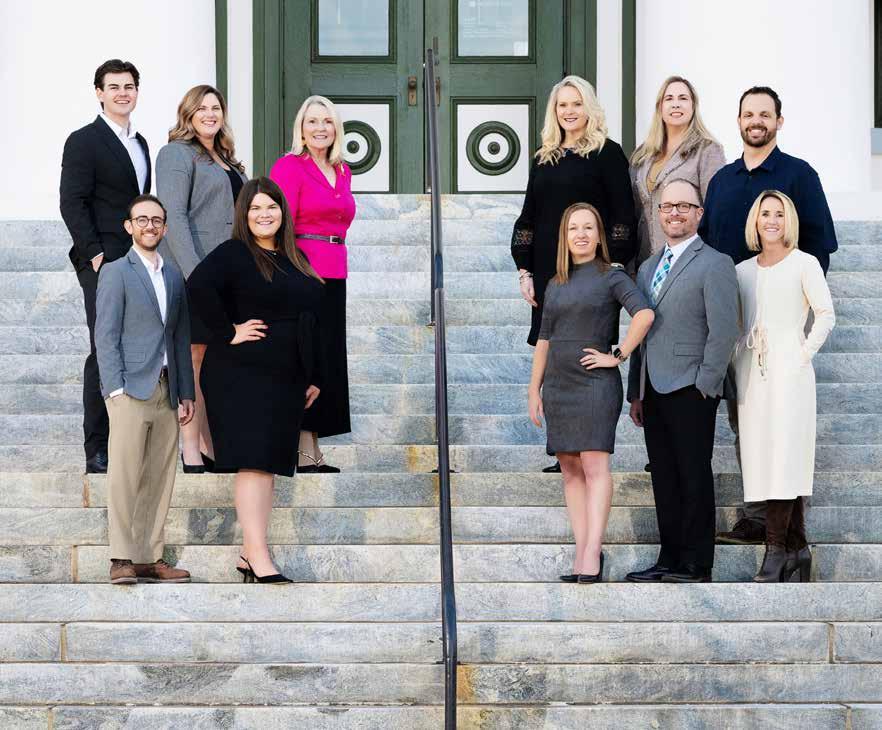
Proven. Powerful. Unrivaled. Moore doesn’t just navigate public affairs—we shape it. Consistently ranked a top Public Affairs agency in Florida by O’Dwyer’s PR, we have one of the largest teams of credentialed professionals in the state. Our deep expertise and statewide relationships deliver impactful results. With a 98% client retention rate, our commitment to excellence is clear. Ready to win? Choose Moore.





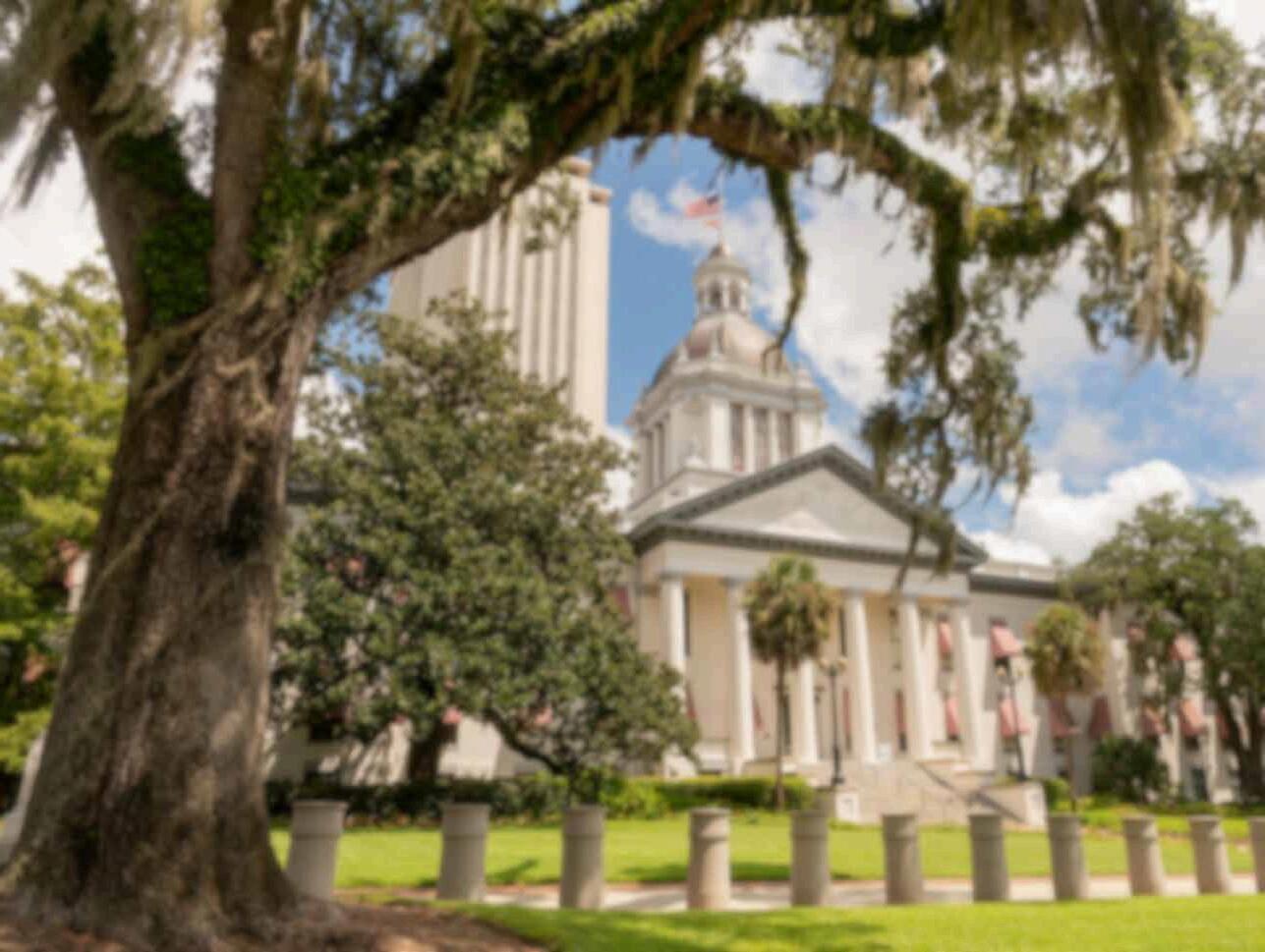





Matt Leopold, who served as General Counsel for the U.S. Environmental Protection Agency (EPA) during the first Donald Trump administration, is returning to familiar territory, this time in the private sector.
Leopold has joined Holland & Knight as partner and co-Chair of the firm’s national Environment Team, bringing decades of courtroom and rulemaking experience to one of the country’s largest law firms.
A familiar name in Florida’s legal circles, Leopold previously served as General Counsel for the Florida Department of Environmental Protection, where he advised on some of the state’s most complex water and land-use issues. In Washington, he became a key architect of major environmental rules during his tenure at EPA, helping to shape policy on everything from water quality to vehicle emissions.
At Holland & Knight, Leopold will advise clients in industries that live or die by the regulatory pen, including energy, agriculture, chemicals, and trans-
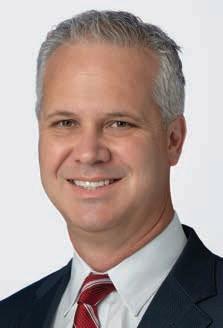
portation. He’ll be based in D.C., but said the firm’s deep Florida footprint made the move especially appealing.
Ana Ceballos, an award-winning state government and political reporter for the Miami Herald, has left the South Florida paper for an equally sunny locale at the Los Angeles Times.
She’s now serving as the L.A. Times’ Washington correspondent, focusing on issues out of the Trump administration and California’s congressional delegation.
Ceballos was part of the Miami Herald team that landed a coveted Pulitzer Prize in 2022 for breaking news coverage of the condo collapse in Surfside. That same year, she also shared a Polk Award for reporting on Gov. Ron DeSantis’ controversial migrant flights.
Additional work at the Herald included reporting this year on Alligator Alcatraz, including breaking news that a minor had been held there despite denials from President Donald Trump’s ad-
ministration of doing so. She was also a part of Alligator Alcatraz coverage that revealed the names of hundreds of detainees at the facility.
Ceballos’ move to the L.A. Times is a homecoming of sorts for the enterprising reporter; she grew up in Southern California and graduated from San Diego State University before covering murder trials, local corruption and wildfires at the Monterey County Herald and Monterey County Weekly after earning her journalism degree.
She began her new post on Sept. 2.
As of mid-November, Ceballos had covered a variety of national topics ranging from the end of the longest-ever federal government shutdown to Trump’s slip among Latino voters and the President’s push to end the filibuster, among other news.
“Over the past few years, Holland & Knight has assembled an incredibly experienced environmental team that I’m proud to join,” Leopold said. “The ability to contribute meaningfully to the firm’s government practice and be involved in significant environmental regulatory, litigation and transactional matters is a tremendous opportunity.
“In addition, Holland & Knight’s deep influence and connections within Florida, my home state, is a great fit that allows me to add additional strength to the firm’s well-known practice. I look forward to a long and successful partnership.”
Before his time at the EPA, Leopold served as an environmental litigator with the U.S. Department of Justice, part of the trial team in the aftermath of the 2010 Deepwater Horizon oil spill — still the largest civil environmental case in U.S. history. He also represented Florida in its long-running water rights dispute with Georgia before the U.S. Supreme Court.
Holland & Knight’s Public Policy & Regulation Group leader Rich Gold said Leopold’s background “marks a significant step forward” for the firm’s national practice. For Leopold, the move represents a homecoming of sorts — a return to environmental law’s front line, where science, politics, and industry interests constantly collide.

Real estate fuels America’s #1 economy — and Florida Realtors® is at the heart of it.

With 238,000 members statewide, we work alongside lawmakers to drive forward-thinking policies that break down barriers to homeownership, protect property rights, and power prosperity across Florida. Because when real estate thrives, people thrive.
Let’s keep moving Florida forward, together.

In Tallahassee and throughout the state, Holland & Knight’s Florida Government Advocacy Team represents clients before Florida’s state and local governments, carefully guiding and supporting them through complex issues that affect their interests.
Backed by a deep bench – including some of Florida’s most experienced litigators and regulatory attorneys –our team of public policy advisors and lawyers draws on strong relationships and political and legal know-how to advocate for our clients.




www.hklaw.com
















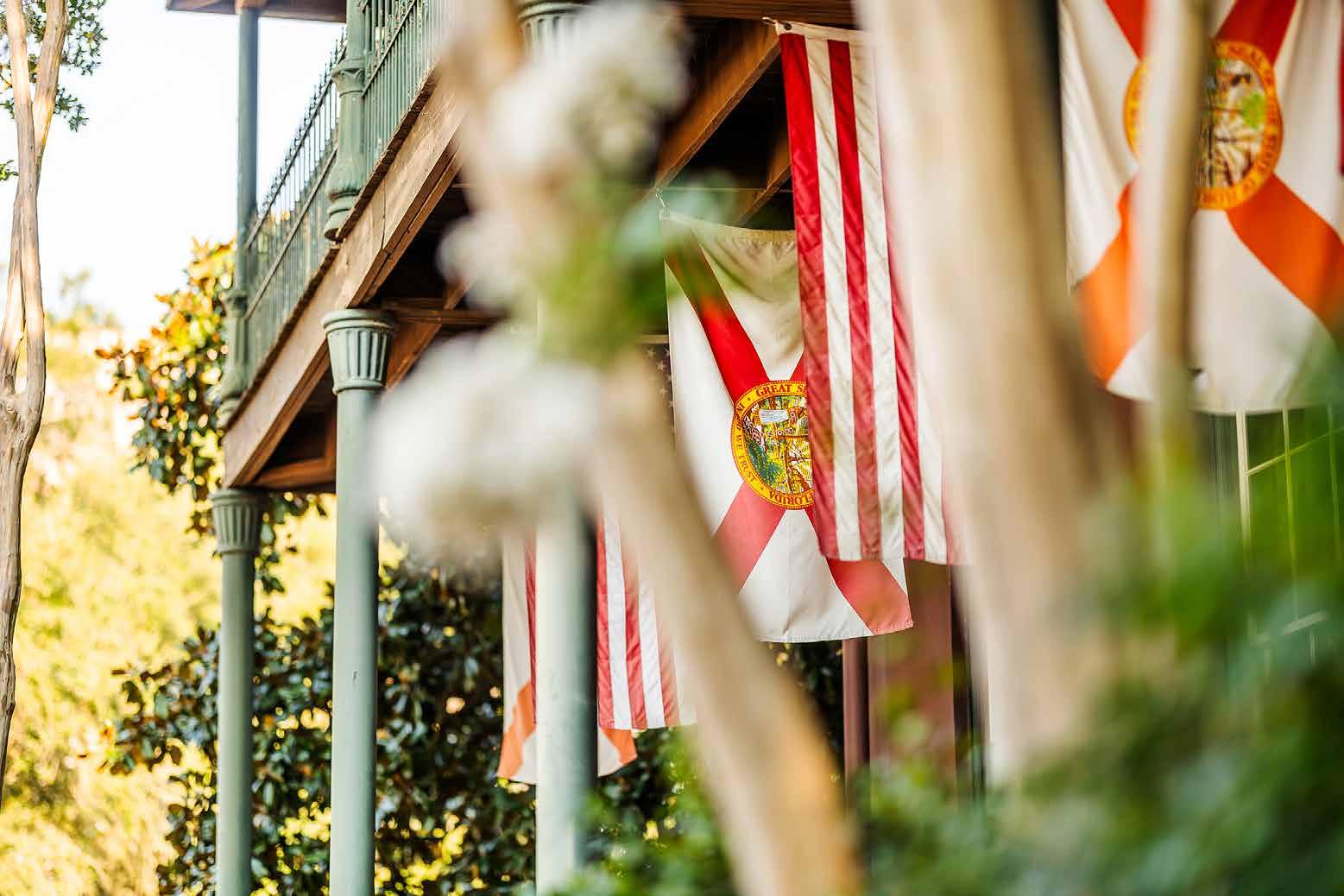
Real estate drives the state’s success, and Florida Realtors® is leading the way.
As states compete for talent, investment, and innovation, Florida has solidified its place as a global contender.
Ranked the nation’s No. 1 economy by U.S. News & World Report, Florida is more than a destination—it’s a blueprint for the future.
At the center of Florida’s success is real estate. And no organization understands its impact better than Florida Realtors®, the state’s largest professional trade association with 238,000 members and a legacy of shaping Florida’s growth.
“Florida’s real estate market is a catalyst, driving our economy and creating opportunity,” said Tim Weisheyer, 2025 president of Florida Realtors. “Real estate is about more than property. It’s about stability, upward mobility, and helping people build a future. Every time we help someone cross the threshold into homeownership, we’re strengthening Florida’s foundation.”
During the pandemic, Florida became a top destination for in-migration. Today, as the market recalibrates, some headlines suggest dramatic declines. But as Weisheyer explained, “What we’re seeing is a market finding its balance. Florida’s prominence means we feel shifts more acutely, but it also means we lead the way in navigating them.”
Florida Realtors helps policymakers, industry leaders, and consumers understand these shifts. The association provides some of the most comprehensive market data in the country, tracking trends back to 2008. This data-driven approach ensures that decisions are grounded in reality, not headlines, and reinforces the association’s role as a trusted leader in Florida’s evolving real estate landscape.
In recent years, Florida has delivered forward-thinking policy to make the Sunshine State an even more desirable place to live, work, and invest, including:
• Insurance reforms, which have effectively reduced the average rate increase in Florida from over 21% to just 1%— the lowest in the nation.

• Elimination of Florida’s uniquely burdensome business rent tax, unlocking growth for small businesses and freeing up capital for hiring, investment, and innovation.
• Condo transparency laws, requiring clearer access to financial and structural records, reestablishing trust in Florida’s condo market.
• $280 million for My Safe Florida Home, helping Floridians harden their homes against storms, reducing insurance premiums and Florida’s long-term recovery costs.
• $50 million for the Hometown Heroes Housing Program, helping essential workers afford homes in the communities they serve.
• Property rights protections, including legislation that prevents unlawful occupancy and defends the rights of owners to buy, sell, and lease with confidence.
These measures are economic multipliers. Florida ranks as the 16th largest economy in the world, and real estate accounts for one-fifth of that output. It is also the top U.S. destination for international buyers. These factors underscore how the work of Florida Realtors, from advocacy to market intelligence, directly influences one of the most powerful economic engines in the world.
As policymakers look ahead, the message is clear: Real estate is the foundation of Florida’s success, and the state’s future depends on bold leadership and smart policy that expands access to ownership, protects property rights, and unlocks opportunity for all.

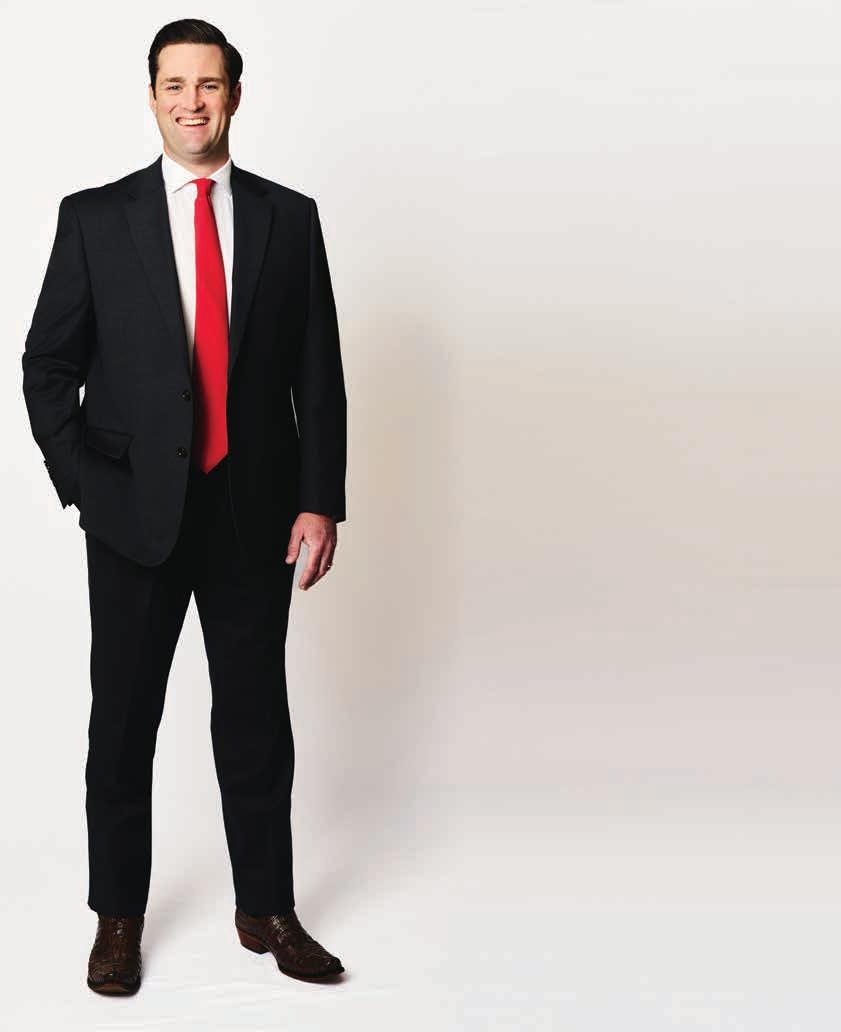
God, family, and America … in that order.
Significant other? Children? Grandkids? My wife of 10 years, Megan, and our three young sons.
In 25 words or less, explain what you do: I help clients navigate the maze of the federal government without losing their sanity, open doors that rarely budge, and make sure smart ideas don’t get lost in bureaucracy.
Without using the words Democrat, independent or Republican, conservative or liberal, describe your political persuasion: God, family, and America… in that order. I believe in secure borders, tightknit communities, hard work, and leadership that doesn’t talk in circles. It gets things done.
During your career, have you had a favorite pro bono client? I’m still relatively new to this world, but service has always been part of who I am. I spent four years on the Texas Medical Board and now serve on the board of the American Cornerstone Institute, founded by Dr. Ben Carson. I recently took on my first pro bono case. It’s a powerful reminder that I’m part of a firm that truly believes in giving back and standing up for what’s right.
Three favorite charities? American Cornerstone Institute, American Warrior Association, and Community Engagement & Opportunity Council. Each of these is committed to faith, service, and rebuilding the strength of our nation from the ground up.
Professional accomplishment of which you are most proud? As my career has grown, I’ve made it a priority to stay grounded and grateful for where I began, the people who believed in me, and the purpose that drives me every day. I’m just as proud of my experience running a local state campaign in South Carolina, as I am of my time working in the White House.
Who is your favorite reporter and why? Peter Doocy, fearless in the briefing room and always prepared. He asks the questions others tiptoe around.
Other than FloridaPolitics.com, your reading list includes: Politico, RealClearPolitics, and the usual D.C. reads, plus the occasional Clemson football message board, though I’ll admit that’s been lighter this year for obvious reasons.
What swear word do you use most often? I’ve adopted my four-year-old’s go-to phrase, “What the hank!” It fits just about every situation life throws your way.
What is your most treasured possession? Somehow, through every move, I’ve held on to a few special things: a note from my wedding day, one of the boys’ first drawings, and my grandfather’s old college football rings from his days as the team doctor. Nothing fancy, just pieces of my story that mean the most.
The best hotel in D.C. is … For our anniversary, I took my wife to the HayAdams, and our room looked out over the White House. We watched Marine One land from our window. It doesn’t get much more historic D.C. than that!
You’ve just learned that you will be hosting a morning talk show about Florida politics. Who are the first four guests you’d invite to appear? Susie Wiles, Bill Rubin, Byron Donalds, and Marco Rubio.
Favorite movie? As a proud South Carolinian, “The Patriot” will always top my list: history, grit, and home all in one.
When you pig out, what do you eat? Bojangles used to give out a free biscuit whenever Clemson scored 28 points. Still my go-to.

Significant other? Children? Grandkids? Husband.
In 25 words or less, explain what you do. Shepherd appropriations and policy outcomes in the halls of Congress and within the Administration through authentic advocacy and bipartisan negotiation at FL-DC legal-lobbying firm, GrayRobinson.
Without using the words Democrat, independent or Republican, conservative or liberal, describe your political persuasion. I generally support free-market economics, individual freedom with personal responsibility, and American leadership in global affairs.
During your career, have you had a favorite pro bono client? Guardian ad Litem.
Three favorite charities? Wounded Warriors, Captains for Clean Water and Florida House on Capitol Hill.
Professional accomplishment of which you are most proud? Serving in the First Trump Administration for Secretary Ben Carson and aiding the American public with homeownership, housing affordability, and disaster recovery.
Who is your favorite reporter and why? Bret Baier. A pillar in the media industry with thoughtful and informative reporting.
Other than FloridaPolitics.com, your reading list includes … Wall Street Journal, Washington Post, CNBC, Punchbowl, FT, and Bloomberg.
What swear word do you use most often? I don’t swear.
What is your most treasured possession? My family.
The best hotel in D.C. is … The Willard.
You’ve just learned that you will be hosting a morning talk show about Florida politics. Who are the first four guests you’d invite to appear? Susie Wiles, Marco Rubio, Rick Scott and Ashley Moody.
Favorite movie? Miracle on Ice.
When you pig out, what do you eat? Ice cream.

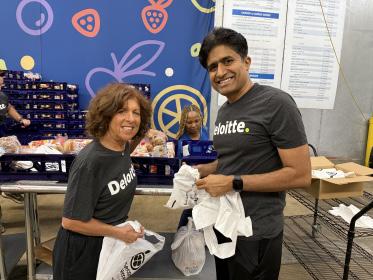
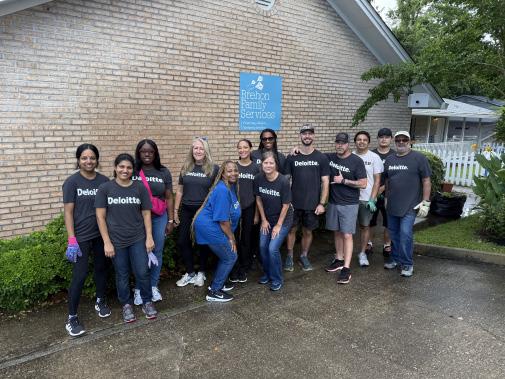
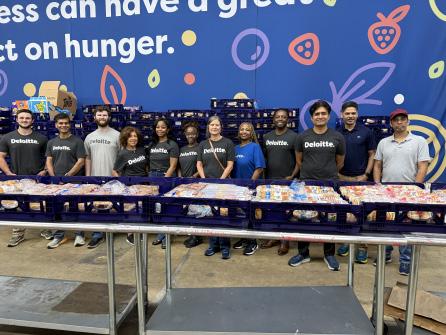
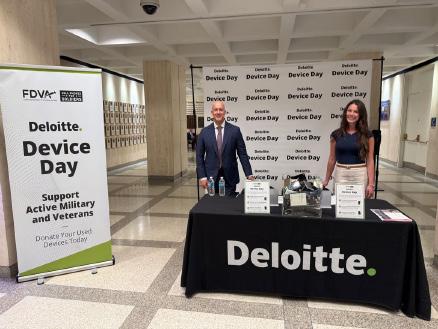
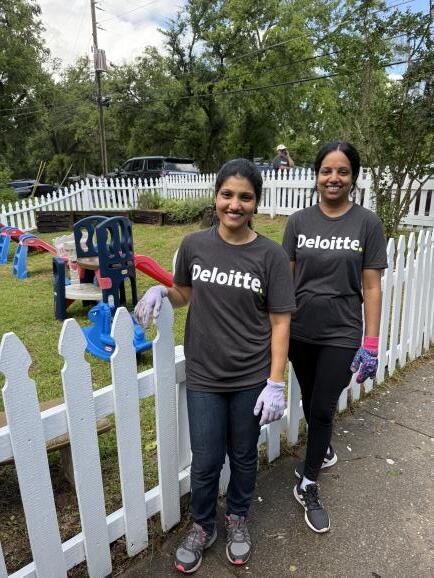


Deloitte professionals are proud to give back to the communities in Florida where they live and work.
Their commitment to making an Impact that Matters is year-round, but they celebrate every June with an annual day of service. On Impact Day, hundreds of Deloitte volunteers spread out across Florida to donate their time and skills to support local schools, nonpro ts and other charitable organizations.
Deloitte also hosts an annual Device Day, in collaboration with Cell Phones for Soldiers, to collect donated mobile devices and refurbish them for America’s veterans, helping them stay connected to their families and friends. The program has a goal of supporting 10,000 veterans by the end of 2025.
For more than 100 years, Deloitte has been a trusted advisor to government clients, helping them build the future, solve complex challenges, transform service delivery, and achieve bold mission goals. With deep experience in both the public and private sectors, a tech- rst approach, and a strong understanding of their clients’ needs, Deloitte helps state leaders drive meaningful progress for the people they serve.
Deloitte.com/us/government
Significant other? Children? Grandkids? Kristine Brown, Douglas Phillips (son).
In 25 words or less, explain what you do. I’m a seasoned lobbyist and strategist with over 30 years of experience in consulting, business management, government affairs and public relations for diverse clients.
Without using the words Democrat, independent or Republican, conservative or liberal, describe your political persuasion. Hamilton nationalist and strong Jeffersonian governmental advocate.
During your career, have you had a favorite pro bono client? Joe Pantoliano’s foundation: the No Kidding? Me Too! Foundation, which helps educate souls everywhere to stomp the stigma of mental illness.
Three favorite charities? American Red Cross, Tunnel to Towers Foundation, Salvation Army.
Professional accomplishment of which you are most proud? Being elected and serving as Chair of the District of Columbia Republican Party and Chair of the Northeast Region of the Republican National Committee.
Who is your favorite reporter and why?
John Gizzi of Newsmax. John has been a White House Correspondent forever. He has seen administrations come and go. He has covered the Congress longer than anyone in Washington!
Other than FloridaPolitics.com, your reading list includes … The Wall Street Journal, The Washington Post, Roll Call, POLITICO, The Hill, Newsmax, Fox News.com and Cigar Aficionado.
What swear word do you use most often? #@%&*^!
What is your most treasured possession?
My toy soldier collection.
The best hotel in D.C. is … The Willard Hotel. It has a great lobby.
You’ve just learned that you will be hosting a morning talk show about Florida politics. Who are the first four guests you’d invite to appear?
President Donald J. Trump, Gov. Ron DeSantis, Susie Wiles, Peter Schorsch
Favorite movie? “Patton.”
When you pig out, what do you eat? BBQ: beef brisket, baby back ribs, North Carolina pork sandwich.
Lobbyist by day, breaking down mental health stigma by night



The Florida Hospital Association advocates for Sunshine State hospitals and health care systems to support their ability to provide cutting-edge, innovative health care technology and treatments for Floridians. Modern, sophisticated, high-quality care close to home supports comprehensive patient care for the best outcomes.

The Forum Club of the Palm Beaches is Florida’s preeminent destination for thought leadership. Join nearly 800 influential business, political and community leaders as we celebrate 50 years of robust civil discourse and thoughtful conversations with the nation’s top policymakers and business executives.
STIMULATE THOUGHT. PROMOTE DIALOGUE.
Discover our calendar of thought-provoking events at forumclubpalmbeach.org




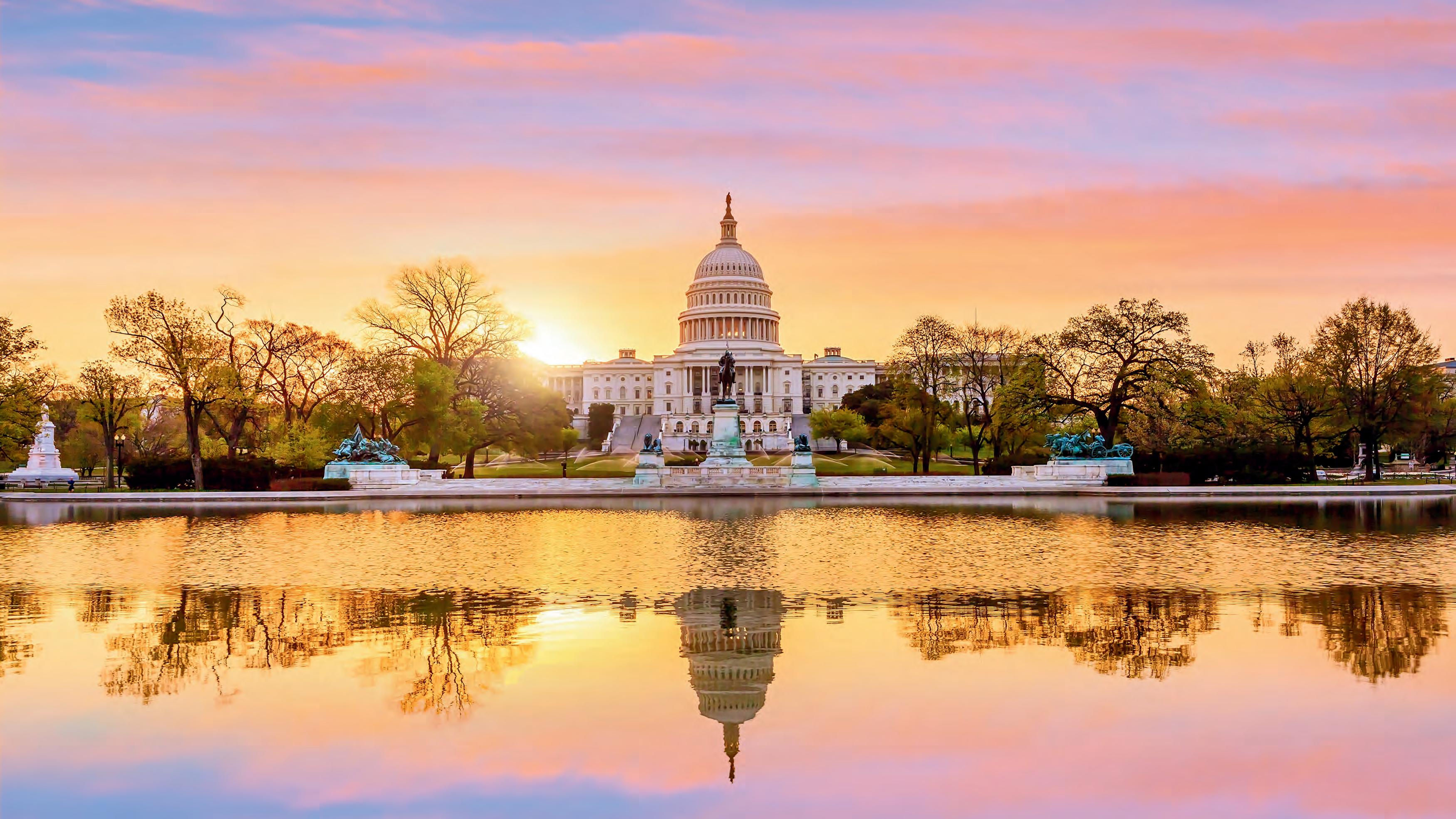

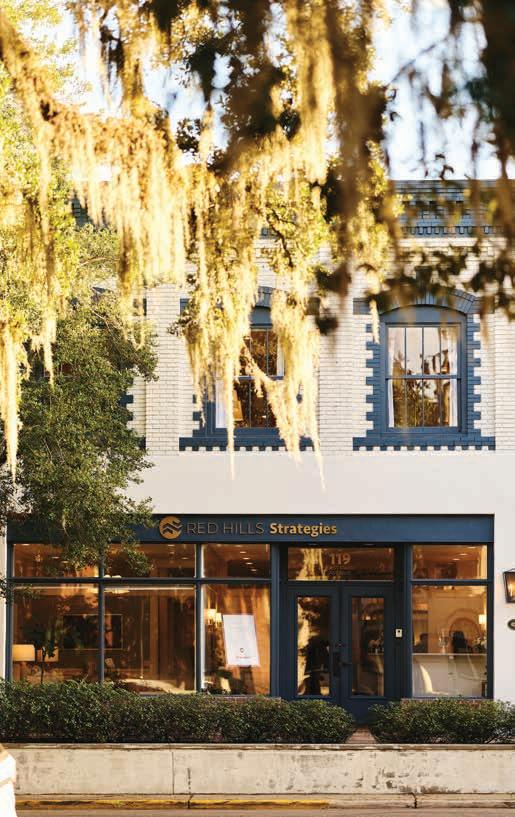
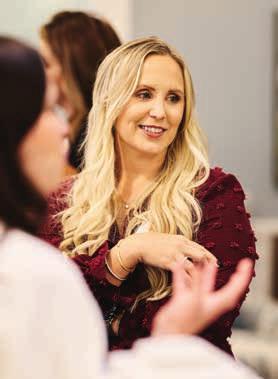

The Red Hills team opened its doors recently for an open house at its new headquarters at 119 East Park Avenue. The building, which was constructed in 1893, got a fresh new look. It was more than a coat of paint. The elegant update, clean design and functional set-up was the vision of Neat Interiors, owned by Darica Smith and Jenn Shelby Visitors included Senate President Designate Jim Boyd, former Senate President Kathleen Passidomo, Stephanie Smith and Justin Thames of TECO Energy, Stephen Shiver and Slater Bayliss of The Advocacy Partners, Alli Liby-Schoonover of MHD, Trey McCarley, Pat and Erin Gillespie, Brooke McKnight, John Wallace, Jack and Julie Rogers, Jim Rosica of the Tallahassee Democrat, Scott Shalley of The Florida Retail Federation and of course AIF president and CEO Brewster Bevis (husband to Red Hills owner Amanda Bevis).The space marks an expansion of Red Hills Strategies, which was launched in 2018 by Amanda Bevis. The team of 10 now includes Brittany Clark, Leigh McGowan, Jessie Werner, Maggie Gahan, Caroline Hamon, Haleigh Permenter, Madison Dorval and Kaylee Owens. They represent Senate leadership, Tampa General Hospital, Florida Citrus Mutual, TECO Energy and Florida Retail Federation, among others.

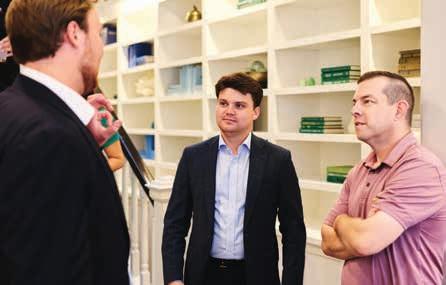
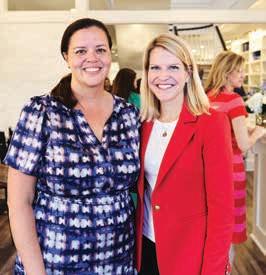
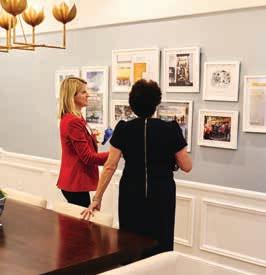









As the only locally headquartered health system in Northeast Florida, Baptist Health is proud to bring nationally ranked cancer care to our region and to patients throughout our state. For a decade, Baptist MD Anderson Cancer Center has been delivering world-renowned, research-driven care close to home. From prevention to cutting-edge therapies, we’re creating a brighter future for the Sunshine State. BaptistMDAnderson.com



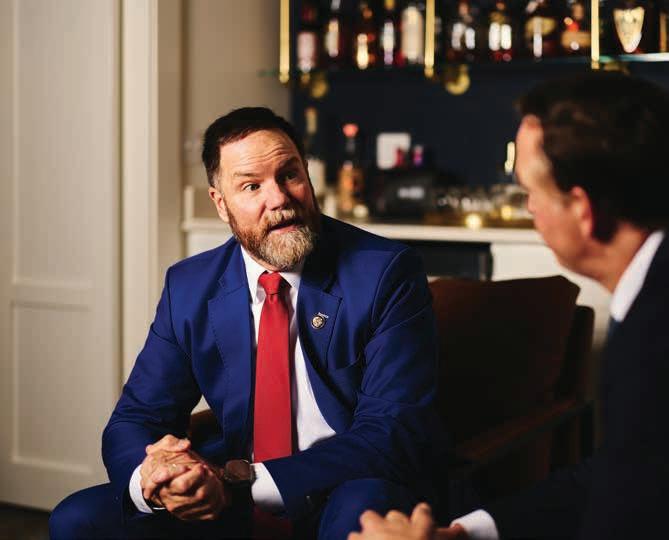
By Jacob Ogles
The Members Lounge kicked off the first week of Florida’s Legislative Committee Weeks with a familiar face in Florida politics — and now a familiar one on Capitol Hill — U.S. Rep. Aaron Bean. A former Florida Senate President Pro Tempore and longtime member of the Florida House, Bean has spent more than 25 years representing the people of Florida with humor, heart, and unflagging energy.
Throughout his decades of public service, Bean has been known not just for his legislative record, but for his personal touch. Whether it’s knocking on more than 45,000 doors to meet constituents face-toface or championing their interests in Washington, Bean approaches politics the same way he approaches life — with a commitment to connection, optimism, and purpose.
Back in Tallahassee, during the shutdown, for his friend Sam Garrison’s Speaker Designation ceremony, Bean reunited with old friends — including his longtime friends at The Advocacy Partners — for some fellowship in the Members Lounge. Over refreshments and laughter, they sat down with Bean to explore what drives him, what keeps him grounded, and why he still believes relationships are the most durable currency in politics.
What’s your favorite way to unwind in D.C.?
To be honest, sleep! In D.C., you’re up at dawn for pre-coffee meetings, you’re lucky to be in bed by 10. Abby and I love walking The Mall, grabbing coffee, and catching up — reflecting on our day... and often reflecting on the reflecting pool, lowering the blood pressure, and remembering how good life really is.
You were once a mini-golf and ice-cream entrepreneur. What drew you to politics?
My wife and I always had a passion for people and for making things better. I started on the Fernandina Beach City Council, became Mayor, and somehow kept getting told I couldn’t win the next race. We proved them wrong again and again — first in the House, then in the Senate. We knocked on 45,000 doors and hustled hard. Now I’m in the U.S. House — living the dream. We’ve got a country to save, and I’m all in to save it.
When you’re angry, what might someone overhear you mutter?
“Fiddlesticks.” That’s my f-word.
If you hosted a podcast, who would be your dream guests?
Speaker Mike Johnson — he’s doing an amazing job herding cats with such a thin majority. Jim Jordan — a warrior and a friend. Congressman Morgan Luttrell from Texas — a great freshman voice. And Secretary of State Marco Rubio — one of Florida’s finest.
If you could have drinks with two or three people, living or dead, who would they be?
Jesus Christ — the obvious No. 1. Abraham Lincoln — the ultimate unifier. There’s an exhibit at the Smithsonian with the things Lincoln had in his pocket the night he died. No cell phone, of course — just a few articles, a pen, and paper. He carried wisdom lightly, but deliberately.
What piece of legislation are you most proud of?
Several. In Florida, I helped craft the financing for Medicaid reform, which really helped shape the “free state of Florida.” I pushed the bill allowing pharmacists to give flu shots — controversial at the time, but now mainstream. We
moved Florida from 47th in vaccination rate to the top four. Sometimes doing the right thing just takes persistence. What advice would you give to graduating high-school seniors?
Enjoy the ride. Life moves fast. Experiment, do big things, and be kind — you never know who you’ll be working with, or for, someday. I’ve had incredible luck in this business, but luck favors preparation. It takes time to build trust, and relationships outlast everything else. Would you ever return to serve at the state level?
Never say never. You never know what the circumstances might be — but I’ll always be where I can make a difference.
The Advocacy Partners is a highly regarded, government-relations firm recognized for its integrity, transparency, and deep institutional expertise. With decades of combined experience navigating Florida’s political and regulatory environment, The Advocacy Partners’ professionals are trusted advisors to clients across the state, known for doing things the right way — with respect for both the process and the people who make it work.
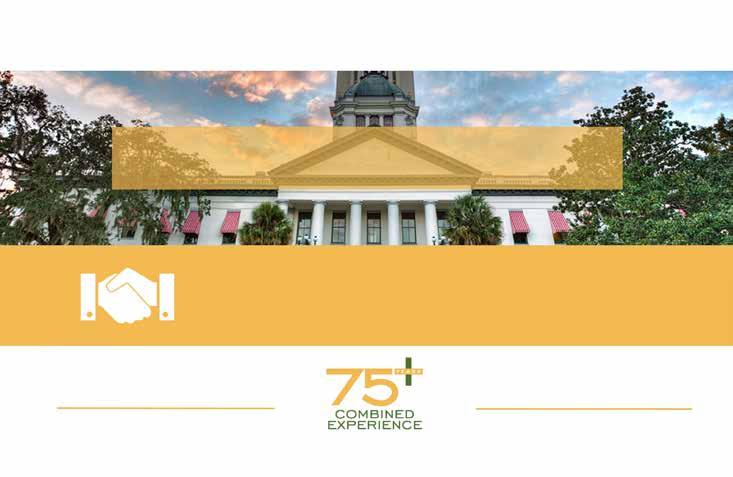



“I’ve had incredible luck in this business, but luck favors preparation.”
Tallahassee
Miami
Riviera
Beach
Orlando
Atlanta
Washington, D.C.

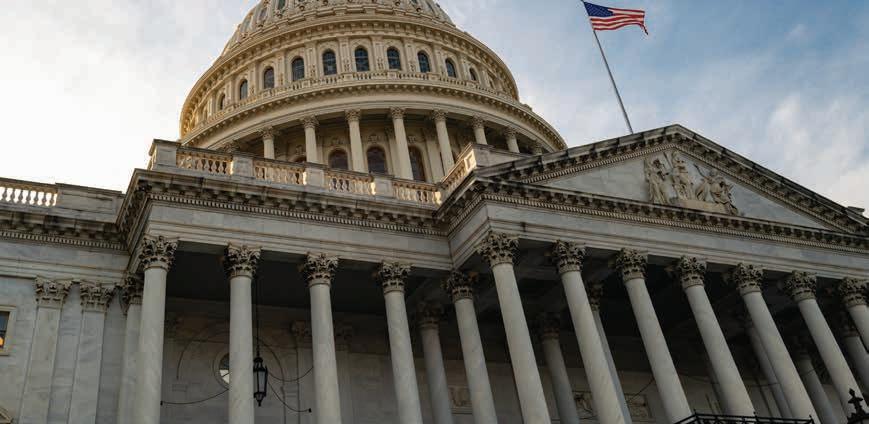
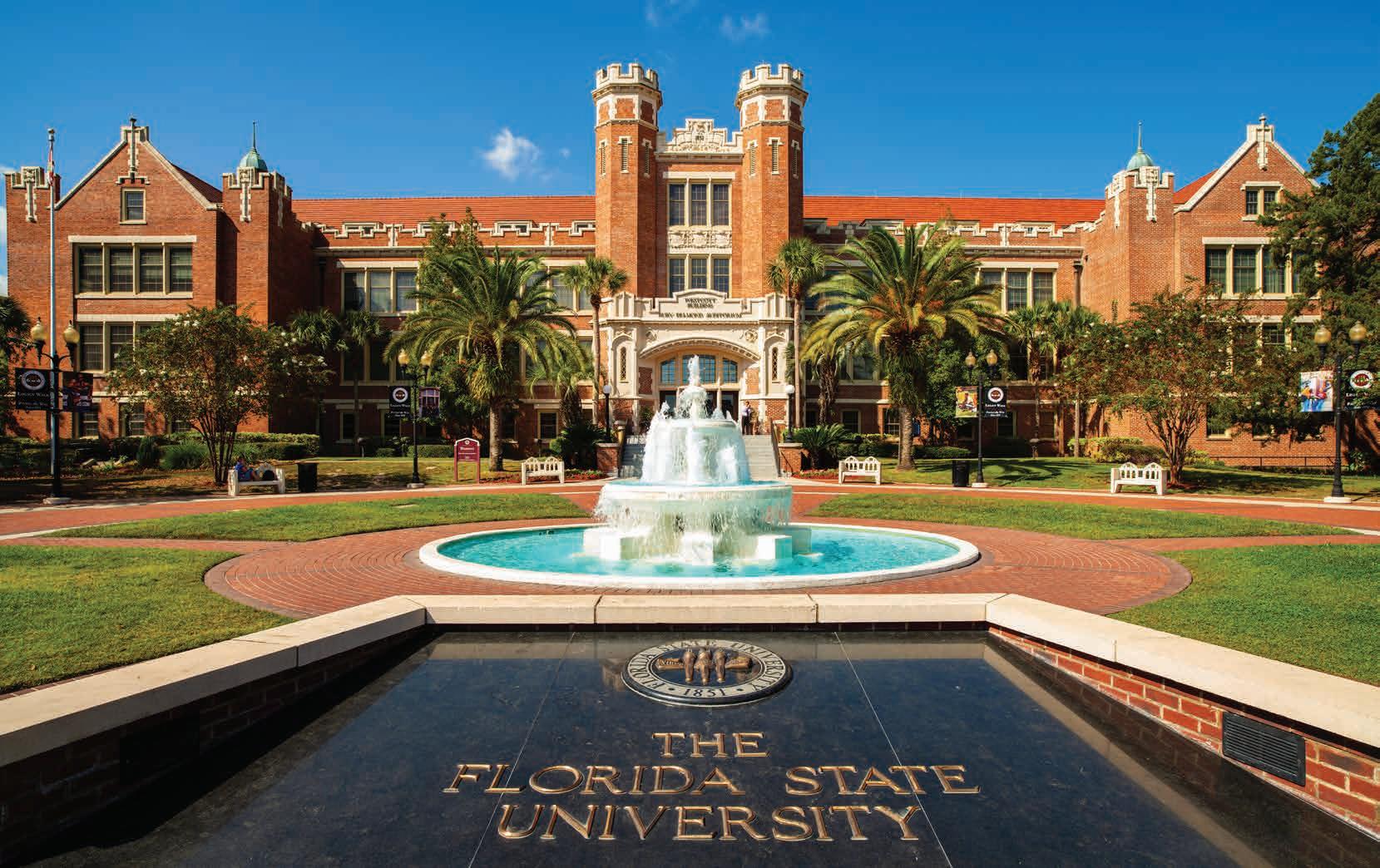





“I’m so stoked!” said Gabriella Burke, a sophomore majoring in political science and government. “I’ve been wanting to go to D.C. for years to have an experience like this and the fact that FSU’s giving me a program that can allow me to go there and still have the resources of school, I’m really excited.”
Burke has already interviewed for an internship with Republican Sen. Ashley Moody. She’s also interested in working in the defense industry. While she’s been to Washington as a visitor and has family in the area, her goal is to eventually live and work in the city.
“Politics is so hard to get your foot in the door, but once you’re in, it makes things a little bit easier for you, and this program is giving you one step closer to getting a foot through the door,” Burke said. “Without this, I probably wouldn’t have ever had an interview with Senator Moody’s office, so I’m already super grateful for the program even existing, because I’ve already been given (an) opportunity that I wouldn’t have had.”
The program isn’t just for students looking to work in House and Senate offices. Josh Duncan, FSU’s federal relations director, is hoping to set one of the students up with a Washington professional sports team.
“We told them that we’d help them wherever they want to go,” Duncan said.
Duncan sat on the couch in the large living room of a townhouse newly constructed for the program. Everything is brand new and of high quality: furnishings, kitchen appliances, cook and dinner ware – even a wine cooler.
The second townhouse is on the same block in a neighborhood where some homes date back to the 19th century. When students aren’t at their jobs, there’s plenty to do within a short walk, from Washington’s historic Eastern Market to a ton of restaurants, bars and shops.
And given the friendly competition between Florida’s state universities, others are already looking at duplicating the idea, Duncan said.
“I think this is going to start an arms race among universities in D.C. I’ve already heard from UF and USF and FIU that they’re looking for student housing now,” Duncan said.
The FSU alumni network in Washington is solid. Thousands are in the D.C. area, and not just in government – though U.S. Reps. Byron Donalds, Jimmy Patronis, Kathy Castor and John Rutherford are among them.
Students are highly encouraged to tap into that network, said Rob Liddell, FSU’s Assistant Vice President for career services.
“(It’s about) really inserting yourself into professional circles, networking groups and accessing our DC-based alumni and really learning and gleaning lessons from them,” Liddell said during a Tallahassee interview.
And if the program is successful, the school might look into buying other townhomes on the same block to expand the program, Liddell said.
Mikey Wagoner, a junior, is also among the first students to be accepted into the program. He previously had a Summer internship with Republican Ohio Sen. Jon Husted, but had to make arrangements on his own. A friend who goes to Georgetown University sublet his apartment to Wagoner between the Spring and Fall semesters.
Wagoner, an Ohio native, had to rent a scooter to get to the subway to commute from Georgetown.
Now that he’s worked in a Senate office, Wagoner plans to intern with FSU’s government relations office. And the fact that he’s participating in the first year of the program is exciting, he said.
“It makes me so much more motivated to be the first stepping stone into a great program for D.C.,” he said. “I’m already interested in public service and Florida State is putting a lot into it, so it’s just really interesting,” he said.
And, of course, he’s looking forward to making use of the FSU network.
“The Florida State network is really strong up there and I’m really trying to build more connections,” he said. “Florida State is such a loving and open community, so I’m trying to be as extroverted as I can be and meet as many people as I can.”
Top: FSU purchased two townhomes in the heart of Capitol Hill, where some homes date back to the 19th Century. Middle: While the new FSU townhomes in D.C. aren’t your typical student housing, the Seminole pride is alive and well far from its Tallahassee roots. Bottom: FSU is a new neighbor in this quaint neighborhood just a short walk to dining, entertainment and Washington’s historic Eastern Market.

G R A S S R O O T S
A D V O C A C Y
C O R P O R A T E A N D P O L I T I C A L
C O M M U N I C A T I O N S
S T O R Y T E L L I N G
E X P E R T S
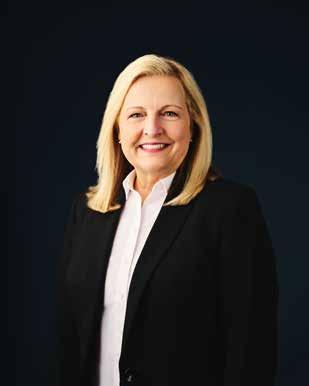
C h r i s t i n a J o h n s o n
P r e s i d e n t c h r i s t i n a @ o n 3 p r . c o m
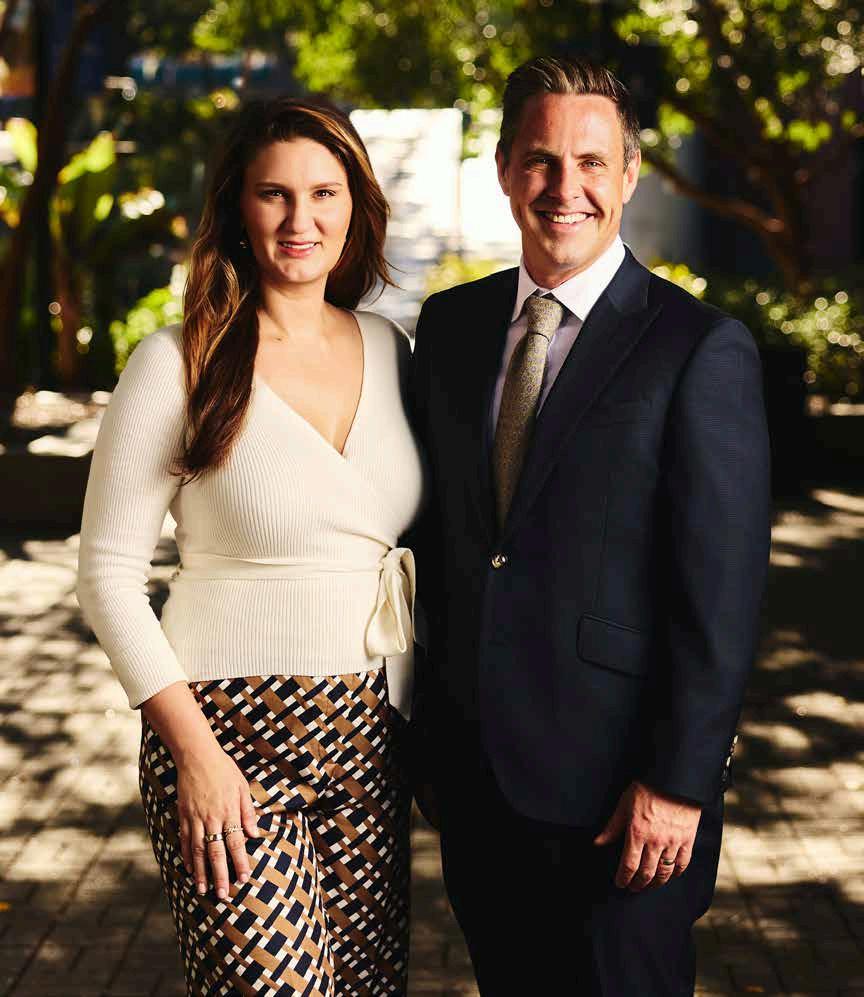

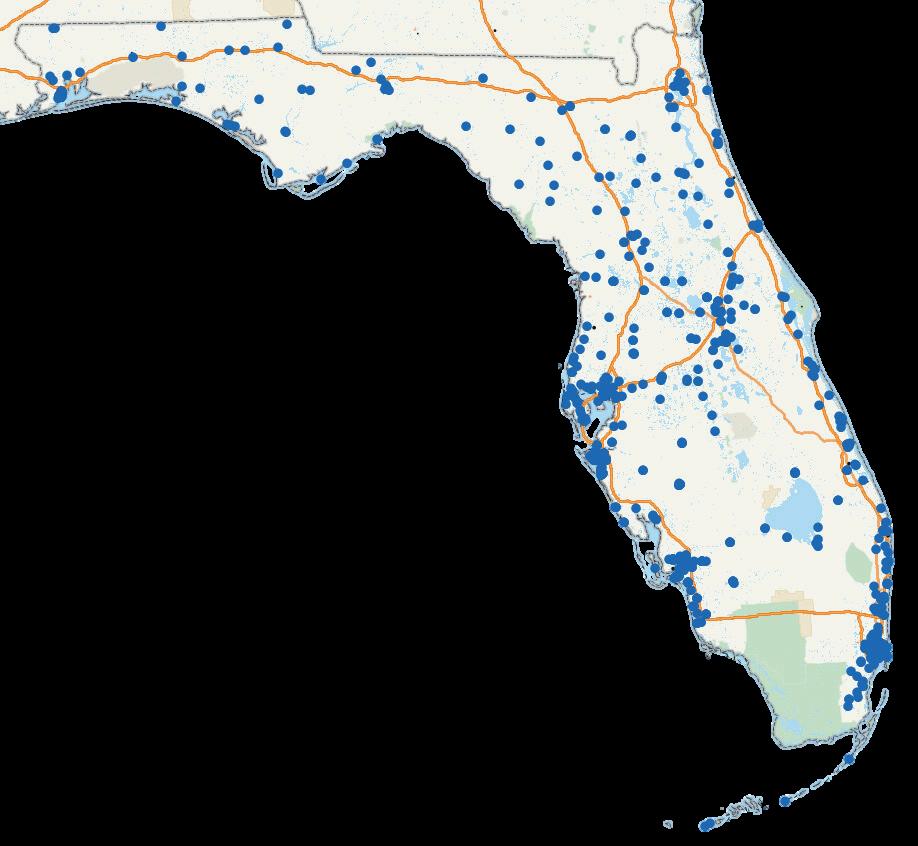

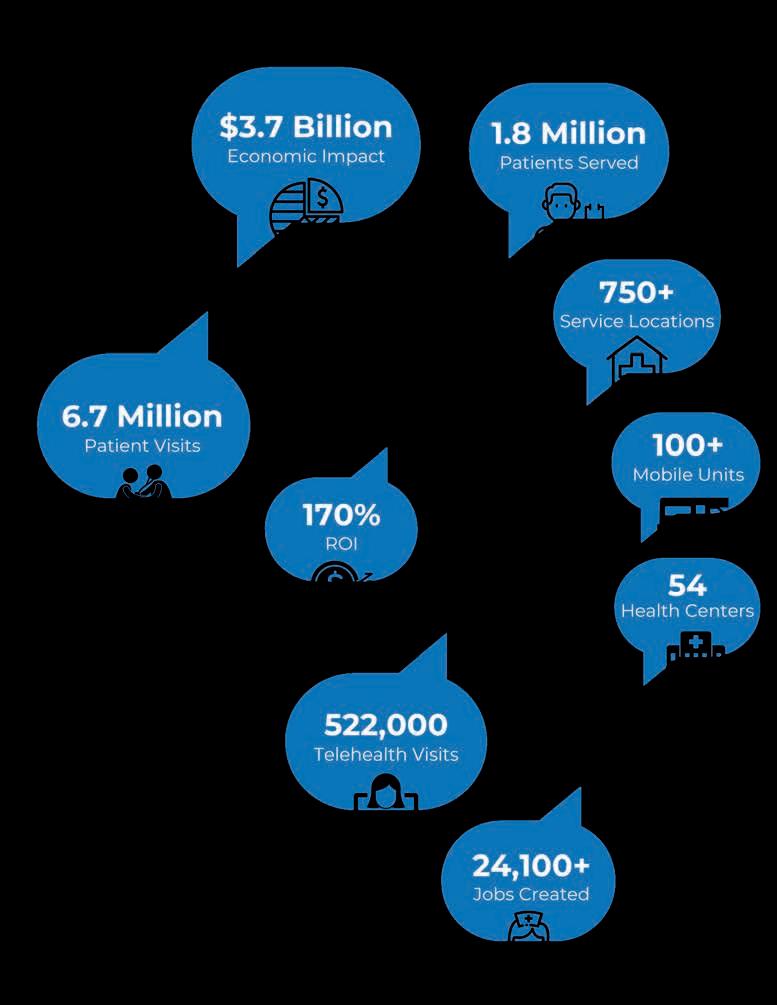


By Paul Bradshaw
Let’s start with this: Tallahassee is to lobbying what Sili-
con Valley is to tech. Improbably, Florida’s small-town capital has become the cradle of advocacy’s future.
Sound absurd? Consider the facts. Currently, the No. 1 ranked lobbying firm in Washington, Ballard Partners, started in Tallahassee. The No. 1 ranked state-level firm in the nation is The Southern Group, with more than $40 million in annual revenue, double its nearest competitor in state capitals outside Florida. Even the No. 3 firm in Tallahassee, Capital City Consulting, outpaces the top firms in California and New York by 50%.
So why here?
Florida combines all the conditions for growth: a booming trillion-dollar economy, status as a political bellwether, and hyper-competition in the Tallahassee market. That mix created a proving ground for firms that are now reshaping lobbying itself.
But Florida firms won’t just compete, they’ll change the game. They bring with them a culture of relentless competition and, more importantly, a network model.
The next chapter is Washington. When President Donald Trump, now a Florida resident, was re-elected in 2024, Floridians surged into top roles in the administration — from Susie Wiles as White House Chief of Staff to Marco Rubio controlling foreign policy. That outsized Florida influence accelerated Tallahassee firms’ migrations to D.C. At least a
half-dozen made the leap, including The Southern Group. D.C. is the ultimate prize. More than half of the nation’s $8 billion lobbying spend flows there. But Florida firms won’t just compete, they’ll change the game. They bring with them a culture of relentless competition and, more importantly, a network model.
Once in D.C., Florida firms will link their statehouses and their national clients into integrated advocacy machines.
This “Florida effect” points to the industry’s future: consolidation. Lobbying will follow the path of Big Law, the Big Four accounting firms, and global PR and advertising agencies. A handful of giants will dominate the field, leveraging scale and efficiency, while smaller local shops survive as niche players.
The remarkable part is that this evolution isn’t being led by entrenched Washington firms. It’s Tallahassee, the place most people know only from a trivia question, that is exporting the DNA of the next generation of lobbying.
In real time, we are watching a fragmented trade coalesce into powerful networks that cross borders and industries. For lobbying, everything changes now.

By Marty Fiorentino
New presidential administrations are exciting. They usher in fresh ideas and new energy in the government. They shape the nation and sometimes even the states.
In 1988, the Reagan Revolution was over, leaving in its wake a reshaped Republican Party. President Ronald Reagan’s successor – Vice President George Herbert Walker Bush, perhaps the most experienced and qualified individual to ever be elected President – had just been sworn in. The next chapter of the new Republican Revolution was about to begin.
While it’s not surprising that the Sunshine State’s prominence in the MAGA movement resulted in a number of Floridians serving at the highest levels in Washington, that was not the expectation 38 years ago. But like the Trump team today, when “Bush 41” was elected, Floridians took Washington by storm.
This takeover centered largely on recommendations by three influential Floridians – Alec Courtelis and John Ellis “Jeb” Bush from Miami, and Jeanie Austin from Orlando.
The imprint of the extended Bush family, like the MAGA movement, cannot be underestimated in the history of Florida politics.
Austin was the chair of the Republican Party of Florida, which had become a national model for state parties. A gritty, tough campaign pro, she was an iron fist in a velvet glove. Austin would become Vice Chairwoman of the Republican National Committee.
Courtelis was a prolific national fundraiser and close friend to Bush, becoming his national campaign co-chairman.
And of course, Jeb Bush, the President’s son who had moved to Florida in 1980 and quickly became a leader in the state and in the Republican Party.
The support and recommendations of these three political powerhouses resulted in businessmen Mel Sembler and Joe Zappala becoming finance co-chairs of the Bush Inaugural Committee. And although he never took a formal role post-election, Courtelis set up shop in a suite in the swanky Jefferson Hotel, using it as his base to carry out his powerful
role as confidante to the President during the transition. Courtelis was the conduit for a “Florida Mafia,” as it was called, to assume senior roles throughout the administration. Sembler became Ambassador to Australia, Zappala to Spain, Chuck Cobb to Iceland former Gov. Bob Martinez became the nation’s first Drug Czar, and banker Art Hill would become Assistant Secretary of HUD.
But perhaps the most lasting impacts were the many appointments the trio recommended and placed in roles throughout the new administration. Tre Evers, Ana Maria Guevara, William Creelman and Alicia Casanova were installed at USDOT. Kathleen Evers landed a post in the RNC. Rex Ford was tapped for the Department of Justice and Michael Moore (not that Michael Moore) was nominated as Director of the U.S. Marshals Service. Anthony Villamil landed at the Department of Commerce and Jose Manuel Casanova earned a post at the Inter-American Development Bank, to name just a few.
At age 29, I was appointed Chief of Staff of the Federal Railroad Administration. I then became Counselor to the Deputy Secretary of Transportation, Elaine Chao Like many of the Floridians in the administration, I came back to Florida and became active in my community and in state politics.
Together with other appointees I met while in Washington, such as Sally Salmon from Mississippi, now Sally Bradshaw, who worked in the White House Office of Political Affairs, we joined what became an extended Bush family in Florida. We worked together to help elect our friend Jeb Bush Governor. The impact of that group continued to grow with the campaign and 2000 election of President George W. Bush
The imprint of the extended Bush family, like the MAGA movement, cannot be underestimated in the history of Florida politics. No doubt the Trump appointees who return will also leave a lasting legacy in the Sunshine State.



By Peter Schorsch
Florida is a stress test for reputation.
Floridians are setting the pace, and what starts here often scales nationally. In that environment, reputational stakes run high, and the next crisis is never a matter of if – it’s when. Whether facing a legislative battle or sudden shifts in public opinion or favor, leaders know that reputation and stakeholder trust can
evaporate in hours.
Yet the most successful leaders recognize that true crisis readiness goes far beyond having a plan in place. That preparedness becomes a powerful competitive advantage.
The Moore Agency, founded more than 30 years ago and now serving clients nationally and internationally,
maintains a dedicated practice area focused on reputation management and crisis services, having guided organizations through major crises, such as the Deepwater Horizon oil spill.
“Every organization is just one headline away from a crisis,” said Karen Moore, founder and CEO of The Moore Agency and author of advocacy communications

“In situations where policy debates play out under intense media scrutiny and stakeholder pressure, the organizations that survive and thrive are those that practiced getting uncomfortable before they had to.” – karen moore
strategies used nationwide. “In situations where policy debates play out under intense media scrutiny and stakeholder pressure, the organizations that survive and thrive are those that practiced getting uncomfortable before they had to.”
The need is growing globally: Crisis communication ranked as the third most requested agency service in 2024, and the sector is projected to grow 31.5% over the next five years. According to PwC’s most recent Global Crisis and Resilience Survey, 95% of executives say their crisis management needs improvement, but fewer than 40% have a regularly tested plan, a gap where reputations are lost. This trend reflects a harsh truth: in our hyper-connected environment, reputational threats have never been more frequent or more damaging.
Public affairs in particular is an increas-

ingly complex environment where traditional crisis planning often falls short.
“Public affairs by nature operates in a crisis-like environment, where issues and reputations can shift overnight,” said Liz Underwood, partner and associate vice president for public affairs at The Moore Agency. “Real-time monitoring keeps us ahead of potential crises, and our first-party data targeting expertise and extensive relationships with media, influencers, and stakeholder groups allow us to reach decision makers quickly and effectively.”
In public affairs, it isn’t about mass impressions – it’s about focusing on the right voices and decision makers. That precision proves indispensable in a crisis, when credible voices can effectively steady the narrative and guide outcomes.
Three Habits of Crisis-Ready Leaders
Resilient organizations don’t avoid disruption, they master resilience before it’s needed. The most effective leaders understand that crisis readiness isn’t just about damage control; it’s about maintaining the stakeholder relationships and public trust necessary to advance their missions. We asked what allows successful organizations to bend without breaking, Moore’s crisis leaders said there are three key disciplines.
They anticipate scenarios. Smart leaders run regular simulations or exercises that mirror their actual operating environment. In public affairs, that means anticipating policy scenarios and opposition strategies, forecasting media and stakeholder needs, and lining up third-party validators to steady the narrative, while building tailored messages and response plans.
“We’ve seen organizations transform their crisis response by simply walking through realistic scenarios with their leadership teams,” said Nanette Schimpf, Moore partner and vice president. “When organizations feel confident and supported during actual crises, it’s because leadership has practiced those dif-
ficult conversations and tough decisions ahead of time.”
They build cross-functional response teams. Effective crisis management in public affairs requires coordination across government affairs, alliance development, public affairs, legal, policy, and leadership teams. But too often, these functions work in silos until crisis forces collaboration. Leading organizations break down these barriers early, ensuring every team member understands their role and practices working under pressure.
They invest in early warning systems. Real-time monitoring tools, defined triggers, and a crisp chain of responsibility help organizations catch potential issues before they explode. This includes monitoring social media conversations, tracking legislative and regulatory developments, and maintaining relationships with key stakeholders who can provide early intel.
Moore supports clients across all of these needs through its Reputation, Issues, and Crisis team co-led by Schimpf, based in Tallahassee, and Executive Managing Director Nic Breeding, a former White House and D.C.-based public relations executive now in West Palm Beach. The team brings together expertise in areas such as media training, social listening, data analytics, and advocate mobilization – capabilities that are essential for responding quickly and effectively.
The consensus from Moore’s crisis leaders was simple: readiness is a leadership discipline practiced in the calm and proven under pressure. “In moments that decide reputation, speed and clarity win,” said Terrie Ard, president, partner, and COO at Moore. “Teams that have rehearsed will respond with confidence while others are still organizing.” Moore’s model creates that assurance before you need it. Develop messaging in advance, establish clear communication protocols, and line up credible voices now – so when the headline lands, you set the terms of the debate instead of chasing it.

By Sheela VanHoose
Florida has long served as the test kitchen for conservative education reform. Over time, the state’s policies, expansive scholarship programs, bold shifts in higher education accreditation, and advancements in parental choice and accountability, have done more than shape classrooms at home. They have become a model for other states, and now, increasingly, for the nation itself.
The scale alone is hard to ignore. Florida’s scholarship program now supports more than 300,000 students, offering families pathways beyond traditional public schools. Florida leadership’s decision to establish a homegrown accrediting body for higher education has drawn interest from other state university systems. These choices have given Florida a reputation as a state willing to write its own playbook.

If policy sets the stage, personnel bring the script to life. Higher education leaders from Florida, such as Henry Mack (pending Senate confirmation), Kim Richey, and Kevin O’Farrell (his nomination has since been withdrawn), are stepping into federal roles, while former Florida legislator Amber Mariano Davis is already inside the U.S. Department of Education, shaping policy decisions from within. In each case, the move from the Sunshine State to Capitol Hill underscores how Florida’s personnel, not just its policies, are influencing the national conversation.
They have become a model for other states, and now, increasingly, for the nation itself.
In July 2025, that playbook reached Washington. The One Big Beautiful Bill Act, signed into law that month, included a provision establishing a scholarship program that granted a dollar-for-dollar federal tax credit for donations to scholarship-granting organizations, an unmistakable echo of Florida’s own tax credit scholarship model created in 2001.
For years, Florida has served as the nation’s education test kitchen. Experimenting, adjusting, expanding. Now, those experiments have become part of the country’s broader script. What began in local classrooms has reached the halls of Congress and the offices of the U.S. Department of Education.
The throughline is unmistakable: Florida’s education story is no longer confined to the state. From the schoolhouse to the White House, its imprint is shaping the future of American education.
Sheela
VanHoose, Managing Principal, TSG Education Advocates.

When the stakes are high, balance is the key.
What you do in a challenging situation depends on the circumstances and what you’re trying to accomplish. You need to be strategic to get the right results. Tucker/Hall is the strategic communications firm that can help you develop customized, balanced solutions so you can reach your goal – especially when the stakes are the highest.
Clay Hollis, Tampa 863 397-0702
Towson Fraser, Tallahassee 850 443-1444
Tampa | Tallahassee | Jacksonville | Orlando



Step into the only state embassy in America, where Floridians and friends gather for connection, comfort, and a taste of home
By Brendan Farrington
Residents and visitors alike have plenty of Florida treasures to enjoy, from the wild Everglades and the tropical paradise in the Keys, to the state’s abundance of diverse wildlife and array of world-class amusement parks.
But one of its greatest treasures isn’t even in the state. About 700 miles north of the state line, just behind the U.S. Supreme Court, lies Florida House, also known as the only state embassy in the nation.
Florida House is many things. It’s a visitor center, a meeting venue, a museum of Florida art and history, an out-oftown-office in a pinch, a reception spot and an education center. It’s located nearly halfway between the Senate and
House office buildings, making it easy for the state’s congressional members to hold off-site meetings.
Perhaps most importantly, politics are left on the sidewalk. Once you enter Florida House, it’s about Florida. Though the spouses of elected officials often participate in promoting and raising money for the unofficial embassy, it favors no party. It’s simply here to connect Floridians, champion the state and celebrate what makes Florida unique.
“There’s a value to making sure that we have an organization that’s solely here to promote the whole state, to try to benefit all the people and to remind everyone of the importance of Florida,” said Florida House Director Robert Weissert. “It’s a

Facing west toward the Capitol dome and the Washington Monument, Florida House boasts an unforgettable view … especially at sunset. The 19th Century townhouse was purchased for $125,000 and opened in 1973. It’s value now is well upwards of $1 million. While the Florida House favors no political party, its space is often used for events from those on both sides of the aisle.





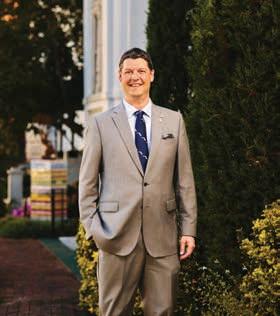
unique and special organization.”
Visitors can pop in for a cup of orange juice, admire the art and furnishings and just say hello. And the embassy recently added Gatorade to its refreshment list since it was developed at the University of Florida.
“We help bring people together in D.C.,” said Florida House Trustee Shannon Duncanson as she mingled in the garden outside the house during a recent social event for Florida congressional staffers. “It’s kind of like a home away from home. If you need a little piece of Florida, if you’re missing home, we have a great place right here.”
The reception was held during the federal shutdown, and many in attendance weren’t getting paid. Florida House offered food, a bar, birthday cakes honoring the Florida House itself and an opportunity for folks from Democratic and Republican offices to chat, share a laugh and swap stories and business cards.
It was a refreshing break from the finger-pointing, blame game and accusations that permeate politics these days. And it included a mix of folks beyond the congressional offices, including representatives from Florida businesses, people curious about Florida House, and even former Republican U.S. Rep. John Mica, who owns rental property in the neighborhood.
“It’s been a bipartisan and real Florida effort,” Mica said after chatting with a former staff member for former Dem-
ocratic U.S. Sen. Bill Nelson. “It’s a phenomenal place for Floridians to gather and entertain. We’ve had leaders, Democrats and Republicans, all hosting events here. At inauguration, the place is a gold mine, as it is year-round.”
Florida House is about Floridians, and as Weissert likes to say, future Floridians and Floridians at heart.
Weissert’s upstairs office has one of the best views in the city, facing west toward the Capitol dome and the Washington Monument. It’s spectacular at sunset.
No other state has replicated Florida’s embassy, and even if they wanted to, it would be hard to imagine an equal to what Florida has. The 19th century Victorian townhouse was purchased for $125,000 and opened in 1973. The value of the property now is easily 10 times that amount.
“Even if another state could pull together the idea of an embassy, and there’s a hundred reasons why that would be logistically difficult, none could have this kind of view,” Weissert said. “We are absolutely in the shadow of the Capitol. It is as close as you can get. This is the perfect spot for an organization like us.”
No tax money goes to its upkeep and management. Florida House is a non profit organization that relies on donations and a trust fund.
Florida House was the brainchild of Rhea Chiles, the late wife of Sen. And Gov. Lawton Chiles. Or, rather, it was inspired by their children. The family was driving around Washington and the kids admired the foreign embassies and wanted to see Florida’s embassy.
“We explained to them that the different states don’t have embassies,” Mrs. Chiles told The Associated Press in 2003. “They thought that was short shrift.”
These days, it would be among the most prime locations in the city, but at the time, Washington was far more overcome with crime and poverty.
One thing that hasn’t changed is that Florida has a place in our nation’s capital that welcomes everyone, resident or not.
“The thing that I love about drop by
visitors is that even if they’re not from Florida, it’s great being Florida’s embassy because everyone has a Florida story,”
Weissert said. “Oh, my aunt used to live in this place, we used to go to the beach in this place, we used to go to the theme park here.”
And he gets two questions a lot: Why does Florida have an embassy and what does a state embassy do?
“The answer to number one is because Florida’s the best state,” Weissert said. “The answer for number two is ‘Whatever we do is what state embassies do, because we’re the only one.”
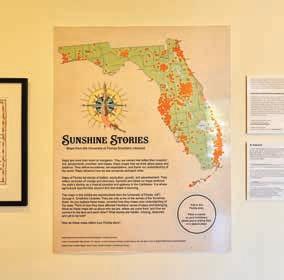
Top: Inside the Florida House, prominently displayed, is a portrait of former Florida First Lady Rhea Chiles, the late wife of former Gov. Lawton Chiles, who spearheaded the state embassy after inspiration from the couple’s children. Left: Robert Weissert serves as Director of Florida House. Right: Once you enter Florida House, it’s all about Florida. Politics are left on the sidewalk as visitors — Republicans and Democrats alike — are treated to a museum of Florida art and education.


Verra Mobility is committed to protecting students where it matters most: on their way to and from school.

WE KNOW WHAT YOU DID.

Meredith O’Rourke: She chose right, when she could have chosen left, and she’s never looked back
By Brendan Farrington
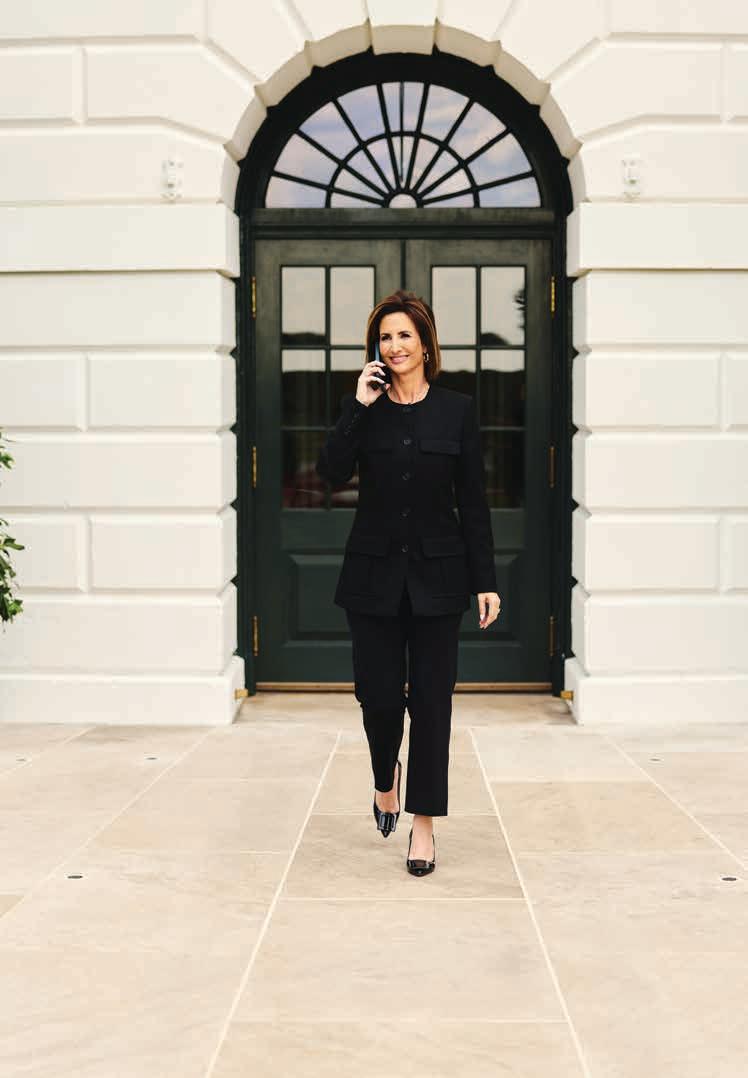
Meredith O’Rourke was a political science major at Virginia Commonwealth University when she faced a life-changing decision: take an internship with the state Republican Party or with the Democrats.
She wasn’t very involved in politics at the time, but money tipped the scales in favor of the GOP.
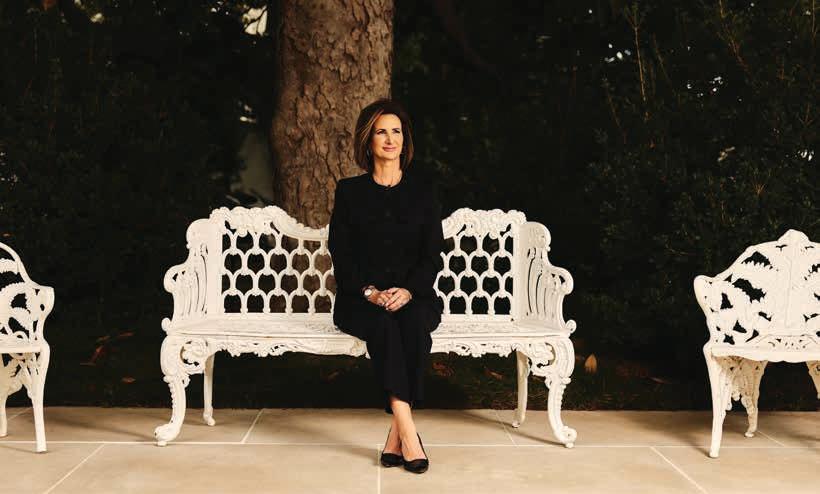
Years ago, a $2 an hour decision by the Virginia Republican Party led O’Rourke to choose an internship with them rather than the Virginia Democratic Party, which offered nothing for the same job.
“They paid me $40 a week. It was $2 an hour, so I took the job,” said O’Rourke, who clipped newspaper articles every morning, photocopied them and then faxed them to the state party chair. The Democrats’ offer was strictly volunteer work.
Now, O’Rourke is President Donald Trump’s national political finance director, heading the team that hauled in hundreds of millions of dollars to help win last year’s election. She continues to raise hundreds of millions more ahead of next year’s Midterm Elections.
When most people think of powerful Floridians in Trump’s inner circle, Attorney General Pam Bondi, Secretary of State Marco Rubio, Chief of Staff Susie Wiles and even Republican National Committee Chairman Joe Gruters come to mind.
O’Rourke, while a powerhouse among Florida’s political insiders, rarely gets a mention in Trump news coverage. And she prefers it that way. Her interview with INFLUENCE was the first on-the-record discussion she’s ever had with a reporter.
“In Trump world, that’s a great thing,” said Brian Ballard, a lobbyist and fundraiser who is close to Trump and has known O’Rourke for nearly three decades.
“She’s never been someone who needs attention — not only public at-
tention, but attention in the campaign apparatus. She knows her job, she does her job,” Ballard added. “She’s not the pilot of the plane; she’s the person who puts the fuel in the plane, and she’s always understood the difference.”
After college, O’Rourke was hired to raise money for the Virginia and South Carolina Republican parties. She recalls her parents helping her put stamps on fundraising invitations and organizing spaghetti dinners. She then moved to Washington and raised money for the RNC.
“I’ve had some really good mentors along the way at each of those stops,” O’Rourke said, adding that her boss at the South Carolina party is current Gov. Henry McMaster.
O’Rourke’s father retired as a lieutenant-colonel from the Air Force, where he was a B-52 bomber pilot in the Strategic Air Command. He moved to Palm Beach County and O’Rourke did, too, to be closer to her parents. She began building a career in Florida politics that included fundraising for then-Republican Gov. Charlie Crist, Republican Gov. Rick Scott and others.
“I’m first generation American. I was raised to value if someone were to give you 10 cents or $1 million,” O’Rourke said. “I look at fundraising the
same way. You respect them no matter who they are, no matter what level of support they’re providing. That’s funds coming out of their own pocket from their hard work.”
Of course, fundraising at her level is a far cry from when she was asking donors to max out donations for Crist at $500 a person — $250 for the Primary and $250 for the General Election — the state limit at the time.
Fundraising isn’t simply pulling up her contact list, making calls and asking for money.
“She’s the best in the business. I’ve dealt with them all over the past 30 years and she has a unique ability to ensure donors are not left in the dust after the contribution is made,” Ballard said.
Ballard said a lot of people don’t like being asked for money, and some donors don’t like being approached too aggressively.
But that’s not O’Rourke, he said.
“She walks into the room and people understand she means business. You don’t have to be tough. Some of them are aggressive and abrasive. She’s not. She’s charming and she’s confident,” Ballard said. “She is the most ethical and honorable person I’ve ever met and I think she’s at the top of her game because it’s incredibly well-deserved.”
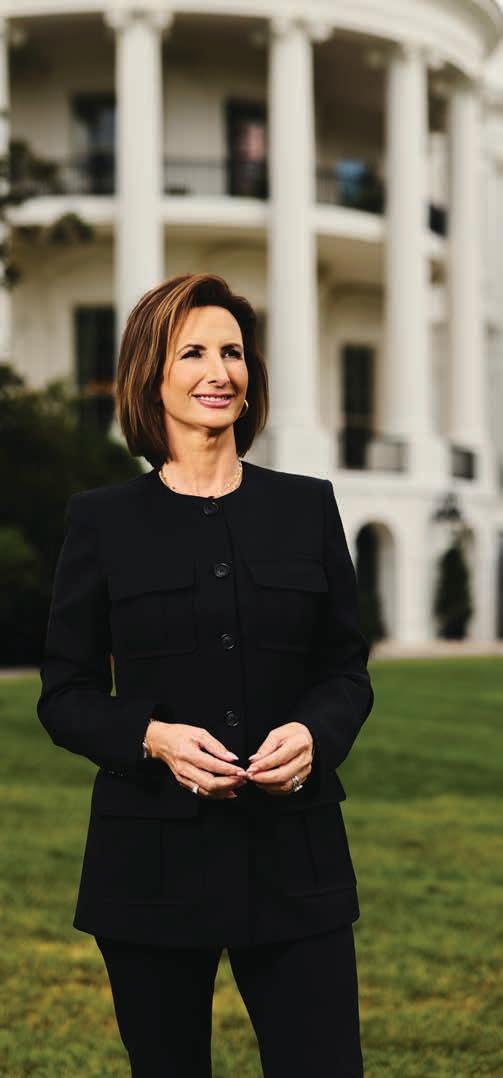
“ She’s the best in the business. I’ve dealt with them all over the past 30 years and she has a unique ability to ensure donors are not left in the dust after the contribution is made.”
– BRIAN BALLARD
These days, one of the rooms O’Rourke frequently walks into is the Oval Office. She also travels with the President when he’s at Mar-a-Lago or Trump’s Bedminister golf resort in New Jersey.
“I’ve seen Meredith with the President dozens of times, up close and personal. The relationship is incredibly powerful. He trusts her completely,” Ballard said.
The respect goes both ways.
“His true passion is saving our country. He is strong, but he’s also genuinely very, very kind,” O’Rourke said. “He’s also an incredible mentor. I’ve learned from him more so than anyone I’ve worked for. His work ethic is incredible. He works nonstop and his memory is by far the best memory of anyone I’ve ever worked for.”
O’Rourke splits time between Washington and Tallahassee, where she lives with her husband and teenage son. She also has a daughter in law school. With her busy schedule, during down time she likes quiet time at home with family.
Before accepting her current role, O’Rourke had a family meeting about the time commitment and responsibility. Her parents, husband and kids stood behind her.
“To us it’s like service, like serving your country. We, and I, feel like the President was sacrificing so much to save our country, that this was my duty to learn and help him.”
And just because she’s at the highest level of her profession, it doesn’t mean she isn’t surrounded by old Florida friends.
“There are times in the Oval Office where it almost seems surreal because you have people that you’ve worked with for decades that are in and out and operating at a level where they, too, are doing the best to serve the country, whether it’s Marco or Pam, Susie, (Deputy Chief of Staff) James Blair, it’s just incredible,” O’Rourke said.
It’s one thing to do business in the U.S. It’s another to be invested in its future. A future that can be thoughtful, prosperous, and smoke-free.
That’s why we don’t sell traditional cigarettes in the U.S. Instead, we’re innovating with purpose to offer legal-age adults who smoke a better path forward.
We’re invested in advancing science. Delivering innovative, science-backed, FDA-authorized smoke-free products.
We’re invested in responsibility. Committed to ensuring our products are for adults 21 and over with responsible marketing practices that help prevent youth access and appeal.
We’re invested in economic growth and high-skilled jobs. Creating thousands of direct and indirect jobs across the country. With $800+ million in announced projects in American manufacturing.*
We’re invested in community. Since 2022, via community and national partnerships, we’ve granted over $25 million to organizations supporting military veterans and families, disaster relief, and economic empowerment.
Together, as we build our smoke-free future, we’ll continue to invest in the industry, people, and opportunity of America.
Because we’re proud to be invested in America.
*See PMI press releases of July 16, 2024 (Aurora, CO) and August 27, 2024 (Owensboro, KY) for full details and forward-looking and cautionary statements.

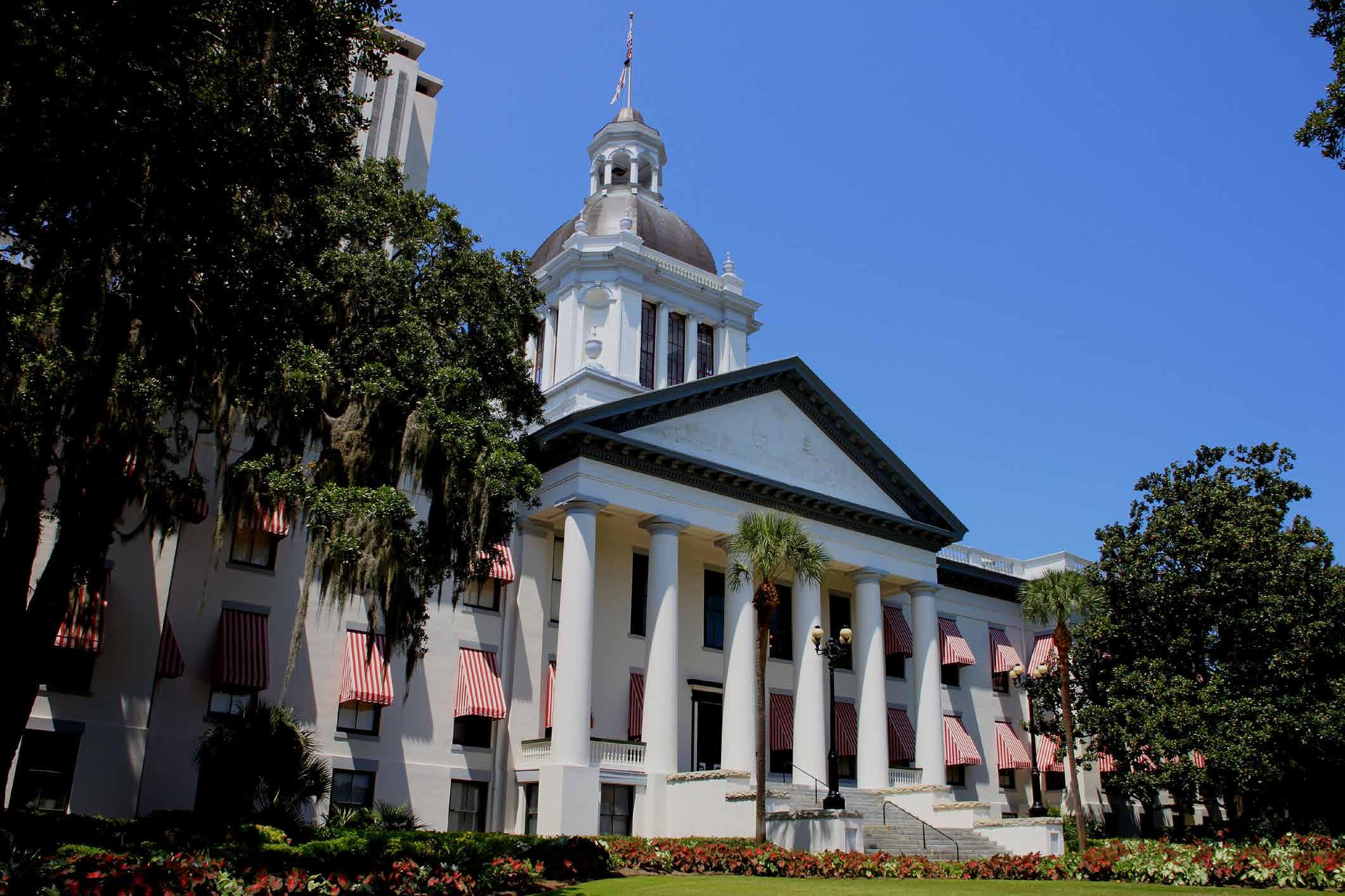

a

From a suite at the corner of Park and Monroe to a footprint stretching from Washington to Tel Aviv, Ballard Partners’ rise has been steady and strategic. In less than two decades, Ballard transformed from a Tallahassee powerhouse into a national brand, then an international player with reach across multiple continents and industries. What began as a local success story has become a case study in entrepreneurship, timing, talent and ambition. As the firm continues to evolve, its climb shows no signs of slowing. While the journey isn’t over, here’s a recap of the milestones so far.

Ballard Partners crossed the Potomac in early 2017, opening its first Washington, D.C. office just weeks after Donald Trump’s first inauguration. Founder Brian Ballard, already a familiar figure in Florida power circles, had served as the campaign’s State Finance Chair and inaugural Vice Chair. The new outpost, led by Syl Lukis with veterans Dan McFaul, Susie Wiles, and Otto Reich, gave the firm a front-row seat in a reshaped capital. Clients wanted access, and Ballard’s team was ready to deliver. The move was a turning point, providing the Tallahassee powerhouse a chance to prove itself in the big leagues.
Barely a year after planting roots in Washington, Ballard Partners looked across the ocean. In 2017, his firm joined forces with Alber & Geiger, a heavyweight lobbying shop with a footprint in Berlin, Brussels and London. The partnership linked Ballard Partners’ growing federal practice, flush with multimillion-dollar contracts, with Alber & Geiger’s European reach. Brian Ballard said the alliance was “a natural next step for our firms,” framing it as the firm’s first global alliance. It was an ambitious move, especially considering the ink on Ballard’s Tallyto-D.C. success story had barely dried.
In 2018, Ballard Partners moved squarely into international diplomacy. The Qatari government hired the firm for a one-year, $2.1 million engagement to help shape its outreach to U.S. policymakers and business leaders amid a Gulf region blockade. The deal, which came amid Ballard’s rapid D.C. growth — a period that included lobbying deals with Amazon, Uber and others — underscored its emergence as a global influence broker. With seemingly no learning curve, Ballard Partners was now advising nations as readily as corporations.
Early 2019 brought one of Ballard Partners’ most high-profile recruits yet: former Florida Attorney General Pam Bondi. Bondi came aboard to lead the firm’s new Corporate Regulatory Compliance practice, guiding major companies through data privacy, pharmaceutical oversight, and shifting federal rules. “With her unique perspective, experience and stellar reputation, there is no one better to launch and lead (this practice),” said Ballard, then deepening his Washington bench. While Bondi’s addition expanded the firm’s reach into corporate governance and federal policy at the time, it today reads as an early chess move — positioning Ballard with legal depth that, based on recent lobbying disclosures, is paying dividends today.
From Tallahassee to Tel Aviv, Ballard Partners planted its flag in the Middle East in 2020, opening a new office at the Rothschild Center. The expansion paired former Congressman Robert Wexler and ex–World Bank executive Oscar Chemerinski to guide clients navigating U.S.–Israel relations. Ballard at the time touted the hires for offering unmatched experience and international reach, helping American clients operate in Israel, and vice versa. Coming on the heels of Ballard’s 2018 Qatar engagement, the Tel Aviv office signaled the firm’s growing comfort on the world stage and marked the first Ballard-branded office abroad. It was still Florida’s most successful firm — 2019 delivered another No. 1 finish in state lobbying revenues — but it was now a truly global firm, mailing address and all.
When Washington flipped blue, many firms scrambled to adapt. Ballard Partners simply evolved. Early in the Biden era, it brought in key Democrats — including Tola Thompson, a longtime congressional aide, and John O’Hanlon, co-founder of a major Democratic lobbying firm — while promoting Clinton-era veteran James Rubin to global roles. The firm even took on advocacy for Freedom for All Americans and its push for the Equality Act. These moves shifted Ballard Partners’ reputation from Trumpworld powerhouse to a bipartisan mainstay. By blending in blue credentials, the firm maintained its influence through adaptation, a skill many Trump 1.0 powerhouses lacked.
In 2022, Dan McFaul was promoted to Managing Partner of Ballard Partners’ Washington office — marking the firm’s maturation from startup satellite to fully formed D.C. institution. “Dan’s extraordinary reputation in D.C. makes him the ideal choice to lead our firm in Washington,” said Ballard, praising McFaul’s decades of campaign and Capitol Hill experience. A veteran of more than 30 political races and a member of Trump’s presidential transition team, McFaul embodied the firm’s roots and reach with his background as a Florida campaign whiz, turned Capitol insider dating back to Joe Scarborough’s 1996 run. His promotion put a stable hand at the helm in Washington while the firm’s namesake continued building his empire.
In 2022, Ballard Partners stepped into a new arena: public conversation. The firm launched “13th & Park,” a podcast named for the streets anchoring its Tallahassee and Washington offices, co-hosted by partners Adam Goodman and Justin Sayfie. “Listeners will feel like they are eavesdropping on a private conversation between the savviest minds in the country,” Ballard said at the launch. Within two years, “13th & Park” had surpassed half a million subscribers and amassed more than three million views, signaling that the firm’s influence had expanded from the corridors of power into the digital media landscape where narratives are shaped.
In late 2022, Ballard Partners opened its first West Coast office in one of the nation’s toughest markets: Los Angeles. The move immediately made Ballard Partners a major player among a new class of clientele. Veteran government affairs professional Wendy Bruget was tapped to lead the office, joined by Jason Ziven, Tola Thompson, and Tom Cerra “Opening an office in Los Angeles will allow our firm’s exceptional partners to better serve the firm’s 500-plus clients,” Ballard said, calling the group a “dream team.” In addition to a Pacific coast foothold, the LA expansion allowed the firm to attract clients within the nation’s best-known export industries: entertainment and technology.
After years of headline-grabbing expansion, 2023 saw Ballard Partners stock the cupboard with new recruits who, rather than manning new offices, bolstered the ranks within the firm’s already substantial footprint. Former U.S. Rep. Jeff Miller launched a new Veterans Practice Group. Health-policy veteran Alison Anway stepped in to chair a national advisory division. Ex-LA councilmember Joe Buscaino, former Florida Commerce Secretary Dane Eagle, and ex-Jacksonville Mayor Lenny Curry each signed on as partners. Ballard closed the year again among Florida’s top-earning firms, too. In an era that was both post-Trump and post-pandemic, Ballard Partners didn’t waste its pent-up energy, it simply stuck to the fundamentals which had at that point fueled a half decade of success.
In August 2024, Ballard Partners formally launched the Ballard Global Alliance, transforming its growing roster of foreign partnerships into a coordinated worldwide network. The initiative debuted with exclusive strategic alliances linking Ballard to KyodoPR in Japan and SABI Strategy Group in the United Kingdom, both premier firms in their respective markets. The move gave Ballard’s clients access to top-tier public affairs expertise across both the Pacific and Atlantic, expanding its ability to serve multinational corporations and governments navigating cross-border policy. The alliance wasn’t Ballard’s first overseas collaboration, but it did mark a shift from expansion to integration, with the firm now operating as a global brand with a synchronized presence in key capitals from London to Tokyo.
Eight years after planting its flag in Washington, and fewer than 15 after the first Ballard Partners shingle was minted, the firm reached the summit. In the second quarter of 2025, Brian Ballard and the globe-spanning team of professionals working under his banner logged $20 million in lobbying income — more than any competitor nationwide, overtaking longtime leader Brownstein Hyatt. The surge to No. 1 was the result of a broad portfolio built through tireless ambition. From Palantir and JPMorgan Chase to Japan and Taiwan, Ballard Partners’ client sheet outstrips most firms’ wish lists. What began as the top shop in a hilly capital called Tallahassee had, in less than a decade, conquered the tallest peak in the lobbying world.
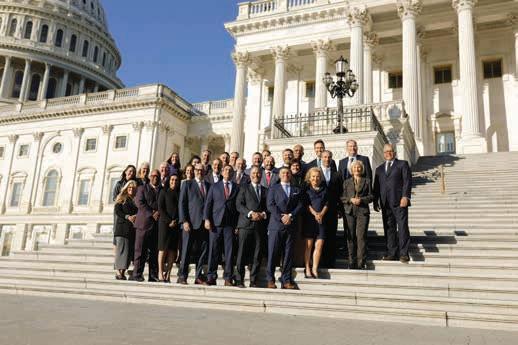






By Janelle Irwin Taylor
Q. Why did you decide to expand to DC?
A. We are fortunate to have many clients who recently moved or expanded to Washington, D.C. We were proud to run the race for Jimmy Patronis in CD-1, who is now the newest Congressman from Florida. We also represent many leaders in the national conservative movement — some on the legal front, such as the Oversight Project, which uncovered the (Joe) Biden AutoPen controversy. And,

we work for other leaders who took on national roles to be major leaders in the Midterm races all over the country in 2026. It is an exciting time to be in Washington with the (President Donald) Trump White House overturning woke ideologies and really fighting for the American citizen to be safer in our own communities, pay fewer taxes, and have more opportunities through economic growth.
A. The Trump victory last year was not just a win — it was a landslide. It opened the door to undoing woke progressive policies that were entrenched under Biden. It’s a personal privilege to be even a small part of restoring parental rights, ending critical race theory, DEI programs, rampant crime in major cities, and pushing to undo wrongful pardons signed by Biden’s AutoPen and much more.
My grandfather fought in the First Cavalry of the Army in World War II. I named my company Cavalry Strategies in his honor. I think about his perspective all the time. He would always complain about politics — like an old man would — and then point out that he had seen the world and America was unashamedly still the best.
We are the greatest country, the freest country. There’s almost no other place that a girl like me, not from wealth or power, could start her own business and make a living.
I love this country, and I believe we have to fight to make a difference here — we have to fight to keep the U.S. free from socialism and woke-ism. I believe God made us in His image and He is where freedom comes from. Our framers believed this same thing, by the way. If we keep to those fundamentals, we will keep being blessed as a nation. And that’s what makes me excited to go to work every day.
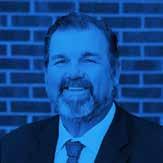






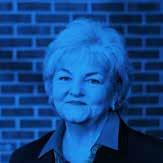









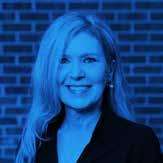

Your dedicated advocacy for our members, residents, and families ensures Florida remains the Gold Standard in long term care.
By Jacob Ogles

Continental Strategy, founded and led by Carlos Trujillo (standing, center), was an early and loyal ally to President Donald Trump, even when it was a potential liability.
Carlos Trujillo launched Continental Strategy in 2021, fresh off nearly three years as U.S. Ambassador to the Organization of American States under President Donald Trump
But at the time, loyalty to the recently ousted Commander in Chief didn’t open doors professionally.
“It might surprise people today, but if you stayed to the end, especially after Jan. 6, your employment options were limited,” Trujillo said.
Still, the former state Representative had policy chops, work experience in Tallahassee and Washington, and a network of global contacts. Thus, the legal and lobbying firm was born, first representing clients with state and federal interests.
Just five years later, the firm stands as one of the most prominent doing business in Washington, representing Fortune 500 companies and sovereign states. The week of this interview in October, Trujillo was busy arranging a meeting between six of Switzerland’s top business leaders and Trump himself.
From a Pennsylvania Avenue office building one block from the White House, Trujillo now leads a staff of 50 employees in the Washington office alone. Another 10 or so Continental Strategy lobbyists work full time in Tallahassee, while another 16 operate out of Miami. Now an international firm, the office also has three people working in Bolivia.
The connection with Trump, meanwhile, serves as valuable currency. The connection first began in 2015 when Trujillo became the first member of the Florida Legislature to endorse Trump, around the same time then-Florida Attorney General Pam Bondi offered the Republican presidential candidate her support well before most professional consultants saw him as anything more than a punchline.
But the fact that Trujillo stood by the President in the hard times, he suggests, is what has paid dividends for his firm now.
“Very few people could say that, after January 2021, they still kept in touch with them, or they went to visit them, or they spent time with them, or they of-
fered their help in any way they could,” Trujillo said. “Now, obviously, the good times are rolling, and everyone’s celebrating the win. But 2021, 2022 and the beginning of 2023 were some very, very difficult times for the Trump loyalists.”
Trujillo did indeed stay close. The legal side of his firm represented Trump in New York when New York Attorney General Letitia James brought a fraud lawsuit against Trump, his family and his business empire. In part, Trujillo said that was because he saw the start of the “weaponization” of the justice system against Trump, something that the administration veteran said started in 2017 with the Russian meddling investigation and continued through federal prosecutors raiding Mar-a-Lago in 2022 and ultimately indicting the former President.
with Trump has become a coveted thing in Washington — as has, frankly, a connection to the Sunshine State where the President’s second successful campaign was headquartered.
Walking through the Continental Strategy offices in Washington, photographs of lobbyists with leaders in the administration adorn the walls, as does a framed Wall Street Journal article with the headline: “In Trump’s Washington, It Pays to Be From Florida,” with an inset photograph of Trujillo noting his role in the first Trump administration.
And Trujillo isn’t the only member of the Continental team close with members of the current administration. Managing Partner Alberto Martinez served for years as Secretary of State Marco Rubio’s U.S. Senate Chief of Staff.
lot of the big commodities brokers, upstream suppliers are in Florida.”
Of the 150 or so major clients for the firm, about three-quarters, Trujillo said, are global companies. Many are focused on tariff policy and international trade deals, and Continental boasts senior counsel George Bogden, former Executive Director of the Office of Trade Relations, as one of Washington’s top experts in the field. Many clients want information about accommodations that can be made to existing tariff rules, but Trujillo said he has also worked with companies on how to avoid the costs with cheaper onshoring and shortening of supply chains.
But what will the level of connections and expertise mean for the firm when Trump’s time in Washington ends — or,
“We represent three of the largest banking families in Central America. All of them have correspondent banking relationships in Florida. A lot of the big commodities brokers, upstream suppliers are in Florida.” – Carlos Trujillo
“Some of the most terrible people in the history of the United States have not been treated this way. And it’s coordinated and it’s orchestrated,” Trujillo said, visibly disgusted by Trump’s treatment. “My parents escaped communist Cuba, and you hear these stories of weaponization of government. You hear these stories of public executions and sham trials and everything else. And you live your entire life in the United States thinking this will never happen here. This is the United States of America. This is the greatest country on Earth.
“Honestly, there were points here in 2022 and 2023 saying this could definitely happen, and it’s happening right now. And if they’re able to destroy this person who has not only a massive following, but also personal resources in order to defend themselves, what could they do to me and my family?”
Of course, Trump wasn’t executed, and was able in 2024 to return to power in a nearly unprecedented comeback campaign. Since then, a relationship
Among the firm’s other partners, Craig Carbone served in the same capacity for U.S. Sen. Rick Scott Alex Garcia originally hails from Florida and worked on Trump’s Florida and Michigan campaigns. Partner John Barsa, who led the U.S. Agency for International Development for part of Trump’s first term, worked for the late U.S. Rep. Lincoln Díaz-Balart, a South Florida fixture for decades. Danny Gomez earned his bachelor’s degree from Florida International University.
The many Sunshine State connections aid the firm not only with Trump, but with the disproportionate number of White House staffers, Cabinet Secretaries and agency heads who started their own careers in Florida. On top of that, South Florida commerce increasingly plays a key role in the global economy and any connections to the U.S.
“We represent three of the largest banking families in Central America. All of them have correspondent banking relationships in Florida,” Trujillo said. “A
as could happen sooner, his power level simply loosens? Trujillo founded the firm when Democrat Joe Biden occupied the Oval Office and still found work. And he said his tenure in the first administration gave him valuable experience working with a Democratic Congress.
As he offers advice to clients on policies made today, it’s done with the awareness that the legislative branch may be inclined to exert itself over more matters after the 2026 Midterms.
“I personally lived in oversight under Democratic control,” he said. “Those who haven’t experienced oversight kind of take it for granted and don’t understand that, No. 1, it’s real, No. 2, it is very, very cumbersome, and No. 3, if you’re on the lobbying side, it’s very, very expensive to defend yourself in oversight. I think it’s just something that we take into account in the decisions we’ve made over the last year in advising our clients and the decisions we make every day.”


Florida Poly is a dynamic institution designed to aggressively push the limits of engineering education. With industry-driven programs, leading faculty, and cuttingedge facilities, the University is building a strong pipeline of in-demand, high-skilled STEM professionals prepared to innovate and take on the high-tech challenges of tomorrow. The state’s only all-STEM university, Florida Poly’s graduates earn an average of $55,300 one year after graduation, the highest among all state universities.

By Jacob Ogles
Ridesharing unearthed a whole new course of public policy challenges, and Javier Correoso, known to most as Javi, has helped Uber navigate that for a decade. Now, the work has led the veteran Florida consultant from Miami to Washington, D.C.
Uber in January promoted Correoso to Head of Public Affairs for the company, a move that comes as President Donald Trump taxies many Florida figures into the halls of power. While he will remain Uber’s public affairs director for the South, the new role means he’s moving his family from their South Florida home to Northern Virginia.
The new direction comes as Uber shifts its own attention to mapping national and even international regulatory environments.
“As the company has also become more global, there have been issues that interact with our nation’s capital,” Correoso said.
His personal background makes Correoso a natural choice. The former Republican Party of Miami-Dade executive director boasts a long relationship with Secretary of State Marco Rubio, serving as a senior advisor to the Miami Republican’s first U.S. Senate campaign and before that in Tallahassee on his legislative staff when Rubio served as Florida House Speaker. Correoso worked for Rubio’s 2016 presidential campaign as well, and joined Uber after.
But most of Correoso’s roles since have involved working with state lawmakers in major policy testing grounds like Florida, Texas and the Carolinas. That means he has connections and a
reputation among policymakers and regulators throughout the region. And much of Uber’s international work has required building relationships with economic agencies.
“People assume that my ties are closest to the State Department based on my relationship with the Secretary of State, but our issues really don’t go through the Secretary of State. We’re not involved in foreign policy-making or some of those complex foreign policy decisions that the administration is making,” Correoso said.
“Our interaction in terms of foreign affairs with the administration has been more so through the Commerce Departments or the Treasury Departments, or the U.S. Trade Representative. So, there have been multiple high-profile negotiations or trade negotiations that have involved American tech companies, for example. When it comes to some of those issues that impact Uber, we’ve been very closely engaged with the administration, particularly those three departments.”
Uber’s work has significantly evolved during Correoso’s time with the company. He notes Uber Eats didn’t exist as a concept back in the days of negotiating local ordinances on allowing Uber pickups in cities with taxi programs. Now, food delivery constitutes half of Uber’s revenue.
When it comes to domestic policy, Correoso has his own history on the Hill. In addition to Rubio, he worked with former U.S. Rep. David Rivera before making the jump to the lobby corps.
For much of the year, Correoso has worked on Uber’s national and global
policy while splitting time between Florida and Washington — while keeping track of policy discussions in Atlanta, Austin, Raleigh, Tallahassee and anywhere in the South where rideshare policies are considered.
“This is probably the craziest six months I’ve had since political campaigns in the early 2000s,” he said. “My hours have increased. I had to do a lot more reading. I’ve had to delegate a bit more than I’ve had to in the past. But thankfully, we’ve put a great team together that’s made it very easy.”
On the workfront, life may be a little easier with Correoso’s family move to the suburbs of D.C. His wife, Amy, was hunting for the best Virginia schools for their children when he spoke with Influence.
“She’s really the rockstar right now,” he said. “It’s been tough, I’m not gonna lie. It’s a big sacrifice, and not just for myself.”
For the moment, the Correosos are considering this deployment to the nation’s capital as a “tour of duty.” It’s one that Correoso may not have pursued if there wasn’t a Republican administration in place, installing close allies. He imagines a world with a Democratic President Kamala Harris while Republicans control the Senate or House would not feel as welcoming.
But then, Correoso also notes that rideshare policy isn’t partisan, and Uber for the last decade enjoyed, for the most part, the support of a public eager for transportation alternatives.
“A lot of the issues that we’re engaged on are overwhelmingly popular with the electorate,” he said.


If you need help hanging pictures or mounting a TV, look elsewhere.
But if you need to bring strategy and clarity to the most complex issues, we might know a guy.
Consensus Communications congratulates Ryan Houck for being recognized as one of Florida’s “Great Communicators” by Influence Magazine.

Leonardo Helicopters, a global leader in aerospace, defense, and security, is expanding its U.S. footprint with a major presence in Northwest Florida. The company opened its new Florida Support Center at Whiting Aviation Park in Santa Rosa County on Sept. 18.
The milestone represents the culmination of years of strategic planning, economic development, and interna tional collaboration.
Santa Rosa County began laying the groundwork for Whiting Aviation Park in 2019, envisioning a site that could attract world-class aerospace partners and deliver long-term economic opportunity to Northwest Florida. Located adjacent to Naval Air Station Whiting Field, the park features a newly completed taxiway that connects the military airfield directly to the civilian aviation campus — a rare and highly marketable asset in the aerospace sector.

istration’s commitment to aerospace expansion and rural job creation in Florida.
Leonardo broke ground on the $65 million facility in July 2023, with plans to offer maintenance, repair, and overhaul (MRO) services, as well as training and logistical support for military and commercial customers. With initial operations expected to bring high-skill jobs to the region, the project is part of Leonardo’s broader U.S. growth strategy, complementing its longstanding operations in Philadelphia.
Helping move the project forward across state and federal lines were Cissy Proctor, Managing Partner at LSN Partners in Tallahassee, and Tom Quinn, Managing Partner of LSN’s Washington, D.C. office.
Proctor, former Executive Director for the Florida De-
During that same trip, the state also announced the upcoming opening of its Florida Select Milan office, signaling Florida’s intent to deepen international investment and trade partnerships, particularly in the aviation, space, and advanced manufacturing sectors.
As part of the trade mission, the DeSantis administration encouraged Leonardo to explore partnerships with Florida universities and technology companies to drive innovation and workforce training — a vision that aligns closely with the county’s and LSN’s efforts on the ground.
The Whiting project is more than a ribbon-cutting; it’s a blueprint for how long-term local vision, paired with coordinated action across state and federal levels, can drive meaningful, high-impact economic growth.




Connect with us anytime, anywhere: flmedical.org
The Florida Medical Association is Florida’s premier medical professional association and the most influential advocate for doctors in the Sunshine State. We help physicians practice medicine so that they can deliver high quality patient care that keeps Floridians healthy, protects the public health, and enhances the quality of life in our communities.
F l o r i d a I n t e r n a t i o n a l U n i v e r s i t y i s M i a m i ’ s P r e e m i n e n t S t a t e R e s e a r c h U n i v e r s i t y , d e l i v e r i n g
r e s u l t s f o r F l o r i d a i n W a s h i n g t o n , D C W i t h t h e s u p p o r t o f t h e F l o r i d a c o n g r e s s i o n a l d e l e g a t i o n
a n d f e d e r a l p a r t n e r s , M i a m i ’ s T o p - 5 0 , R 1 P u b l i c R e s e a r c h U n i v e r s i t y i s a d v a n c i n g c r i t i c a l r e s e a r c h
i n c h r o n i c d i s e a s e , e n v i r o n m e n t a l r e s i l i e n c e , a n d d e f e n s e t e c h n o l o g i e s .
O u r o n e - o f - a - k i n d c e n t e r i n W a s h i n g t o n , D . C . o f f e r s F I U s t u d e n t s t h e o p p o r t u n i t y t o g a i n h a n d s - on
e x p e r i e n c e t a c k l i n g n a t i o n a l c h a l l e n g e s a n d a l l o w s o u r f a c u l t y t o c o n d u c t r e s e a r c h a n d b r i n g
t o g e t h e r l e a d e r s t o e n g a g e i n m e a n i n g f u l a n d s i g n i f i c a n t c o n v e r s a t i o n s t h a t s h a p e p u b l i c p o l i c y .
O u r p a r t n e r s h a v e a p l a c e t o c o m e t o g e t h e r t o h o s t s e m i n a r s , c o n f e r e n c e s , e v e n t s , a n d m o r e .
A n d e v e r y s t e p o f t h e w a y , w e b r i n g t h e m a g i c o f M i a m i t o o u r n a t i o n ’ s c a p i t a l .



E x p e r i e n c e F I U i n D . C . o n C a p i t o l H i l l
By Peter Schorsch
Before much of Washington has even stirred, the pace inside TSG Advocates is already at full tilt. Calls from Miami are being patched through to the Hill, policy memos are flying across inboxes, and early whispers of regulatory shifts are being dissected before most of the city has poured its first coffee.
That rhythm is not performative, it is survival. In an era when policies can appear via executive action overnight and congressional alliances shift with the news cycle, the margin for error is vanishingly small. TSG Advocates, founded by Chase Kroll, Daniel Diaz-Balart, and Kevin Hofmann, has grown into one of the fastest-rising firms in Washington by pairing speed with rigor: a team that can pivot quickly without sacrificing strategy.
We sat down with the partners to unpack what it means to operate in this climate, where their model diverges from K Street orthodoxy, and how they are navigating the currents of a hyperactive administration.
Q: When TSG Advocates was founded, what gap did you see in the lobbying world that you wanted to fill?
Chase Kroll: Washington has no short-
age of firms with résumés and rolodexes, but what we felt was missing was velocity. The Southern Group built its reputation in the Southeast on decisive action and measurable outcomes, that culture of speed and precision. We saw an opportunity to translate that into the federal arena, where too often the instinct is deliberation over action.
Daniel Diaz-Balart: I believe what sets us apart is our ability to anticipate policy direction and trends, thereby reducing the likelihood of abrupt shocks for our clients. Our model is about coupling deep policy knowledge with execution at tempo. That combination felt rare in the market.
Q: How is lobbying in Washington today different compared to past administrations?
Kevin Hofmann: The pace is unforgiving. This administration has leaned on executive action and regulatory guidance in ways that bypass the slower churn of legislation. That means entire sectors can wake up to new rules overnight. If you are not anticipating those shifts, you are already behind.
Daniel Diaz-Balart: That’s right. One day the focus is supply chain resilience,
the next day it’s American energy dominance or AI oversight. And sometimes, it’s all of the above in a single day. This reality means that anticipation, preparation, and communication are key.
Q: How do you keep clients ahead of the curve in this environment?
Daniel Diaz-Balart: Communication has to be constant, but more importantly, it has to be predictive. Anyone can tell you what just happened. The value is in explaining what will happen next week, or how today’s developments signal tomorrow’s regulatory framework.
Chase Kroll: Patterns matter. This administration has governing tells, themes that repeat. If you can read those signals early, you can position clients to act strategically instead of reactively. That is the edge. And part of our ability to see three moves ahead comes from the depth of our bench. Kaitlyn Roberts worked in the White House during President (Donald) Trump’s first administration and brings an instinctive understanding of executive branch decision-making. Brian Darling has held senior roles for five U.S. Senators, which gives him unmatched fluency in Senate procedure. Beau Roth-

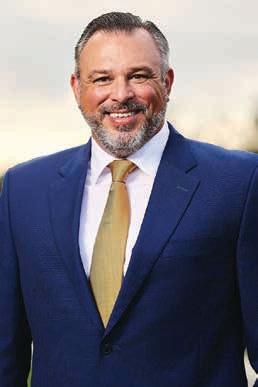
schild served as Chief of Staff for a Congressman and practically wrote the book on House processes and procedures. Nick Raineri served as Senior Advisor at the Office of the Director of National Intelligence, which is invaluable at a moment when national security is not just a priority but a lens through which nearly every policy is viewed. This team allows us to anticipate rather than react.
Q: Can you share an example of a client engagement that highlights your approach?
Chase Kroll: Trade policy is the perfect case study. In our work with Volkswagen, the stakes are not limited to one tariff line. They span U.S.–Europe trade relations, agency interpretations, and congressional oversight. You cannot treat it as a single-issue problem. You need a layered strategy that runs through every branch of government at once.
Kevin Hofmann: And the key is to avoid a whack-a-mole approach. We do not just solve today’s tariff issue. We structure a strategy that anticipates how trade realignment with China, transatlantic regulatory differences, and domestic industrial policy will intersect over the
next 18 months. That is how you stay a step ahead of both Washington and the global market.
Q: Are there specific practice areas where clients are seeking more support under this administration?
Daniel Diaz-Balart: We are seeing enormous demand in areas where regulatory action has become the primary policy tool, especially in energy, AI and tech oversight, and trade. These are spaces where rules can change quickly and unpredictably.
Kevin Hofmann: Which is why we have expanded aggressively. The depth of our senior hires means we can manage overlapping challenges without missing a beat. It is the cohesion of that group that enables us to cover multiple fronts simultaneously while staying sharply aligned with client goals.
Q: How do you see TSG Advocates evolving over the next year?
Daniel Diaz-Balart: The growth trajectory is steep, but deliberate. Our focus is on expanding the federal practice without diluting the client-first, results-driven ethos that defines us. We are building

for the long haul, and we are extremely optimistic about what the future holds for our firm.
Chase Kroll: Agreed. The firm is designed for scale, but also for resilience. When you combine seasoned policy hands with a Florida-bred culture of action, you get a model that is hard to replicate in a city that often defaults to caution. That is how we intend to surprise even veteran players on the Hill.
Closing the Loop on Washington’s Clock
As night falls over the Capitol dome, the pace inside TSG does not slow so much as reset. Strategies are refined, intel recalibrated, tomorrow’s plays mapped out. For Kroll, Diaz-Balart, and Hofmann, each day ends not with closure but with anticipation, the next round already in motion.
In a Washington defined by volatility, TSG Advocates has bet on cohesion, speed, and foresight. And so far, the bet appears to be paying off.
From left: Chase Kroll, Kevin Hofman, and Daniel Diaz Ballart




By Jacob Ogles
When President Donald Trump made his return to the White House, moving trucks deployed not from a New York penthouse but from his Mar-a-Lago mansion in Palm Beach. In Trump 2.0, a Florida man took over Washington, and he didn’t come alone. The Commander-in-Chief positioned Sunshine State figures throughout his administration, sending former Florida Attorney General Pam Bondi to Main Justice, U.S. Sen. Marco Rubio to Foggy Bottom and Jacksonville political consultant Susie Wiles to run the White House itself. It didn’t stop at the headline positions. From Cabinet level posts to rank agency staff in rank agency posts, Floridians filled positions at all levels of government.
“Floridians overpopulate the West Wing in a really big way,” Wiles, Trump’s Chief of Staff, told a GOP gathering in Orlando this Summer. And as the citrus-tinged scent of opportunity filled the beltway, a rush of experienced Tallahassee lobbyists opened Washington shops, eager to bring relationships cultivated on Apalachee Parkway and sow the rewards
on K Street.
“It’s a unique time where people who worked in state government in Florida are in prominent positions in the White House and all the federal agencies,” lobbyist Nick Iarossi said. “If you ever thought of making a leap to federal practice, this is how you do it. If there is a time to make a leap to D.C., there is not
“It’s temporary star power. Was there Texas star power under George Bush? Would there be Ohio star power with JD Vance? It’s not as much of an anomaly as it looks. But it may be more than usual given how many Florida people
just say, we’re
a better time to do it than now.”
Iarossi, a Florida State University graduate who co-founded Capital City Consulting in Tallahassee in 2003, “dabbled” in lobbying on Capitol Hill over two decades in the influence industry. But in November, he started moonlighting as Managing Director for BRG Group’s Washington office. While he still runs CCC in Florida, he now spends a quarter of his professional time in the District of Columbia.
He arrived in town to familiar faces — and brought an increasingly valuable Florida pedigree. Just as Texas ran much of Washington through the George H.W. and George W. Bush administrations, and Chicago’s political class became the cool crowd through Barack Obama’s two terms, the second Trump term changed an 850 area code into reputational capital.
“It’s temporary star power,” quips Bill Rubin, founder of Rubin, Turnbull & Associates, a Tallahassee firm that opened its first Washington office in January. “Was there Texas star power under George Bush? Would there be Ohio star power with JD Vance? It’s not as much of an anomaly as it looks. But it may be more than usual given how many Florida people there are in the administration. The President and the Chief of Staff live in Florida. Key deputies live in Florida. I’d just say, we’re lucky we came from Florida.”
The level of influence feels more striking considering it marks a return trip to power for Trump, and Florida didn’t overtake D.C. with as much gusto after the election in 2016. But in the tense intervening Olympiad between Trump’s boycott of President Joe Biden’s inauguration and the Republican returning to Washington for his second swearing-in, the ousted President held court in Palm Beach, attracting political guests and dispensing endorsements from Mar-a-Lago instead of Manhattan. He built a campaign team headed by Floridians Wiles and James Blair. Relationships with existing politicos such as Chris LaCivita, Tony Fabrizio and Joe Gruters grew stronger. All would benefit when a campaign Wiles called the “greatest comeback in political history” put Trump back in the Oval Office.
That’s an entirely different route to power than Trump took in 2016, when his entire public identity remained tied to the Five Boroughs. Lobbyist Dan McFaul, who served on the Trump transition team ahead of his first term, reminds of the pa-
rade of figures interviewed and vetted in Trump Tower in New York City in 2016. This time, any such meetings took place in Palm Beach County, if not in D.C. itself. “He has been much more of a Floridian President than in the first term,” said McFaul, now managing director of Ballard Partners’ Washington office.
The clamor to find influence in the administration played out differently as well. Few Florida firms rushed to D.C. in 2017. But among the few was Ballard Partners. Founded by Brian Ballard, the Tallahassee firm enjoyed a relationship with Trump from helping the New York developer acquire Mar-a-Lago years prior. The firm later helped navigate approval for Trump National Doral in Miami. After Trump’s election, the firm opened a three-person office in D.C., bringing on McFaul as a first outside hire.
McFaul notes so few people in 2016 expected Trump to defeat Hillary Clinton that most lobbying shops almost exclusively had fostered Democratic connections. That made Ballard Partners one of the few in Washington with any connection to the fledgling administration.
“K Street tends to hedge its bets, but really, in 2016, everyone went all in for Hillary,” he recalls. “They all saw Trump as a big outsider and reality TV personality. But as soon as the election was called, that changed.”
Word quickly spread that Ballard was among Trump’s few friends in the lobbying world, and the firm rapidly expanded its list of clients from some Florida customers such as U.S. Sugar and NextEra/ Florida Power & Light, to global brands the likes of Amazon. In between Trump administrations, Ballard built out a roster of Democratic lobbyists, many of them still Florida-connected folks like Tola Thompson, a Chief of Staff to former U.S. Rep. Al Lawson, keeping the firm in business during the Biden years. With Trump back in town, the firm has quickly reascended to being a top revenue reporter in Washington.
For long-time D.C. firms with Florida ties, the new era brings a boon after years of building a brand.
Omar Franco, head of Becker & Poliakoff’s federal lobbying practice, opened his firm’s shop about 15 years ago after time on the Hill as U.S. Rep. Mario DíazBalart’s Chief of Staff. He still runs the office with Democrat Clarence Williams, former U.S. Rep. Kendrick Meek’s longtime Chief of Staff, meaning bipartisan Florida DNA runs strong at the D.C. branch of the Fort Lauderdale-headquartered firm. From the branch’s early days,
“Certainly with prominent Florida leaders in senior positions at the White House, State Department and across federal agencies (not to mention the outsized influence on Capitol Hill), Florida’s influence has only grown in Washington, and it’s a reflection of the strength of the Republican Party in Florida and the fact that it’s become the epicenter of national politics.” — Chris Hartline
the list of clients had more Sunshine State presence, with clients including Hialeah and Cape Coral city governments.
“I was one of the first Florida guys that a lot of people at the state knew and worked with, and because of my having worked 10 years in the state Legislature and lobbied down there, I think that there was a lot of appetite,” Franco recalled. “A lot of the firms that represented folks in Florida in D.C. weren’t really from Florida back in the day 20 years ago. There was definitely that appetite to
talk to a native Floridian who had driven up I-95 a thousand times.”
Today, that Florida heritage makes a difference to clients around the world. Walking around Franco’s D.C. office, he points to the Everglades conference room, decorated with large prints of Florida’s most famous national park. Becker worked for years securing funding to restore the River of Grass, so the images show real-world benefits of Becker’s work. But the photographs also now introduce the firm’s Florida roots upfront.
“We have developed many Florida-based clients before and after the office opened. But candidly, the entire client roster wants to know what is happening in Florida and how that’s going to affect Washington, D.C. Many states have respective influence, and it’s so beautiful to see Florida having its time right now.” — Melissa Kuipers Blake
Every new administration presents an opportunity for those in The Process to re-evaluate mission and goals. The Florida-to-D.C. pipeline prompted many to consider a major career change.
Danny Díaz-Balart for years ran a small lobbying firm with his father, former U.S. Rep. Lincoln Díaz-Balart. While located in Miami, Díaz-Balart Law focused on federal work, utilizing a knowledge of Congressional procedures and a network the elder Díaz-Balart developed over nearly two decades in the House.
The younger Díaz-Balart watched his father as a lawmaker, then was mentored as a lobbyist. But the ex-Congressman fell ill last year, forcing him into retirement. In March, Lincoln died at age 70.
For the younger Díaz-Balart, the metamorphosis of the D.C. lobby corps unfolded during an already emotional life change. In February, The Southern Group announced the launch of TSG Advocates, a federal initiative from the Tallahassee-based firm that for years focused on state government in the South.
“I’ve obviously known The Southern Group for years for its reputation in Florida and the entire Southeast,” he said. “I’ve had friends there for years, and was informed they were opening a Washington, D.C. office in January of this year. I was fortunate enough to become a founding partner at that office. For me, it was a blessing that came at the right time, and a tremendous opportunity, in light of my personal circumstances.”
Throughout D.C., firms discuss the value of any such symbols to verify lobbyists’ ties to the Florida peninsula. Iarossi says it’s just a simple matter of Florida professionals knowing the right people right now.
“The stars are aligned with relationships,” Iarossi said. “Certainly, there are relationships in the West Wing, but also through the Department of State, with Marco Rubio as Secretary of State and head of the National Security Council, with Pam Bondi at the Department of Justice and with several Florida people high up in her agency. But there are prominent Florida folks at the Department of Interior and Homeland Security. I have good relationships with peo-
ple at FEMA (the Federal Emergency Management Agency).”
Chris Hartline, U.S. Sen. Rick Scott’s former Communications Director, left the Hill to become a Principal at Pathway Public Affairs in 2023. He has seen Florida’s sway shift significantly.
“Certainly with prominent Florida leaders in senior positions at the White House, State Department and across federal agencies (not to mention the outsized influence on Capitol Hill), Florida’s influence has only grown in Washington,” he said. “And it’s a reflection of the strength of the Republican Party in Florida and the fact that it’s become the epicenter of national politics.”
While still based in Miami, DíazBalart is now making three or so trips to Washington each month. And he’s not the only Florida professional following a new career track. Craig Carbone, longtime Chief of Staff, joined Continental Strategy as a partner in its D.C. office. That meant ending more than a decade working either in Scott’s Senatorial office or, before that, working for the Naples Republican in the Governor’s mansion.
“Those years taught me something that has shaped every step of my career: Relationships matter. Sen. Scott showed, time and again, that meaningful connections and persistence are what turn good ideas into real results,” Díaz-Balart said. “The lessons I learned from him — hard work, relationship-building and results-driven focus — are invaluable to anyone lucky enough to be part of his extended team. To many of us, Sen. Scott has been more than a leader; he’s been a mentor and father figure whose example continues to guide our paths forward.”
Meanwhile, Continental saw its own client list grow. That’s partially thanks
to adding partners with ties on the Hill and in the administration, and partially thanks to ties that date back to the first Trump term. Carlos Trujillo served as Trump’s Ambassador to the Organization of American States, but before that was the first Florida State Representative to endorse Trump for President. Carbone says the firm looked like the right place to land for him.
“Today, at Continental Strategy, I carry those same principles into my work during an extraordinary moment in Washington. Under President Trump’s leadership, results are once again at the forefront; values rooted in his business background are deeply familiar to our team. It’s an environment that rewards initiative and vision, and that’s exactly the culture we have under Carlos Trujillo’s leadership,” Carbone said. “I’m grateful to be surrounded by exceptional colleagues who share the same drive for excellence. The foundation laid by mentors like Sen. Scott continues to inspire everything we do at Continental Strategy, where relationships, results, and the relentless pursuit of achievements define our work every day.”
Firms, no matter how long they have operated in D.C., hunger for talent with ties to the Sunshine State, whether on the Hill or in the White House. Wiles, a former Ballard Partners lobbyist, may be the only member of her family working inside the administration. But she has two daughters now working for Florida firms with new D.C. offices. Karoline Wiles serves as Vice President of Federal Affairs at Rubin Turnbull, while Katie Wiles works as a Director at Continental Strategy.
And the lobbying opportunities being created by the Florida takeover of D.C. aren’t only in Washington. Brownstein Hyatt Farber Schreck, a firm doing business in the national capital for the last 30 years, only operated in states selectively. Melissa Kuipers Blake, a shareholder for the firm, pushed for the opening of a Florida office for years. She said Florida’s recently attained political clout made that a reality this year. The group expanded a strategic partnership with Rubin Turnbull and opened its first Tampa office in January, managed by Kuipers Blake in a homecoming of sorts for the University of Miami Law School graduate.
“We have developed many Florida-based clients before and after the office opened,” she said.
“But candidly, the entire client roster wants to know what is happening in Florida and how that’s going to affect Washington, D.C. Many states have respective influence, and it’s so beautiful to see
Florida having its time right now.”
THE NEW WASHINGTON
Lobbyists rushing to Washington often cite longstanding relationships with Florida lawmakers currently populating the Hill. Of Florida’s 28 U.S. House Representatives, 14 previously served in the Florida Legislature, and many who didn’t held other titles in Tallahassee before entering federal office. U.S. Rep. Laurel Lee was Florida’s Secretary of State before her 2022 election.
Both U.S. Sen. Ashley Moody and U.S. Rep. Jimmy Patronis served on Florida’s Cabinet less than a year ago and Scott served as Florida Governor for eight years.
Certainly, Carbone adds vital connections to Capitol Hill for Continental, just as Díaz-Balart, whose uncle Mario is now dean of Florida’s congressional delegation, has for the administration-connected Ballard. The most experienced lobbyists with Florida roots like to remind lawmakers that they knew their names and numbers back when the word “state” appeared before their titles.
But the story on lobbying in Trump’s second term undoubtedly has been about Washington becoming more centered around executive activity than the legislative branch. Several lobbyists say Trump calls the shots in Washington now, and the House follows his lead. That seemed especially clear during a record shutdown that spanned all of October and the first part of November, when despite workers receiving no pay, agency leaders remained on the job as members of the U.S. House spent weeks at home.
“The government has been shut down for 25, 26, 27 days now and no one’s noticed,” Trujillo said in late October. “The cadence and the pace of Congress, of Washington, is as breakneck as ever.”
Additionally, executive actions like setting tariffs and deciding who gets accommodations regarding them put administration-side lobbying in greater demand than ever.
Of course, many of Florida’s experienced legislative lobbyists followed contacts from one branch of government to another. Rubin notes that when Rubio resigned his Senate seat to lead the State Department, he brought six-year Chief of Staff Mike Needham with him. Some agency staffers, like Education Department Chief of Staff Amber Mariano Davis, started their political careers as members of the Florida Legislature. Many lobbyists, even those whose careers began in the Florida State Capitol, boast connections in both the administration and on the Hill.
But the experienced lawmakers also note that for those who hope to make a career on the Potomac, the only constant in Washington remains the uncertain future.
“Congress’ role, especially in the first 10 or 11 months in this Administration, has been much further diminished. I think that’ll change,” said Trujillo, who acknowledges the Midterm cycle may well be unkind to Republicans in power. “I think Congress will try to take a much more active and proactive role. We’ll see what happens in the Midterms. I lived under oversight for two years of the last Trump administration, so I remember those times very well. We’ll see what happens.”
Franco remains excited by the number of Florida cohorts now calling themselves neighbors in D.C. But he knows the rapid pace of shop openings in town comes with risks.
“It does feel like some of them, they’re building the airplane as it’s taking off. I don’t know if that allows you to really be able to just do building blocks one at a time,” he said. “You’re kind of just seeing gaps and you’re having to fill gaps, where, because we’ve had a much longer on ramp, we have been very strategic with every single person that has come on board.”
Everglades Room aside, Franco notes his firm grew its client base to include major companies without intrinsic Florida ties, such as Hewlett Packard and Paramount. That success came from a longterm strategy and a reliable team.
Franco also has his eye on the potential for Florida leadership to regain sway in Congress. He notes a Florida Republican and Democrat — U.S. Reps. DíazBalart and Debbie Wasserman Schultz, respectively — serve as the No. 2 members of their party caucuses on the House Appropriations Committee. U.S. Rep. Vern Buchanan holds the Vice Chair post on the House Ways and Means Committee. U.S. Rep. Brian Mast, House Foreign Affairs Chair, holds the first full committee chairmanship gripped by a Floridian in years, and freshman U.S. Rep. Mike Haridopolos, a former Florida Senate President, rapidly became a favorite for House GOP leadership.
Tracking those legislative relationships, Franco said, remains as important as listing a corporate office in the home state of a President.
“We’re trying to build a national profile,” he said, “not just a Florida one.”


The Florida League of Cities stands with state leaders as partners for Florida’s communities.


Florida League of Cities Officers
President Holly D. Smith, Sanibel Vice Mayor
First Vice President Mark Franks, Shalimar Mayor
Second Vice President Sarah Stoeckel, Titusville Councilmember


By Jacob Ogles and
here’s a common slogan used by many who tout the Sunshine State as a model for the nation: “Make America Florida.” That goal has never been closer to being realized than now, at least in terms of influence across Washington, D.C.
Not counting its representatives in the Legislature, the many ambassadors from the Peninsula State now stationed across the world and myriad residents working on the private side of The Process, Florida’s roots in and around Capitol Hill are deeper and stronger than ever.
Here’s a list of some of the most prominent Floridians now in power, from those with public-facing jobs to dozens working behind the scenes after building their careers in Florida.
America’s top diplomat represented Florida in the U.S. Senate for 14 years before running Foggy Bottom. The Miami Republican came up in South Florida’s Cuban American political scene, rising to become Florida House Speaker before developing his foreign policy chops on the Hill. He once faced Trump in a presidential Primary but now preaches America First on the global stage.

The nation’s top cop served as Florida’s Attorney General for two terms, and before that prosecuted several high-profile cases while at the Hillsborough County State Attorney’s Office. After her time in office, Bondi worked
for Florida-based Ballard Partners and was part of Trump’s legal team during his first impeachment trial.
A Supreme Court Justice since 2022, Jackson is a graduate of Miami Palmetto Senior High. She brings a thus-far singular background as a former public defender and expert in sentencing law to the panel. Before her confirmation, she served on the D.C. Circuit, the U.S. District Court in D.C. and the Sentencing Commission. She’s also the first Black woman on the Court.
The U.S. Ambassador to the United Nations took the Manhattan-based job after a short stint as Trump’s National
Security Adviser. But before that, he won election four times as a Republican Congressman representing the St. Augustine Beach region, after serving as Defense Policy Director at the Pentagon during the George W. Bush administration.
Running the giant agency that oversees Medicare and Medicaid, Oz is among the most publicly recognizable health officials in government. The cardiothoracic surgeon-turned-TV host and former Pennsylvania Senate candidate still draws attention for his media persona and high-end lifestyle, including a Palm Beach County mansion and separate hunting property.
The White House Chief of Staff, whom
and Jesse Scheckner

Trump likes to call the most powerful woman in the world, managed the President’s 2024 campaign from Mar-a-Lago. Wiles also led the Trump campaign’s Florida arm in 2016 and 2020, after the Jacksonville consultant led U.S. Sen. Rick Scott’s out-of-nowhere campaign win for Governor. She also helped Gov. Ron DeSantis win in 2018.
Overseeing both the Navy and Marine Corps as Secretary, Phelan arrived as a Trump-appointed outsider from high finance rather than fleet. Known nationally as a businessman and major Trump fundraiser, he brings a Palm Beach power donor’s clout to shipbuilding, force structure and personnel debates.
He was Wiles’ right-hand man during Trump’s campaign and continues in that role in D.C. as Deputy White House Chief of Staff for Legislative, Political and Public Affairs. Before that, he worked as Deputy Chief of Staff for DeSantis in Tallahassee and led successful political campaigns, including one for Republican U.S. Rep. Anna Paulina Luna of Pinellas County.
Serralta’s confirmation in July as Director of the U.S. Marshals Service, which protects federal courts and tracks fugitives, followed a decorated South Florida law enforcement career that included service as a Miami-Dade Police major.
The brother-in-law of ex-Lt. Gov. Carlos Lopez Cantera, Trump tapped Serralta in 2018 as U.S. Marshal for Florida’s Southern District. Joe Biden kept him in the role three years later.
Pulte, the Director of the Federal Housing Finance Agency, heads Fannie Mae and Freddie Mac, and he’s no stranger to housing issues. The Boca Raton native previously worked at and served on the Board for PulteGroup, a Florida mega-homebuilder founded by his grandfather, William J. Pulte. He became a GOP donor and, later, a close ally of Trump’s.
As Senior Director of War Policy at the National Security Council and a Special Assistant to Trump, Barrett works at the intersection of battlefield planning and presidential decision-making. A Flor-
ida State grad from Ponte Vedra Beach who previously served as Waltz’s Deputy Chief of Staff and a House Armed Services Committee staffer, he’s one of the quiet Hill-to-NSC imports in Trump’s orbit.
Before being tapped as NASA’s Chief Financial Officer, Gregory worked at the University of Central Florida as Provost for Space Commercialization and Strategy, a job many dubbed “Space Czar.” There, he developed a reputation as one of the nation’s top academic experts on space policy and served as a contract consultant for the agency whose finances he now guides.
Driving improvements at the Pentagon as Under Secretary for Research and Engineering and Director of the Defense Innovation Unit, Michael straddles traditional defense interests and advancement efforts. The Miami Beach-based tech leader, a former Vice President of Uber and past COO of social media analytics company Klout, was once an Obama White House fellow, giving him an unusually bipartisan résumé in a heavily politicized environment.

Squires is the Under Secretary of Commerce for Intellectual Property and also serves as Director of the U.S. Patent and Trademark Office, a $5 billion operation with 14,000 employees nationwide. Before that, the Vero Beach attorney chaired the IP and Emerging Companies Practice at Dilworth Paxson. He began his fintech career as Chief IP Counsel for Goldman Sachs.
As Under Secretary for Economic Growth, Energy and the Environment at the Department of State, Helberg runs a powerful policy shop that links economics, energy and climate to foreign policy. In that role, the Miami-based Trump donor and strategist — who previously sat on the U.S.-China Economic and Security Review Commission and advised Palantir CEO Alex Karp — has become a prominent hawk on China and tech.
The Boynton Beach bureaucrat works under Rubio as Under Secretary of State for Arms Control and International Security. A veteran at Foggy Bottom, DiNanno previously led the 2020 nuclear arms reduction New START negotiations with the Russian Federation and the 2019 U.S.-China Space Security Dialogue in Beijing during Trump’s first term.
Managing the Department of Defense’s vast staff, training and preparation as Under Secretary for Personnel and Readiness, Tata brings both uniformed and civilian expertise to the job. The North Palm Beach retired Army brigadier general is a former North Carolina Transportation Secretary, public school Administrator and Pentagon adviser. He’s also a military thriller novelist.
Westville, a Jacksonville lawyer, developed a reputation in Florida from his
tenure as CEO of the Center for Equal Opportunity, which has challenged diversity, equity and inclusion initiatives at many Sunshine State institutions. Now he serves in the U.S. Department of Agriculture as Assistant Secretary for Civil Rights.
Coordinating policy across rail, trucking, ports and pipelines as the nation’s first Assistant Secretary of the Office of Multimodal Freight Infrastructure and Policy, Rutherford is a key player in Trump’s “America First” supply chain push. A Florida executive with past stints at CSX and consumer brands like Johnson & Johnson and Adidas, he bridges corporate logistics and federal infrastructure planning at the Department of Defense.
The Orlando businessman ran for Rubio’s U.S. Senate seat in 2016, and briefly considered challenging the incumbent in a Primary after the Senator ended his presidential campaign. Now Wilcox, a decorated combat veteran and ex-CIA case officer, works under Rubio as Assistant Secretary of State. The former Special Forces commander founded the Maitland-based Patriot Defense Group.
As the Pentagon’s Assistant Secretary for Energy, Installations & Environment, Marks directs the military’s sprawling base operations, energy strategy and environmental cleanup efforts. He’s a retired Air Force colonel and seasoned fighter pilot who previously oversaw the 96th Test Wing at Eglin Air Force Base in Okaloosa County, where he built a record of managing large, technically complex operations across the Air Force enterprise.
A Boca Raton lawyer, who served as a Department of Labor administrator in Trump’s first term, Sonderling returns to Washington as Deputy Secretary of
Labor at the same agency. The Nova Southeastern Law graduate also became a partner at West Palm Beach-based firm Gunster, specializing in labor and employment law.
Running day-to-day operations at the Department of the Interior as Deputy Secretary, MacGregor is deeply involved in energy, land and resource decisions. And she’s no stranger to the role, having held the same post in Trump’s first administration. She previously worked for Florida Power & Light and brings a utility and Capitol Hill background into federal energy and permitting fights.
The Deputy Attorney General reports directly to Bondi and has managed some of the most high-profile cases at Main Justice this year. Before that, Blanche represented Trump as his personal attorney during the President’s 2024 criminal trial in New York. A year before that, he purchased a home in Palm Beach.
As Deputy Under Secretary of Defense, Overbaugh moves through policy and oversight as one of Trump’s highest-placed civilian hands in the Pentagon. The Lutz resident is a retired Army colonel and a former Intelligence Director for a Joint Special Operations Command task force, and he brings deep operational credibility into the E-Ring.
The U.S. Attorney for the Eastern District of Virginia made headlines with grand jury indictments of former FBI Director James Comey and New York Attorney General Letitia James. Before her appointment, Halligan, a University of Miami Law grad, served on Trump’s Florida criminal defense team and worked in insurance law at Cole, Scott & Kissane.

In his role as NASA’s Chief of Staff, Hughes helps steer the Administrator’s priorities and the agency’s public posture. The Jacksonville-based operative cut his teeth in Florida GOP politics with Wiles, later serving as Jacksonville’s Chief Administrative Officer and acting as a national security spokesman under Walz before landing at the space agency.
She won election as Florida’s youngest state lawmaker in history the same year Trump first won the White House. Mariano Davis, a Hudson Republican, joined the Department of Education in January as a policy adviser, but quickly rose to be Chief of Staff in the agency’s Office of Planning, Evaluation, and Policy Development.
Haridopolos runs the Surgeon General’s operation with a blend of medical training and political savvy. As Chief of Staff, the Indian Rocks Beach family physician draws on stints chairing Florida Healthy Kids and serving on the state Board of Medicine. She also has established D.C. and Tallahassee ties through her Congressman husband, former Senate President Mike Haridopolos
The Florida law enforcement officer served as Chief of the Florida Highway Patrol and a Madison County Deputy Sheriff before being named Administrator of the Federal Motor Carrier Safety Administration at the Department of Transportation. Barrs also served briefly as a Flagler County School Board member.
Kevin Rhodes
A Juno Beach–based executive and Air Force veteran, Rhodes stands at the nerve center of federal purchasing as Administrator of the Office of Federal Procurement Policy. His experience leading corporate strategy at Systecon North America and
acquisition, logistics and operations at the White House Military Office, among other roles, informs his push to modernize how government agencies buy everything from software to aircraft parts.
Originally from Punta Gorda, Abbey now serves as Administrator for the Energy Information Administration. Before leading that federal agency, he was a fellow at the Energy Policy Research Foundation and the National Center for Energy Analytics. A former hedge fund associate, he also worked on the staff of the Senate Energy and Natural Resources Committee.
SNAP, WIC, school meals and more than a dozen other federal nutrition programs all run through Miller’s portfolio as the Department of Agriculture’s Administrator of Food and Nutrition Service. The Tallahassee-based finance and health policy professional previously served as CFO of the Florida Association of Community Health Centers and as acting Deputy Secretary of Florida’s Agency for Health Care Administration, grounding him in public-sector health operations.
Now the Assistant Administrator for the Environmental Protection Agency, Donahue, a Florida attorney, worked in the same agency during Trump’s first term. Before winning confirmation in May, he briefly worked in Phillips Lytle’s Land, Environment & Energy Practice Group. He earned his law degree from Florida State University and a bachelor’s degree from the University of Central Florida.
As Deputy Assistant Secretary of Intergovernmental Affairs at the Department of Homeland Security, Perkins is in constant contact with Governors, Mayors and emergency management chiefs. She’s accustomed to the work. She came from
disaster-recovery powerhouse AshBritt, a Deerfield Beach-based company her late father founded, where she served as Vice President of business affairs. She was also on Gov. DeSantis’ 2022 transition team.
The Tallahassee attorney serves as Senior General Counsel at the Department of Homeland Security under Kristi Noem. Before that, he clerked for the Florida Supreme Court and served as the former Policy Director for DeSantis during his first gubernatorial term. Pardo also worked as a staff attorney for the Florida House’s Public Integrity and Elections Committee.
Percival leads the Department of Homeland Security’s extensive legal strategy as General Counsel, overseeing litigation, enforcement and regulatory action. He served as Chief of Staff to U.S. Sen. Moody during her tenure as Florida’s Attorney General and rose to prominence spearheading legal challenges to Biden-era immigration policies. This is his second federal job, following prior service as counsel at the Justice Department.
Needham served six years as Rubio’s Chief of Staff in the Senate. In September, he followed his old boss to the State Department and now works as Counselor and Director of the Office of Policy Planning. Outside of government, he chaired the conservative American Compass think tank and was Heritage Action’s CEO.
Few legal strategists in Washington wield broader influence than Whitaker, the Counselor to the Attorney General. Before rising to statewide prominence as Florida’s Solicitor General, he spent more than a decade at the Justice Department as an appellate lawyer and later advised Bondi while she was Florida’s Attorney General, sharpening his imprint on conservative legal doctrine.
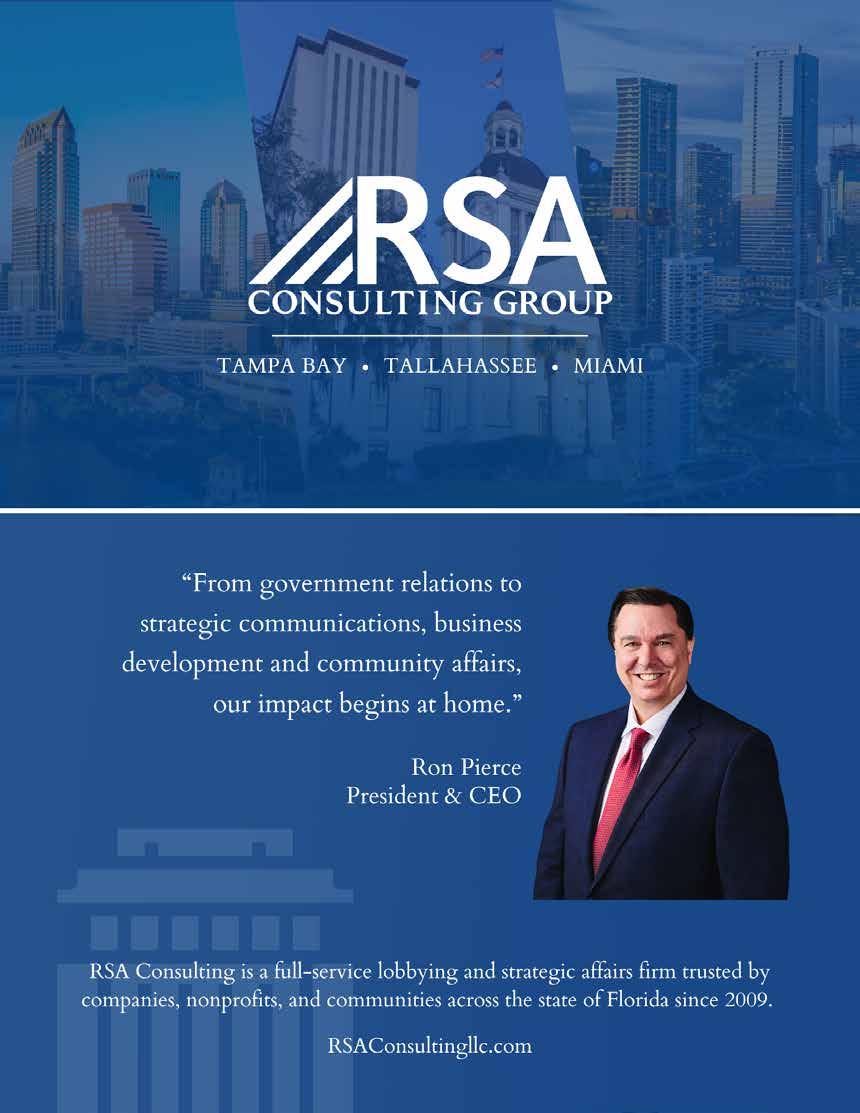

With a future-forward strategy, Tampa Electric is enhancing the grid through smarter systems and stronger infrastructure to advance the reliable service our region depends on.
• Upgraded infrastructure means fewer, shorter outages.
• Smart technology speeds restoration when damage occurs.
• Strategic, long-term planning keeps energy reliable while managing costs.
For more than 125 years, we’ve powered Tampa Bay’s growth. Toda y, we’re building on that legacy with an even stronger electric grid.
Designed to endure. Ready to respond.

See how at TampaElectric.com/SPP.
Mike Waltz, Ambassador to the United Nations, St. Augustine Beach
Ronald D. Johnson, Ambassador to Mexico, Tampa
Kevin Marino Cabrera, Ambassador to Panama, Miami-Dade
Dan Newlin, Ambassador to Colombia, Windermere
Peter Lamelas, Ambassador to Argentina, Manalapan
Duke Buchan lll, Ambassador to Morocco, Palm Beach
Benjamín León, Jr., Ambassador to Spain, Coral Gables
John Arrigo, Ambassador to Portugal, Jupiter
*Ambassadorships as of November 10, 2025.
From the U.S.-based United Nations headquarters to Malaysia, the Philippines and everywhere in between, ambassadorships from Florida-based diplomats are abundant. President Donald Trump, himself now a Florida man, has appointed fellow Floridians to posts across the nation, including Mexico, Panama, Columbia and Argentina in the Americas; Spain, Portugal, Norway, Poland, Greece and more in Europe; and even Morocco in Africa. The robust representation on the global stage is a perfect way to highlight Florida’s new-found influence at the highest echelons of power.
Michael Kavoukjian, Ambassador to Norway, Miami Beach
Tom Rose, Ambassador to Poland, Estero
Howard Brodie, Ambassador to Finland, Miami Beach
Roman Pipko, Ambassador to Estonia, Boca Raton
Sergio Gor, Ambassador to India, Riviera Beach
Stephanie Hallett, Ambassador to Bahrain, Tampa
Michel Issa, Ambassador to Lebanon, Highland Beach
Kimberly Guilfoyle, Ambassador to Greece, Jupiter
Nicole McGraw, Ambassador to Croatia, Palm Beach Gardens
Callista Gingrich, Ambassador to Switzerland and Liechtenstein, Naples
Lee Lipton, Ambassador to the Philippines, West Palm Beach
Nicholas Adams, Ambassador to Malaysia, Palm Harbor
Anjani Sinha, Ambassador to Singapore, Boca Raton
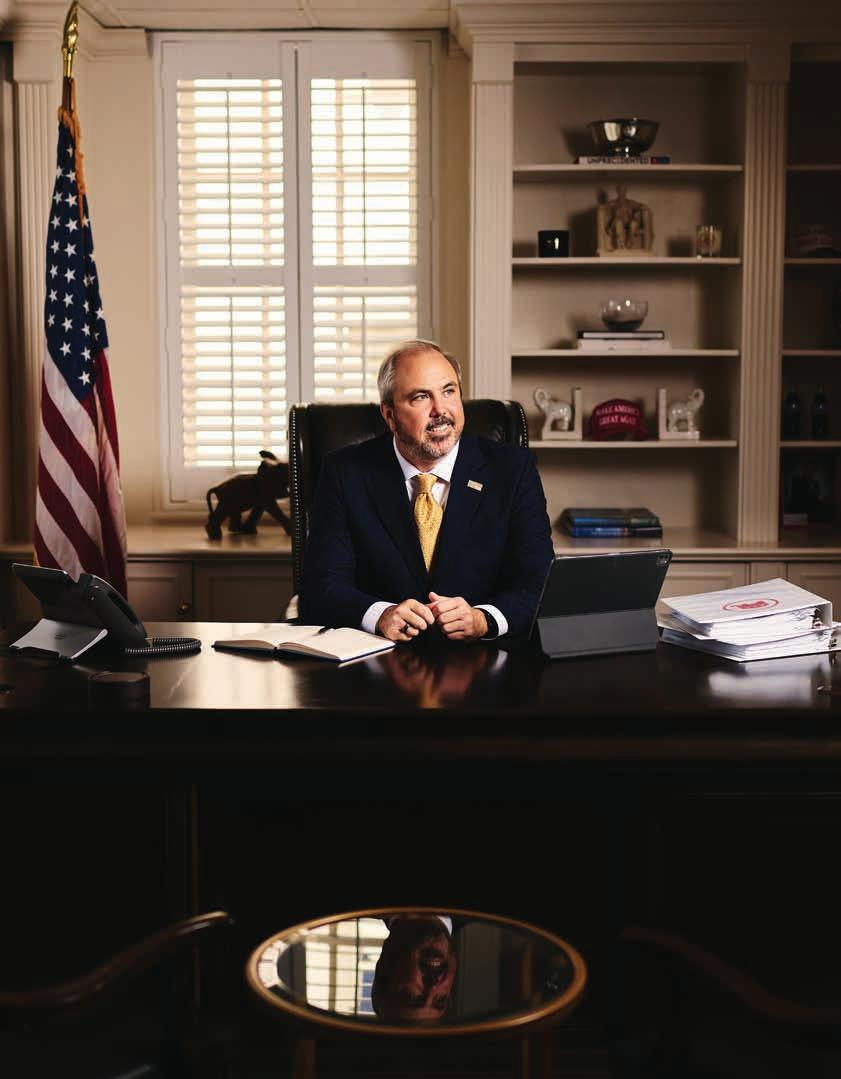
As Republicans navigate a historically treacherous Midterm cycle, Joe Gruters wants every state to run elections more like Florida.
The newly elected Republican National Committee (RNC) Chair — and sitting Florida lawmaker — lists election integrity as a top priority for the party, and says Democrats should too. The good news for other states, he says, is that his home state has worked for a quarter century building confidence in election results.
“Florida is the gold standard with elections,” the Sarasota Republican said.
It got there, he said, after the national spotlight in the 2000 election when George Bush’s victory hinged on a razor thin 537-vote margin in Florida. Afterward, the Florida Legislature set out more uniform practices for voting, recounts and tabulation. “But we still go in every few years fixing it and tightening the screws.”
Weeks after securing his role as RNC Chair, the national party stepped in to help successfully defend a Florida law in court requiring exact matches on voter registration applications to other documents like drivers’ licenses and Social Security forms.
Then, during off-year elections in Virginia and Maryland, the RNC Election Integrity Team dispatched hundreds of poll workers and attorneys in those states and others. In total, the national party responded to 478 reports of voting issues, and on top of that tracked bomb threats impacting voting at 28 locations on Election Day. The party also backed a successful lawsuit to challenge hundreds of New Jersey ballots because they lacked inner envelopes. While Democrats won Governor races in those states, Gruters said efforts to protect the validity of the vote and reinforce public trust in the process proved successful and will be critical in the long term.
“Whether it’s true or not, the people have had a distrust of the system, and in a democracy, voters need full faith and confidence,” Gruters said. “The fact Democrats don’t agree, why would they not?”
Importantly, this topic isn’t new to Gruters as party chair. After the 2020 presidential election, former RNC Chair Ronna McDaniel launched an Elec-
By Jacob Ogles
tion Integrity Committee and named Gruters to lead it. That followed President Donald Trump challenging results in multiple states won by Democrat Joe Biden. Trump most often cited concerns about mail-in votes and rules put in place during the COVID-19 pandemic. Judges, including a majority on the Supreme Court, ultimately dismissed those claims.
Importantly, Florida in 2020, with Gruters serving as Republican Party of Florida (RPOF) Chair, ended up as one of two states where Trump increased his share of the vote from his 2016 victory over Hillary Clinton. As Biden flipped most of the 2020 swing states, Florida’s electoral votes stayed red. That allowed Gruters to stay out of nasty challenges, unlike cohorts in Arizona, Georgia and Pennsylvania. But Gruters today doesn’t shy from repeating Trump’s assertion the results of that election can’t
be trusted. He says nothing like the 2020 election should ever happen again. Asked what he meant, Gruters responded directly.
“The best way to describe what happened in 2020 was, ballots went out without verification, and there is no way to determine if every ballot should have been counted. Look at what Biden got in 2020 and the number of votes Kamala Harris got in 2024, and the number received in 2016. It’s not rocket science to figure out there were a lot of extra voters, or a lot of extra votes,” Gruters said. Gruters has long said he wants voting to be easy and cheating to be hard. He also stresses a belief that only legal citizens should vote in elections, and caution should be taken so each only votes once. Undocumented immigrants already cannot legally vote, and it’s illegal for legal voters to cast more than on ballot.

Still, while Florida Republicans long embraced mail-in voting — and Gruters hasn’t embraced Trump’s push to stop that process altogether — he wants every state in the union adopting similar processes to Florida when it comes to verifying votes. He cheered that the U.S. Supreme Court this term will consider a challenge to a Mississippi law requiring the counting of mail ballots received after Election Day.
Notably, Florida accepts a limited number of military and overseas ballots received within a short timeframe after the election, but Gruters said election officials in Florida have processes for receiving those votes by fax or other types of delivery that make even that unnecessary. He said the nation must get away from vote tabulation that runs far past Election Day in places like California, where election officials allow weeks for mailed ballots to arrive.
“Do we want Election Days, or do we want it to last a month?” he asked.
Outside of the integrity push, Gruters continues to prepare the party for what history suggests will be
“We’re doing everything we possibly can to go out and recruit candidates, build the grassroots, protect the vote through election integrity efforts and raise money to be successful.”
a challenging election cycle. He frequently notes that the party that wins the White House has only twice gone on to increase its majority in the U.S. House in subsequent federal elections. That means he’s running against history in 2026, but he nevertheless intends to come out victorious.
“My lone job since being elected is to win the Midterms,” he said. “We’re doing everything we possibly can to go out and recruit candidates, build the grassroots, protect the vote through election integrity efforts and raise money to be successful.”


He crisscrosses the country weekly, attending fundraising events and meeting with party officials from other states. The job, he said, has been 24 hours a day, seven days a week since the gavel was put in his hand in August, and even in the weeks before. But he enjoys more resources at his disposal than he ever wielded as a state Chair in Florida.
“We always had decent sized staff at RPOF,” he said. “But at the RNC, they have a ten-fold increase. If we had 15 staff at RPOF, they have 150 here. And the level of professionalism and experience is through the stars at this level. It’s unmatched. It helps make my job easier. I am now in charge of winning the battles on behalf of the President and to save the country, and to do that, you have to have the best people around you.”
He feels confident the party will make more positive moves ahead of the 2026 cycle. Even as Democrats crow about winning off-year races and passing a referendum that could allow California Gov. Gavin Newsom to gerrymander a bluer map in the nation’s largest state — a response to similar gerrymandering efforts in red Texas — Gruters feels confident the rush for
mid-decade redistricting will ultimately benefit GOP candidates.
“Democrats already redistricted a lot of states. They have been gerrymandering their states for three decades,” Gruters said. “(Vice President) J.D. Vance said it best when he said we are rebalancing the scale. Although they won in California with Prop. 50, and there has been saber-rattling in Virginia and Maryland, a lot of red states were never gerrymandered, so we are being aggressive where we have to be and balancing the scales. But I think we win the Midterms regardless of what happens in redistricting.”
Notably, Florida started a redistricting process of its own, and Gruters will likely vote on a map in his home state as a sitting member of the Florida Senate. As far as that job goes, Gruters remains committed to holding onto his Senate seat at least through the end of Session in 2026, though he stepped back from many committees and plans to focus most on securing appropriations for his Sarasota district.
The job of RNC Chair simply isn’t a part-time gig— and it’s not one he takes
lightly. He knows loyalty and luck paved the road to the position. Gruters largely owes his RNC job to his relationship with Trump. That connection dates back to 2012, when the Republican Party of Sarasota County under Gruters’ leadership named Trump as “Statesman of the Year” well before his first national campaign. Gruters later endorsed Trump for President over other Florida contenders such as former Gov. Jeb Bush and thenSen. Marco Rubio, then co-chaired the Florida arm of Trump’s successful 2016 campaign alongside Susie Wiles, now Trump’s White House Chief of Staff.
In 2026, then-RNC Chair Michael Whatley announced his campaign for Senate in North Carolina, requiring him to step away from the national party. That led to Trump in May endorsing Gruters, then-RNC Treasurer, to take over. An official vote happened within weeks, but the party effectively started a transition before waiting to see if anyone else qualified. No one ever did.
But while his Trump bona fides put him in charge of the national party, Gruters will likely lead Republicans into the post-Trump era, more than a decade
after the real estate titan and reality show star famously descended a golden Trump Tower escalator to announce his candidacy in 2015. Once the Midterms conclude next year, contenders to succeed Trump will launch presidential campaigns, and the RNC under Gruters’ leadership will start debating Primary calendars, delegate selection processes and other behind-the-scenes mechanics for choosing a new nominee.
“Having a Primary is good for the system,” he said. But Gruters expects Trump will continue to wield influence well after the Midterms, and his focus remains delivering the President’s message. That ultimately is the promise American capitalism will deliver to the next generation of Americans the greatest ability to succeed, Gruters said.
“That’s in direct contrast to (New York City Mayor) Zohran Mamdani and the socialists running on the left across the country,” Gruters added. “Socialism is not right. It’s the freedom of capitalism and the light touch of the Judeo-Christian mindset that is right.”

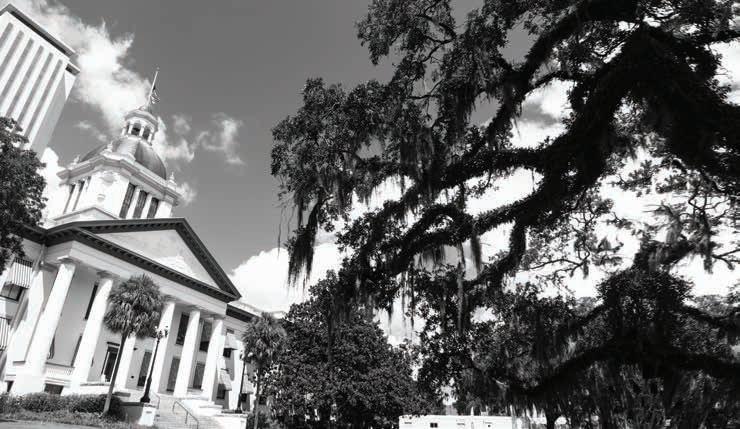

One of the state’s leading providers of quality, patient-centered care is also the leader in training the future workforce to provide that care. More residents and fellows pursue their Graduate Medical Education with HCA Florida Healthcare than any other health system in the state.
•26 teaching hospitals partnering with several major universities
•5 Galen College of Nursing campuses statewide
•24,000+ residents and fellows trained with HCA Florida Healthcare Inspiring
P I T O L H I L L .
O u r W a s h i n g t o n , D . C . , t e a m h a s b e e n e m b e d d e d i n t h e f e d e r a l l a n d s c a p e
f o r o v e r t h r e e d e c a d e s . W e d e l i v e r i n s t i t u t i o n a l k n o w l e d g e a n d d e e p - r o o t e d
r e l a t i o n s h i p s a t t h e h i g h e s t l e v e l s o f f e d e r a l g o v e r n m e n t , i n c l u d i n g c u r r e n t
a d m i n i s t r a t i o n o f f i c i a l s s h a p i n g t h e n a t i o n a l a g e n d a . O u r b i p a r t i s a n t e a m t r a n s l a t e s i n f l u e n c e i n t o o u t c o m e s f o r o u r c l i e n t s . g r a y - r o b i n s o n . c o m ∙ 2 0 2 . 7 3 0 . 7 9 2 5





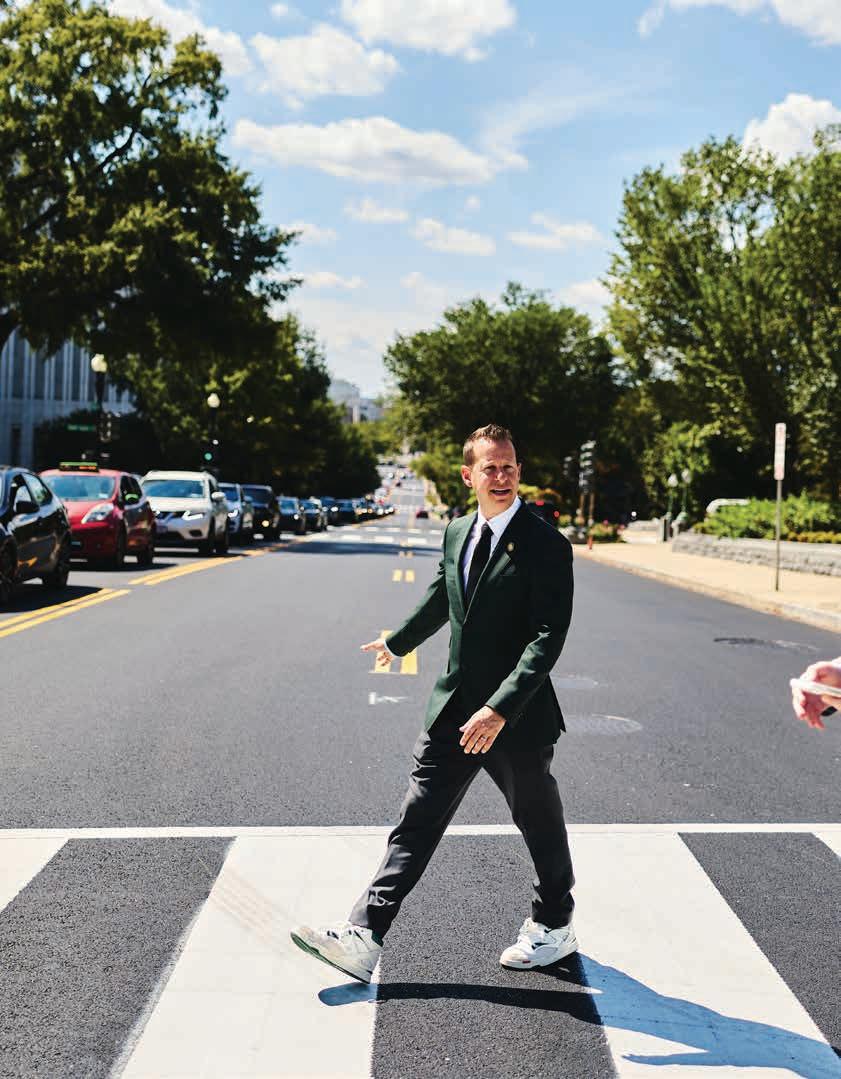
A co-founder of the Congressional Sneaker Caucus, Rep. Moskowitz is often seen wearing high top shoes, as he is here walking to the U.S. Capitol.

By Brendan Farrington

There are 435 House members and 100 Senators when all seats in Washington are filled. The vast majority of them would tell you they’re not your typical politician.
And the vast majority of them would be lying.
But not U.S. Rep. Jared Moskowitz
He’s a Democrat who displays photos of himself with Republican Gov. Ron DeSantis and Republican House Speaker Mike Johnson in his office. He was the first Democrat to join the DOGE Caucus, in part because he wants FEMA to be out from under the Department of Homeland Security’s umbrella. Moskowitz has since declared the caucus dead.
It’s not that he’s a Republican disguised as a Democrat. Far from it; his Democratic creds are solid. But he refuses to toe the party line just because. He talks to Republicans. He’s friends with them. And in an era when partisanship is at an extreme, he’s sick of the echo chambers on both sides.
“My brand has always been, walk across the aisle, be bipartisan. But that doesn’t negate that when you see your
friends doing something stupid, you don’t point it out,” Moskowitz said. “Just because you go after them sometimes doesn’t mean you shouldn’t try to work with them on other issues.”
And when he does go after someone, he does so with equal parts humor, healthy sarcasm and rational arguments.
Recently, he told the House Judiciary Committee that instead of Democrats and Republicans arguing whether a birthday letter written for pedophile Jeffrey Epstein was indeed signed by President Donald Trump, they should just bring in a signature expert.
“This document is 22 years old. So you’re telling me someone 22 years ago went back to the future and forged his signature when he was a Democrat, and somehow this person was Nostradamus (and) knew he would become a Republican and become President,” Moskowitz mused. “If it’s a forgery, we should immediately open up an investigation.”
During his remarks, he quipped that Trump “is a decent doodler, by the way.”
Moskowitz was elected to the Parkland City Commission in 2006 when he was still in law school. He won a Florida

House seat in 2012, worked as Florida’s emergency management director in 2019 – a rare Democrat appointed by DeSantis — and was elected to Congress in 2023.
During his Tallahassee days, Moskowitz was best known for shepherding through a gun safety bill in 2018 after 17 people were murdered at Marjory Stoneman Douglas High School in Parkland. The bill had the support of Republican leadership and was signed by Republican then-Gov. Rick Scott.
As he did in Tallahassee, Moskowitz is holding his own as a member of the minority party, particularly in an atmosphere far more combative than Florida’s capital, said Republican Rep. Aaron Bean
“He’s extremely reasonable,” Bean said. “He’s not scared of a debate. He’ll jump right in.”
And Moskowitz’s use of humor is a positive, Bean said.
“Humor, that’s a pretty cool tool to use. He’s someone I can always go to for a debate,” Bean said.
Moskowitz readily admits Congress is broken. Its dysfunction is part of what makes Trump a more powerful President. Older members at least remember when the body was more functional, but they’re replaced by younger members who listen to the social media echo chambers, Moskowitz said.
“Members are going to have to take on their own party,” he said, adding that Congress is becoming more of a communications tool than a body that actually solves problems.
“If you want to make sure that we don’t have a king, okay, then you have to have a functional Congress. If you don’t have a functional Congress and more power goes to the executive branch, okay, then you do have a king,” Moskowitz said.
As his own party has become less effective, Democrats have to decide whether they want power or purity. If Democrats want to be back in power, he said, the progressive wing of the party has to stop blasting Democrats who try to win in districts Trump won.
“Democrats right now have decided purity is more important. We don’t like diversification of thought right now in the party,” Moskowitz said. “We don’t like the fact that there might be Democrats that have to win in red areas that might not have the same opinion as Democrats that are in blue areas. We don’t have a big tent right now. Our tent is small.”
And while he agrees many Americans are sick of both parties, leaving them to become independent voters
doesn’t help the division because primaries will be decided by people furthest from the political center – exactly the opposite of what independents want.
“That’s a problem. That means the Primary voter is becoming more pure,” he said. “It’s a counterintuitive effect than what those independents want, but the independents have decided they’re so over the party, they can’t stomach it.”
Nevertheless, Moskowitz still manages to find fun in the job. He created the Congressional Sneaker Caucus, a
group of bipartisan members who like comfortable footwear. He also co-chairs the Congressional Dog Lovers’ Caucus.
“I don’t see a problem with being able to be friends with AOC (Anatasia Ocasio Cortez) and Anna Paulina Luna simultaneously. And I have disagreements with both of them, as they do with me,” Moskowitz said. “I think there are lots of friendships. People are just afraid to broadcast them sometimes because they don’t want to get judged.”


Florida’s Specialty Hospitals for Children are driving the future of pediatric cancer treatment and research to ensure no child has to leave Florida for world-class, specialized cancer care.
Thank you to Governor DeSantis and the Florida Legislature for your leadership in prioritizing the health and well-being of Florida’s children with a historic investment to make our state a leader in nationally ranked pediatric cancer care.




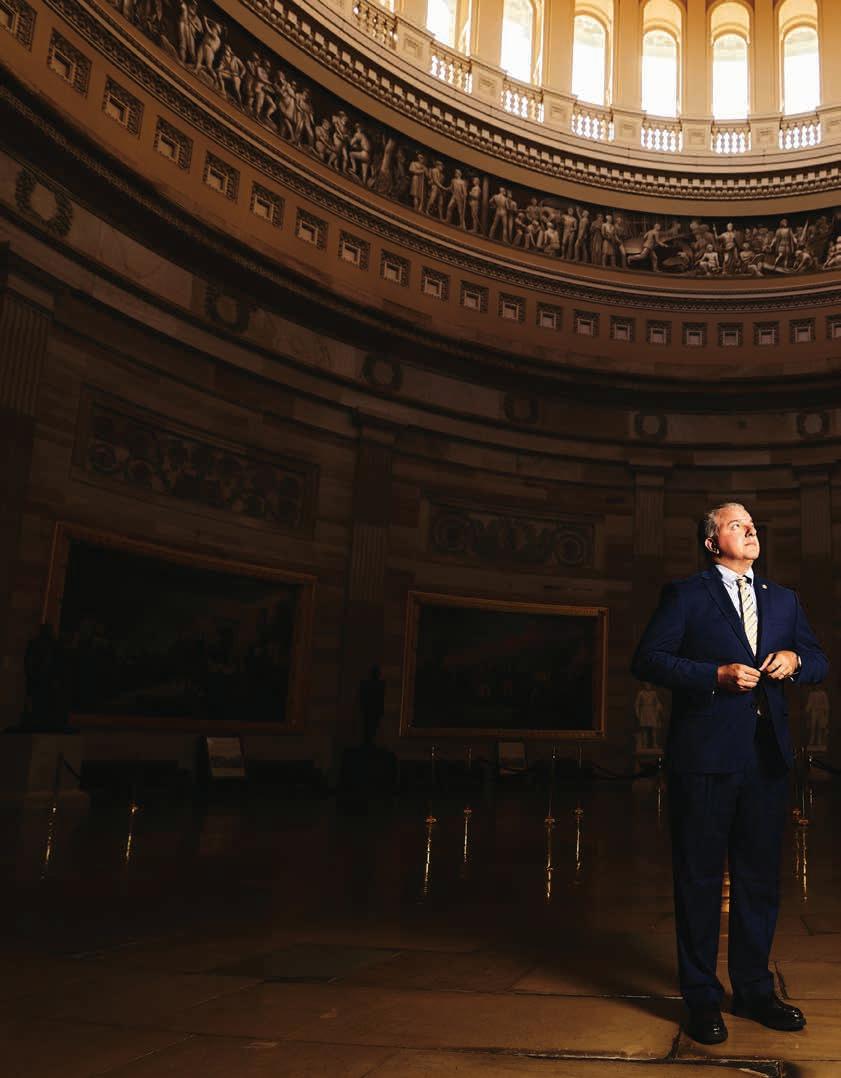
By Jacob Ogles
Following his Special Election victory on April 1, U.S. Rep. Jimmy Patronis didn’t know when he would be sworn into office, but ended up flying to Washington and reciting his oath of office in less than 24 hours. That meant the Panhandle Republican got to work immediately — without the benefit of orientation, training and workshops on how business runs in the U.S. Capitol that most colleagues in the freshman class enjoy.
“Thank God I spent eight years in the Florida Legislature, because there (were) a lot of systems that we have in the Florida legislative process that mirror the processes and protocol and way of doing business up here,” Patronis said. “I do have to admit that the Florida legislative process runs like a sewing machine, and the process up here is not quite as refined.”
The freshman member has quickly familiarized himself with the goings on of Washington. That includes developing positive relationships with leadership — arguably a significant shift from predecessor, ex-U.S. Rep. Matt Gaetz — and working to connect with lawmakers from around the country.
Incidentally, the greatest surprise for him didn’t involve massive bureaucracy or any complicated systems of governing. The biggest shock?

“It’s how nice people are,” he said. “There’s just a lot of nice public servants up here, and there’s a lot that are just true of heart that are up here for the right reasons. And you can take that all the way down to the intern level.
“It’s how nice people are,” he said. “There’s just a lot of nice public servants up here, and there’s a lot that are just true of heart that are up here for the right reasons. And you can take that all the way down to the intern level. These interns are so excited because they made a commitment to come and want to work in Washington, D.C. for the learning experience. It’s not a job they’ve got waiting tables getting through school. This is part of what they wanted to do. So that is reflected in their attitude and also their appetite for the job.”
That doesn’t mean he hasn’t run into rancor, the attribute for which Congress may be best known. During his years in the Florida House, Republicans enjoyed a solid majority. But the GOP as of this writing holds a 219-213 majority over Democrats, a narrow margin that has expanded and contracted this year as a result of deaths as often as Special Elections.
That means more partisan battles between Democrats and Republicans, but also the empowering of fringe caucuses within each party that can bring drama to The Process by withholding even just a couple votes.
Managing that terrain makes Patronis
more impressed by Speaker Mike Johnson’s “incredible patience.”
“I’ve never seen him lose his temper,” Patronis said.
As a lawmaker representing the needs of Florida’s 1st Congressional District, Patronis too must navigate the close margins, working to wrangle support from a more diverse range of lawmakers than he ever faced in Tallahassee as a state lawmaker or Cabinet member.
He’s somewhat new to his own district, too. While Patronis was based in Panama City most of his political career, the political opportunity to run for Gaetz’s vacated seat earlier this year prompted him to run in the state’s westernmost congressional district. Upon winning the election, Patronis sold his Tallahassee residence and purchased a condo in Destin. That means political opponents can’t slag Patronis, as they did in the Special Election, for living outside the district. But it also grants the lawmaker greater proximity to his own constituents.
He notes his last job required him to keep a presence in all parts of the state, and to frequently travel to every region. At least he now splits his time merely between his district and Washington.
He also credits a supportive family life for managing his hectic schedule. He and wife Katie have two teenage sons who often travel with Patronis and have for years. He says the price of lost time with family is something he always wanted to balance with the opportunity to show his children the world. He recalls earlier this Summer when his boys took a picture with President Donald Trump and First Lady Melania Trump, something he calls a priceless memory. But should the costs of work to his family ever outweigh the rewards, that’s when his time in office ends.
“If it’s no longer a family affair, then that’s not the job I need to have anymore,” he said. “I mean, Jimmy can do anything. If the job is washing dishes, as long as the family can have an opportunity with me, that’s what we’re going to do.”
In his time in CD 1, Patronis has quickly picked up on the military needs of his district. The Panhandle lawmaker says his top priority in Congress now involves bolstering resources and facilities for the many individuals whose livelihood remains tied to military bases. The good news in D.C., Patronis said, is many of his colleagues in the halls of Congress
hold their own emotional connection to the installations.
“What I’ve come to discover is there’s all these members of Congress that either trained at NAS (Naval Air Station) Pensacola or Eglin (Air Force Base) or Hurlburt Field or at Tyndall Air Force Base or NSA (Naval Support Activity) Panama City or Duke Field,” Patronis said. “So they have got some chapter of their life where they spent it in Northwest Florida. In a lot of cases, their kids were born in Northwest Florida hospitals, so they’re always going to have this connection to CD 1.”
That proved beneficial when Patronis sought support for funding to rebuild hangars at NAS Pensacola that were severely damaged by Hurricane Sally in 2020. He spoke to several Texas lawmakers on appropriations committees who trained at the base and understood the need to maintain its infrastructure.
A background as a state legislator and Cabinet member helps in the relationship-building business, but Patronis also cites his 30 years in the restaurant business as an important part of his political background.
His family has run Capt. Anderson’s Restaurant & Waterfront more than a half a century. Patronis’ father and uncle purchased the business in 1967 and the Congressman became a partner before he ever held public office. That hospitality work first taught him how to speak with a broad range of people about their lives, and it’s where he learned lessons on how to feed wants and address needs.
“Everybody’s a customer. If you don’t take care of the customer, somebody else will. But I’ll also remind people, some people shouldn’t go out to eat,” he says.
“I mean, there’s just certain people that, if you are spending your time trying to please this customer, it’s a waste of your energy. You are neglecting other customers that would appreciate the extra attention, but you get this black hole of a customer that really just needs to go find somewhere else to go take their family. So there’s some members up here that you can’t — they’re just challenging to communicate with. You’ve gotta change your language. But you know, I’ve dealt with tough customers over the while. It really takes a lot for me to throw a customer out of the restaurant, but I’ve done it.”


A longtime firestarter in Florida politics, Loomer now has a national platform, and the President’s ear.
Florida Politics reporter Jacob Ogles interviewed conservative activist and opposition researcher Laura Loomer for our “What I’ve Learned” feature, outlining how Loomer went from interested college student, to one of few people who have the President’s ear.
While we understand that Loomer, to some, is a polarizing figure, because she has influence at the highest levels of power in federal government, it’s worth hearing her explain how she got to where she is, what she thinks about modern politics in the age of Trump, and what we might expect from her and others in the Trump orbit in the future.
This interview is a direct transcription of Loomer’s conversation, edited only for length, grammar and clarity. Claims contained in this interview are Loomer’s and have not been fact checked or independently verified. The information contained in this transcript are Loomer’s, and Extensive Media Enterprise’s publication of her interview does not represent an endorsement of views.
I always had a big interest in Republican politics. When I was in college, I was the President of the College Republicans, majoring in broadcast journalism and political science at Barry University in Miami.
At the same time, I was also working full time at the Fox affiliate. I would spend my time as a college student trying to register people to vote and trying to assist with campaigns in the area.
Ultimately, I ended up meeting James O’Keefe of Project Veritas toward the beginning of my senior year. Long story short, I ended up doing an investigation with O’Keefe into my own university, which prompted me to get kicked out of college a month before graduation, even though I was set to be valedictorian.
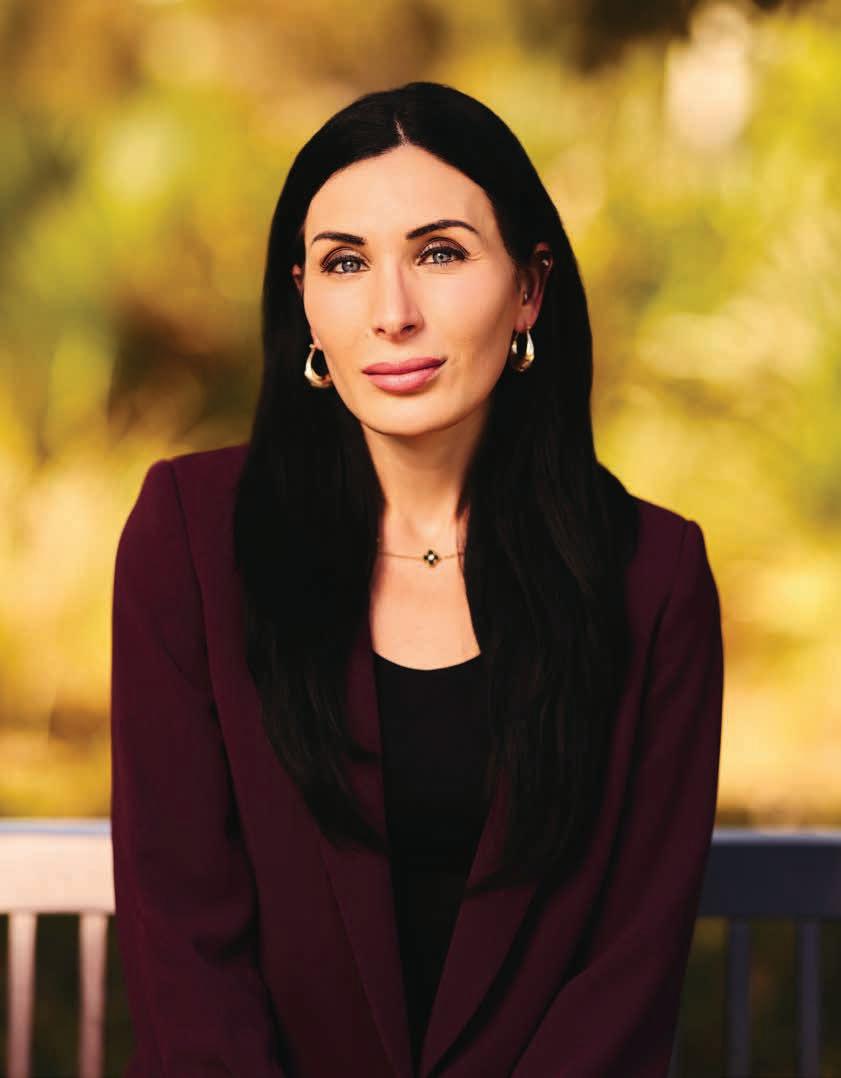
“I definitely learned a lot about the radical left and Democrat networks and how they operate behind the scenes when nobody has the cameras on, or they think nobody has the cameras on.”
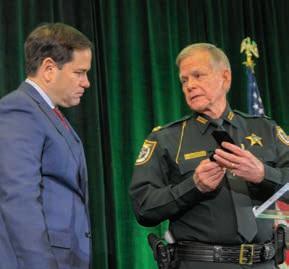

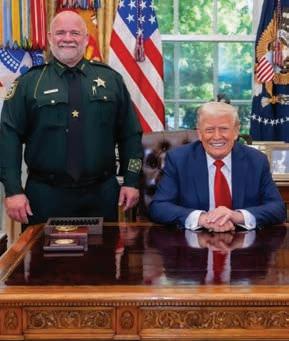
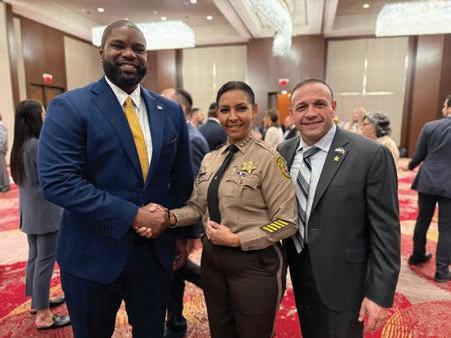
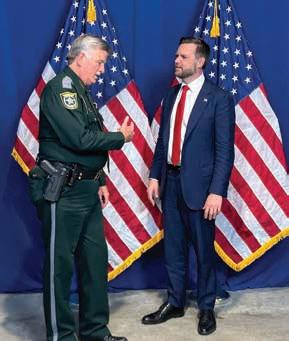

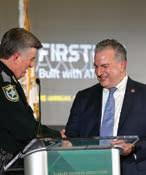


“I thought everything should be about merit in this country.”
I ended up moving to New York for several years, and started working full time for O’Keefe, undercover in the Hillary Clinton campaign, exposing voter fraud — really all types of corruption. I started working for him at the very beginning of Clinton’s campaign, and immediately went undercover for her first campaign event.
I worked undercover for three and a half years, the entire 2015-2016 election. I definitely learned a lot about the radical left and Democrat networks and how they operate behind the scenes when nobody has the cameras on, or they think nobody has the cameras on. Also, I just learned how to perfect the undercover reporting. I ended up going independent. I left Project Veritas, of course, on good terms — James is a very close friend of mine — and I started my own media company.
I started to go viral for several videos I made. One put me in the spotlight overnight. I got arrested for protesting a Shakespeare in the Park “Julius Caesar” rendition by the radical left in which they were trying to mimic the assassination of President Trump.
Then I invented Loomering, where I would go around and confront high-pro-
file Democrats during their book tours or political speeches, and I would livestream it on Periscope.
I started to travel the country ahead of the Midterm Elections in 2018, exposing jihadi candidates running for office. Ultimately, I was permanently banned on every single social media platform as a result of my investigative reporting. That was hard, because for several years, I was completely silenced online. I had no way to use my voice, no way to use a platform, because it was taken from me.
I ran for Congress in 2020. President Trump voted for me and endorsed me when I was the first de-platformed candidate in U.S. history. Everybody said I had no chance of winning, but I ended up beating everybody in a seven-way Primary, and I raised several millions of dollars.
But it’s very difficult to win an election when you’re totally silenced on social media, especially during COVID when everything was locked down, and especially in this day and age when everybody is consuming all their content on social media.
I felt very depressed in the aftermath of my 2022 campaign, because I worked extremely hard. There was a lot of suspicious activity on election night at the
Orange County Supervisor of Elections Office, when the machines went down, and the difference in votes between me and U.S. Rep. Daniel Webster was only a couple thousand votes.
I thought everything should be about merit in this country. I was out-working Webster, who didn’t show up for work. He wore a Life Alert. He was too sick to show up to vote. He didn’t support the President during the second impeachment. Honestly, running for office both times taught me that hard work doesn’t mean anything in this country. We’re told that if you work hard enough, you can accomplish and you can reach your American dream. But no, if you work hard, people are going to resent you.
Have you ever smelled something really bad or gotten food poisoning? If so, you probably remember what you had the night you got food poisoning. Then you have, like, a psychological kind of aversion to the type of food you ate. I had food poisoning in high school once, after eating fajitas, and I was up all night long, vomiting. To this day I cannot eat fajitas, That’s how I feel about running for office.
Everything started to change in the aftermath of my 2022 campaign, because

I was one of the few people in Florida at the time who was very critical of Ron DeSantis. I said I wasn’t going to vote for him in 2022. It’s not that I said I was going to vote Democrat, but I already knew what he was up to. He was planning on running for President in 2024 and launching a Primary in 2023 against President Trump.
I was actually talking about it on the campaign trail when I was running so immediately after election night in 2022, I started talking about how DeSantis was going to betray Trump. A lot of people said I was crazy, that it was never going to happen. But shortly after, DeSantis did a book tour, which was really a soft launch of his presidential campaign.
I was the first person to really call it out. I organized a rally, not a protest, in front of the Books-A-million store during his tour in support of President Trump. I thought, “he’s probably going to try to get everybody shut down,” and that’s exactly what he did. He tried calling the police, and that went viral. President Trump ended up seeing the video, and late that night, I got a phone call from an unknown number that happened to be President Trump telling me “I can’t believe what DeSanctimonious did. I think you’re amazing. I want to meet you. Come to Mar-a-Lago.”
President Trump told me, when I had my meeting with him at Mar-a-Lago, “Kevin McCarthy gave me a fake poll that said that you were 25 points behind in The Villages.” I actually won Sumter County, and everybody who has ever run for office there knows if you win Sumter County, you win the election.
It was very weird that I wasn’t the so-called winner of the election, and the President told me that McCarthy and the Congressional Leadership Fund gave him fake information about my race. He was pissed off on election night, because he saw how close it was, and he realized that if he had endorsed me, I would have won by 20 points. Then he said that if I wanted to run again, he would endorse me.
President Trump said if I ran against Webster again, or if I ran against Kat Cammack, he would have endorsed me. I think things have now changed between him and Cammack. But it’s a true story. I was in the room. It was me and President Trump and Susie Wiles in the room at Mar-a-Lago. I’ve never given those details out before.
But I said, “No, I’d rather help you and dedicate my time to helping you get into office.” When I said that, and when he started probing my knowledge on issues, he looked at Wiles and said, “Wow,
this girl is a genius. We have to hire her. Let’s hire her immediately.”
Everybody walks into President Trump’s office and they ask him about what he can do for them. Can you endorse this person? Can you sign this? Can you promote this book? Blah, blah, blah. Everything is about what President Trump can do for you. I think I was one of the first people to go to him and not ask him for anything, to ask what I could do for him. To this day, I’ve never asked the President for a favor. People exploit their friendship or their relationship or their proximity to the President.
March 2023 is when I really started to have more of a relationship with the Trump campaign. That was when the President hired me. We all know what happened next, how it ended up getting leaked to the media. That was very upsetting, because I had already submitted my paperwork and was told I was starting on April 1. I did not.
The President got indicted on March 30. I was thinking maybe it was just because he got indicted, and everybody
was busy, so I hadn’t heard from anybody. I decided to be patient and not nag anybody on the campaign. They probably had bigger issues going on than wondering if Laura Loomer has everything she needs and is ready to start working. So I waited.
Then on April 7, I got a phone call early in the morning from Jonathan Swan from the New York Times. He’s like, “We’re doing a story, we’re publishing it today, about how President Trump hired you.” I couldn’t really confirm or deny. I thought someone was trying to set me up so I would lose my job, because I signed an NDA that said I wasn’t allowed to talk about it. So I just said, “Well, it’s a shame that people are leaking.” Long story short, the campaign said by the end of the day, actually through Maggie Haberman of the New York Times, that Laura Loomer isn’t working with us.
I didn’t get a courtesy call. Nobody called me. It was just very bizarre. One minute, I was at the campaign office headquarters, signing paperwork, and in
“I learned that persistence will always beat the resistance. No matter how much people resist you or they smear you, or they tell you can’t do something, if you are persistent, you will break through.
Mar-a-Lago having a conversation with President Trump. Then the next minute, some unnamed source from the Trump administration, who was being quoted as a campaign advisor, was telling Maggie Haberman that Laura Loomer is not going to be joining the campaign. President Trump hired me in his office. He seemed very eager about me working for him. It was probably one of the most upsetting things I’ve ever had to experience.
I was very upset for a while. I felt very discouraged for about a month or so after that. I guess I just learned that I have to take it on the chin, because I support President Trump. What was I going to do, not support him anymore because his staff decided to go rogue and plant the story about me?
But I also realized, “wow, you really can’t trust anybody.” I became very weary even of people who worked for the President. I wasn’t weary of the President himself, but I became very skeptical of people who worked for the President. I always had positive interactions with everybody who had worked for him. That meant somebody who smiled to my face put the knife in my back, and I just became a little bit more skeptical of some of the people who work for him.
I got to see how treacherous it was. They don’t care about President Trump. They didn’t care about the voters. They didn’t even care about the messages they were preaching.
I also learned about professional jealousy. I’m more than qualified to work for the President of the United States. That’s not the issue at all. The issue was that people were professionally jealous of me and didn’t want me to succeed. That’s something you have to accept working in politics. It’s not always the case that the most qualified people get hired for a position.
Oftentimes, it’s people getting hired because they knife somebody else, or because they call in favors. That transcends politics. Life’s not fair. But I still remain loyal, even though the President didn’t endorse me in 2022 when I ran for Congress against Webster.
I know his staff ended up undermining me, not just once or twice, but four times. I’ve been hired by President Trump four times now to go work for him, and every single time the staff has
undermined my ability to get the job. I still haven’t been granted a press pass.
I still have a friendship with the President, and he calls me every so often, and he’ll ask me my opinion on certain things. Occasionally, I get invited to meetings at the Oval Office. A lot of people who work for him defy his orders. He’s already said to hire me multiple times, but obviously, I’m not there.
The President can see that I’m not there. There are other things to worry about besides my own professional aspirations. There are three more years, right? Maybe, just maybe, I’ll get a chance to work for President Trump, which is a goal of mine. He’s the most impactful U.S. President in modern times, if not in the entirety of U.S. history. You could say he’s an inspirational figure, a once-in-a-lifetime, generational leader in the sense that he completely transformed our political landscape and how we view politics today, how candidates and voters interact with each other. I gave him a copy of my book, and I literally inscribed it to “My hero. President Trump.” He is the person who inspired me to never give up.
There are going to be people who are jealous of you, and there are going to be people who lie. Oftentimes, it’s the people who lie who get ahead. They lied to undermine me from getting a job with President Trump. They lied to President Trump without my polling numbers so that he wouldn’t endorse me. It taught me my enemy isn’t just the radical left, but my enemy is also the establishment.
President Trump had the greatest political comeback in U.S. history, and we were able to defeat the weaponization of governments under Joe Biden and Kamala Harris. It’s really great to see a renewed focus on border security and cracking down on illegal immigration.
I learned that persistence will always beat the resistance. No matter how much people resist you or they smear you, or they tell you can’t do something, if you are persistent, you will break through. I always persist. I never allowed the detractors to tell me, “oh, you can’t win a Primary, you can’t raise money, you can’t do this.” I just kept on going and proved a lot of people wrong.
I mean, still, I didn’t get everything
that I wanted out of my life thus far. But I think that from where I was several years ago, it’s been a pretty incredible transformation and a testament to what can happen if you never give up.
When I look at what I wanted when I was 18 years old, graduating high school and going to college, compared to what I want now, I think how naive I was. Like, I’m a major in broadcast journalism, and I’m gonna have bleach blonde hair, and I’m gonna be one of these Fox news correspondents, and then I’ll be working in the White House. That’s what I told myself when I was the President of College Republicans. Now, I have jet black hair, I hate Fox News and I’m definitely not going to be working there because I’m on the Fox News blacklist. But I did find myself in the White House.
Success is subjective, right? A lot of people would think I’m successful because I’m a household name. A lot of people think I was successful because the President knows me on a first name basis. I own my own media company. I’m a published author. But you’re always going to be either hyper-successful or not successful enough, or a failure in the eyes of others, depending on who you’re asking. It’s really important you tune out the noise and don’t listen to other people, because there’s always going to be people that want to say that you’ve accomplished nothing in your life. Then there’s going to be other people who find you to be incredibly inspirational and find you to be highly accomplished.
I’m focused on utilizing my talents. I’ve come to kind of accept the fact that I’m always going to be the outsider. I may not necessarily ever find myself working in the administration or working on the inside of any campaign, but it doesn’t mean I can’t utilize my talents and my skills as an opposition researcher and as an effective communicator to have an impact from the outside.
President Trump taught us about the importance of the power of the outside, the power that one voice can have when you decide to kind of forge your own path and never give up, or as he told us in Butler, when you ‘fight, fight, fight.’ That’s what I do, I just keep on fighting, and I never give up.


Greenberg Traurig combines decades of experience working with clients in the Sunshine State and the Nation’s Capital. Our global firm traces its roots to our founding in Florida nearly 60 years ago. Today our Government Law & Policy Practice includes a team of more than 100 lawyers and government relations professionals in Washington D.C. , state capitals and key cities across the country. We help clients navigate a variety of complex legal, business and policy challenges before the U.S. Congress, the Executive branch, as well as state and local governments.
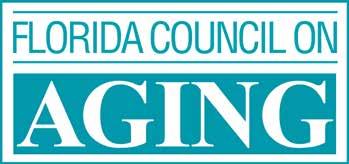

Florida Caregiver
What is the Older Americans Act and what does it do?
Florida Council on
The Act supports 5 core areas: caregiver support; nutrition; health and wellness; transportation; job training; and elder rights through an extensive network of non-profit and government agencies all over the United States.
Florida Caregiver
Why should I care about the Older Americans Act?
By 2030, 20% of the American population will be 65 years or older. The Act can prevent or delay the need for more expensive long term care or avoidable health care costs in the Medicare and Medicaid programs Florida Council on Aging
How do I inquire about help for my family?

We hope you aren’t tired of sunshine, because Florida averages about 230 to 250 days of sunshine per year, making sunglasses less of an accessory and more of a survival tool.
Jacksonville was known as “America’s First Hollywood” for being the spot for silent films in the early 1900s. Jacksonville’s warm weather, vast scenery, and easy rail access made it perfect for filming.
Florida is the Orange state, but did you know that another iconic fruit calls Florida home? Strawberries! Plant City is known as the Winter Strawberry Capital. There is even a high school named Strawberry Crest High School paying homage to the local strawberry history.
There is a festival for everything, including worm grunting. Yep, in Sopchoppy, you can watch people coax worms out of the ground by rubbing sticks together at the annual Worm Grunting Festival!
Wakulla Springs gushes out 300 million gallons of fresh water every single day.
Florida’s state play is Cross and Sword by Paul Green, which tells the story of Spanish colonization of St. Augustine, the oldest city in the United States.
The Canaveral National Seashore is the longest string of undeveloped beaches, 24 miles of pure sand and waves.
Gulf County is the only county in Florida that splits between Eastern and Central Time Zones.
Why live on a peninsula when you could live on an island? Florida makes that a reality by having over 4,500 islands, with 1,700 of them making up the Florida Keys.
The world’s smallest post office is located in Ochopee, FL. It’s been in operation since 1953 The building might be small, but don’t worry, they can still mail out large packages!
Not an April Fools joke: Winter Haven, FL holds the Guinness World Record for the largest Easter Egg Hunt at the Cypress Gardens Adventure Park on April 1, 2007.
While no longer enforced, it is still illegal to fall asleep under a hairdryer in Florida.






